Factors Affecting Staff Motivation across the British Hotel Sector: A Study on Crown Hotel
VerifiedAdded on 2023/06/03
|62
|14909
|193
AI Summary
This research investigates factors and level of motivation for staffs working in small UK hotels, with a focus on Crown Hotel. The intention is to find out the actions needed to be undertaken by the managers of this hotel for motivating their staffs to work to their full potential. The motivation of the employees has positive relation with the productivity of the organisations, especially in the hotels under the hospitality industry where the frontline employees and staffs have the most amount of direct communication with the customers.
Contribute Materials
Your contribution can guide someone’s learning journey. Share your
documents today.
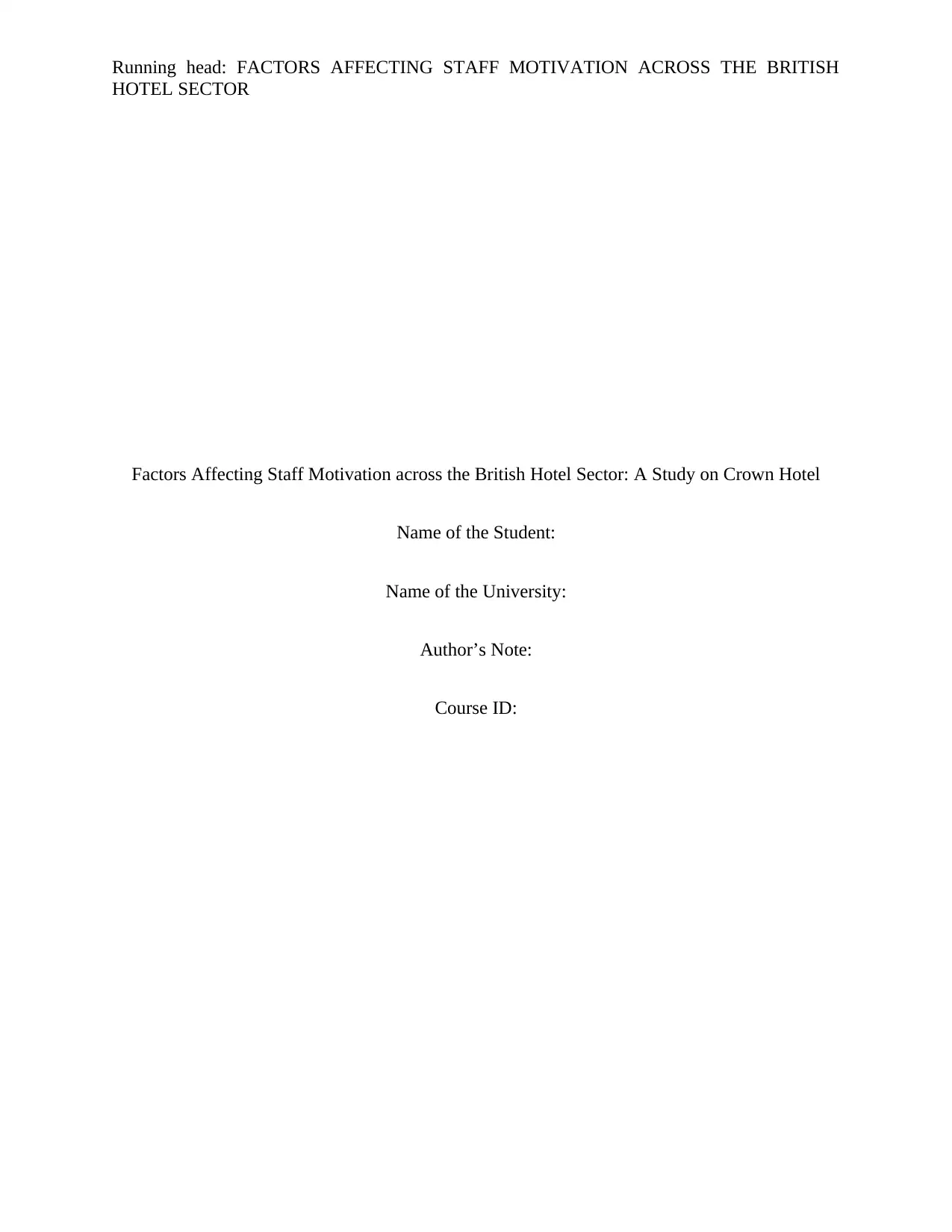
Running head: FACTORS AFFECTING STAFF MOTIVATION ACROSS THE BRITISH
HOTEL SECTOR
Factors Affecting Staff Motivation across the British Hotel Sector: A Study on Crown Hotel
Name of the Student:
Name of the University:
Author’s Note:
Course ID:
HOTEL SECTOR
Factors Affecting Staff Motivation across the British Hotel Sector: A Study on Crown Hotel
Name of the Student:
Name of the University:
Author’s Note:
Course ID:
Secure Best Marks with AI Grader
Need help grading? Try our AI Grader for instant feedback on your assignments.
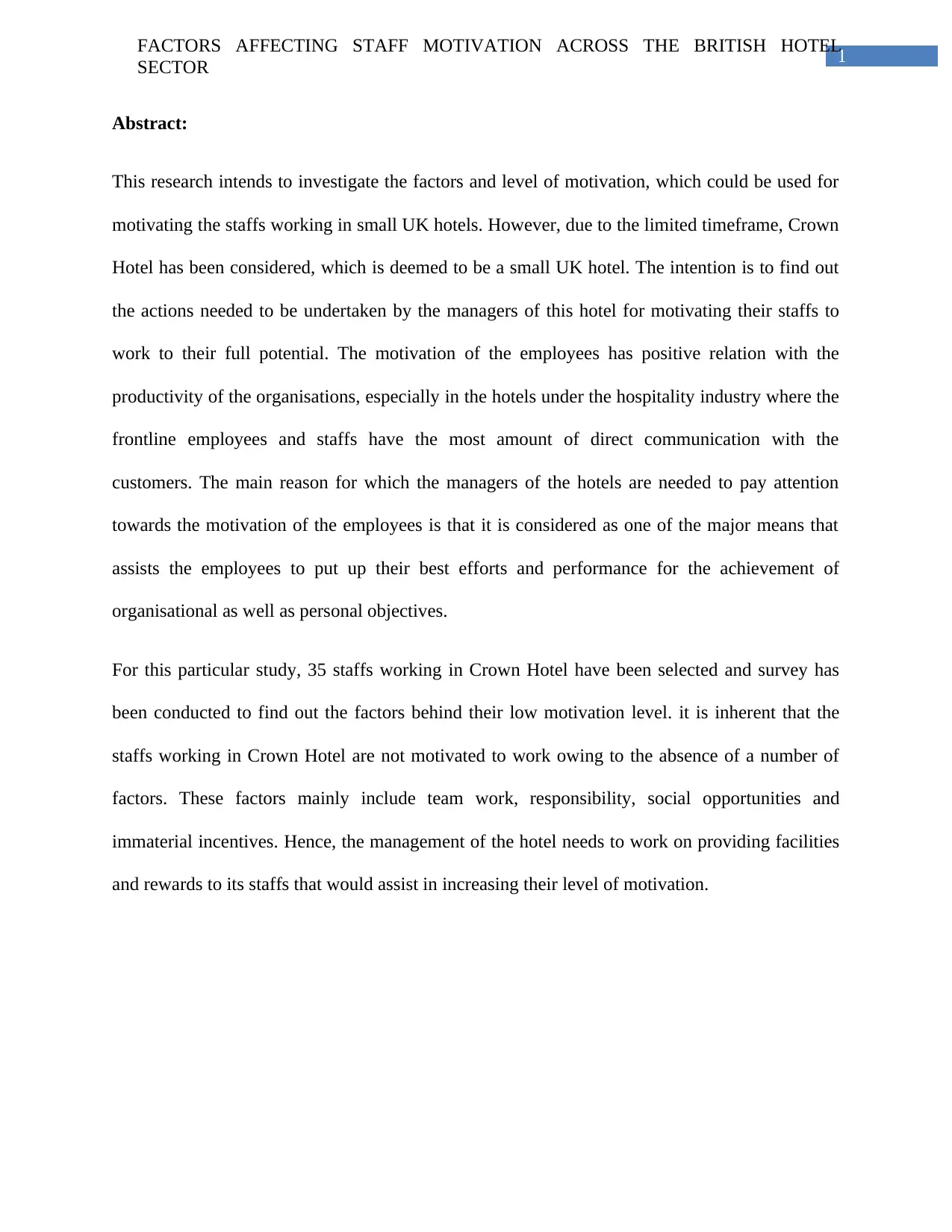
1
FACTORS AFFECTING STAFF MOTIVATION ACROSS THE BRITISH HOTEL
SECTOR
Abstract:
This research intends to investigate the factors and level of motivation, which could be used for
motivating the staffs working in small UK hotels. However, due to the limited timeframe, Crown
Hotel has been considered, which is deemed to be a small UK hotel. The intention is to find out
the actions needed to be undertaken by the managers of this hotel for motivating their staffs to
work to their full potential. The motivation of the employees has positive relation with the
productivity of the organisations, especially in the hotels under the hospitality industry where the
frontline employees and staffs have the most amount of direct communication with the
customers. The main reason for which the managers of the hotels are needed to pay attention
towards the motivation of the employees is that it is considered as one of the major means that
assists the employees to put up their best efforts and performance for the achievement of
organisational as well as personal objectives.
For this particular study, 35 staffs working in Crown Hotel have been selected and survey has
been conducted to find out the factors behind their low motivation level. it is inherent that the
staffs working in Crown Hotel are not motivated to work owing to the absence of a number of
factors. These factors mainly include team work, responsibility, social opportunities and
immaterial incentives. Hence, the management of the hotel needs to work on providing facilities
and rewards to its staffs that would assist in increasing their level of motivation.
FACTORS AFFECTING STAFF MOTIVATION ACROSS THE BRITISH HOTEL
SECTOR
Abstract:
This research intends to investigate the factors and level of motivation, which could be used for
motivating the staffs working in small UK hotels. However, due to the limited timeframe, Crown
Hotel has been considered, which is deemed to be a small UK hotel. The intention is to find out
the actions needed to be undertaken by the managers of this hotel for motivating their staffs to
work to their full potential. The motivation of the employees has positive relation with the
productivity of the organisations, especially in the hotels under the hospitality industry where the
frontline employees and staffs have the most amount of direct communication with the
customers. The main reason for which the managers of the hotels are needed to pay attention
towards the motivation of the employees is that it is considered as one of the major means that
assists the employees to put up their best efforts and performance for the achievement of
organisational as well as personal objectives.
For this particular study, 35 staffs working in Crown Hotel have been selected and survey has
been conducted to find out the factors behind their low motivation level. it is inherent that the
staffs working in Crown Hotel are not motivated to work owing to the absence of a number of
factors. These factors mainly include team work, responsibility, social opportunities and
immaterial incentives. Hence, the management of the hotel needs to work on providing facilities
and rewards to its staffs that would assist in increasing their level of motivation.
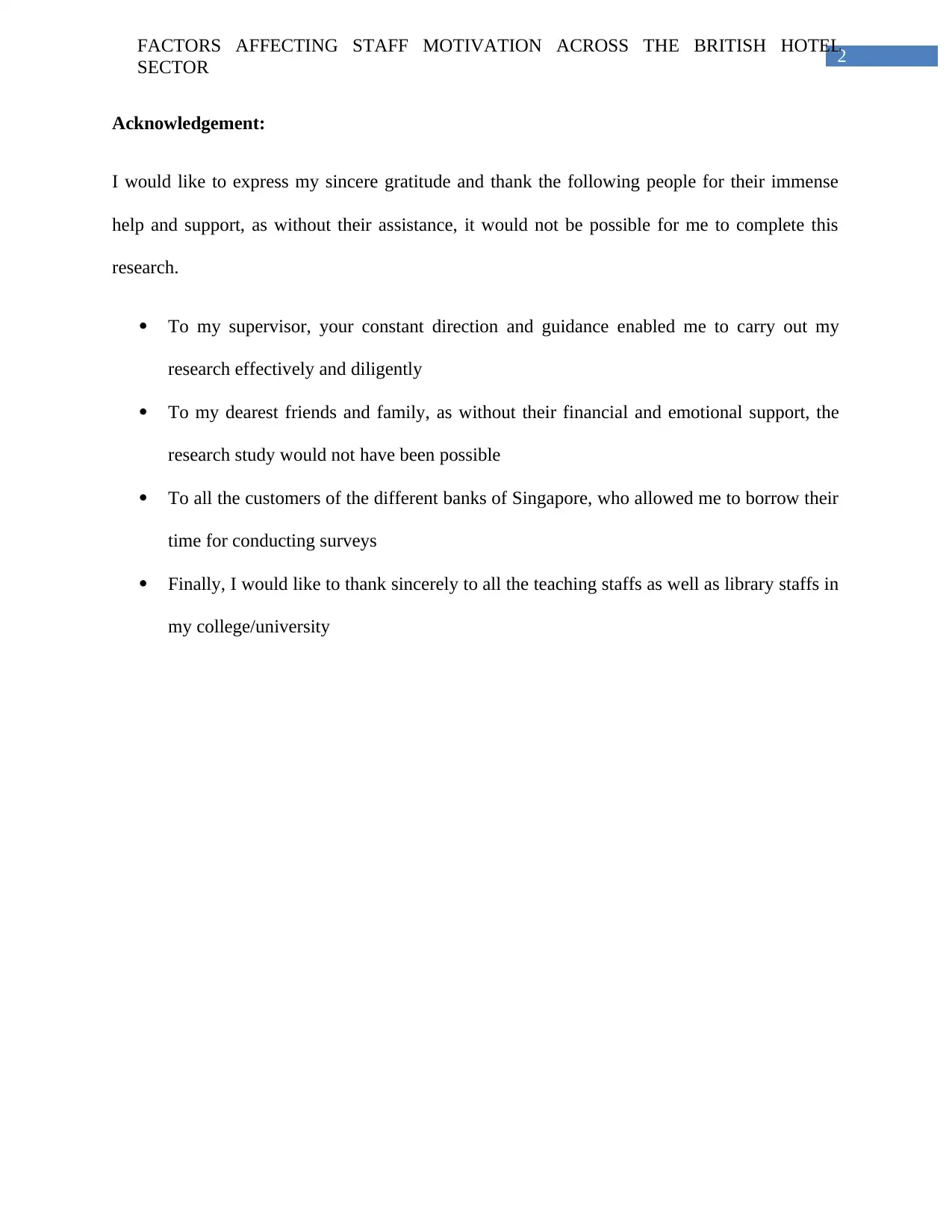
2
FACTORS AFFECTING STAFF MOTIVATION ACROSS THE BRITISH HOTEL
SECTOR
Acknowledgement:
I would like to express my sincere gratitude and thank the following people for their immense
help and support, as without their assistance, it would not be possible for me to complete this
research.
To my supervisor, your constant direction and guidance enabled me to carry out my
research effectively and diligently
To my dearest friends and family, as without their financial and emotional support, the
research study would not have been possible
To all the customers of the different banks of Singapore, who allowed me to borrow their
time for conducting surveys
Finally, I would like to thank sincerely to all the teaching staffs as well as library staffs in
my college/university
FACTORS AFFECTING STAFF MOTIVATION ACROSS THE BRITISH HOTEL
SECTOR
Acknowledgement:
I would like to express my sincere gratitude and thank the following people for their immense
help and support, as without their assistance, it would not be possible for me to complete this
research.
To my supervisor, your constant direction and guidance enabled me to carry out my
research effectively and diligently
To my dearest friends and family, as without their financial and emotional support, the
research study would not have been possible
To all the customers of the different banks of Singapore, who allowed me to borrow their
time for conducting surveys
Finally, I would like to thank sincerely to all the teaching staffs as well as library staffs in
my college/university
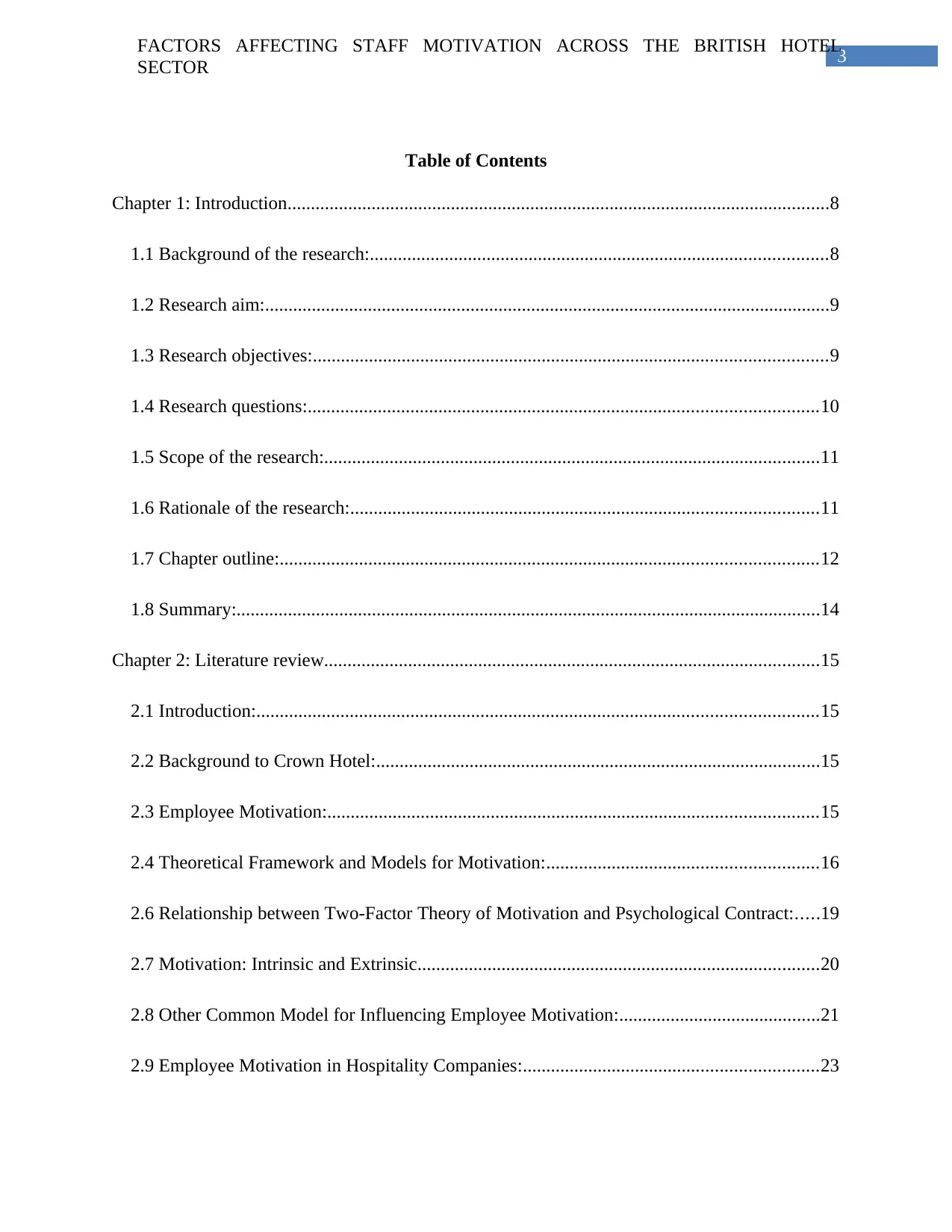
3
FACTORS AFFECTING STAFF MOTIVATION ACROSS THE BRITISH HOTEL
SECTOR
Table of Contents
Chapter 1: Introduction....................................................................................................................8
1.1 Background of the research:..................................................................................................8
1.2 Research aim:.........................................................................................................................9
1.3 Research objectives:..............................................................................................................9
1.4 Research questions:.............................................................................................................10
1.5 Scope of the research:..........................................................................................................11
1.6 Rationale of the research:....................................................................................................11
1.7 Chapter outline:...................................................................................................................12
1.8 Summary:.............................................................................................................................14
Chapter 2: Literature review..........................................................................................................15
2.1 Introduction:........................................................................................................................15
2.2 Background to Crown Hotel:...............................................................................................15
2.3 Employee Motivation:.........................................................................................................15
2.4 Theoretical Framework and Models for Motivation:..........................................................16
2.6 Relationship between Two-Factor Theory of Motivation and Psychological Contract:.....19
2.7 Motivation: Intrinsic and Extrinsic......................................................................................20
2.8 Other Common Model for Influencing Employee Motivation:...........................................21
2.9 Employee Motivation in Hospitality Companies:...............................................................23
FACTORS AFFECTING STAFF MOTIVATION ACROSS THE BRITISH HOTEL
SECTOR
Table of Contents
Chapter 1: Introduction....................................................................................................................8
1.1 Background of the research:..................................................................................................8
1.2 Research aim:.........................................................................................................................9
1.3 Research objectives:..............................................................................................................9
1.4 Research questions:.............................................................................................................10
1.5 Scope of the research:..........................................................................................................11
1.6 Rationale of the research:....................................................................................................11
1.7 Chapter outline:...................................................................................................................12
1.8 Summary:.............................................................................................................................14
Chapter 2: Literature review..........................................................................................................15
2.1 Introduction:........................................................................................................................15
2.2 Background to Crown Hotel:...............................................................................................15
2.3 Employee Motivation:.........................................................................................................15
2.4 Theoretical Framework and Models for Motivation:..........................................................16
2.6 Relationship between Two-Factor Theory of Motivation and Psychological Contract:.....19
2.7 Motivation: Intrinsic and Extrinsic......................................................................................20
2.8 Other Common Model for Influencing Employee Motivation:...........................................21
2.9 Employee Motivation in Hospitality Companies:...............................................................23
Secure Best Marks with AI Grader
Need help grading? Try our AI Grader for instant feedback on your assignments.
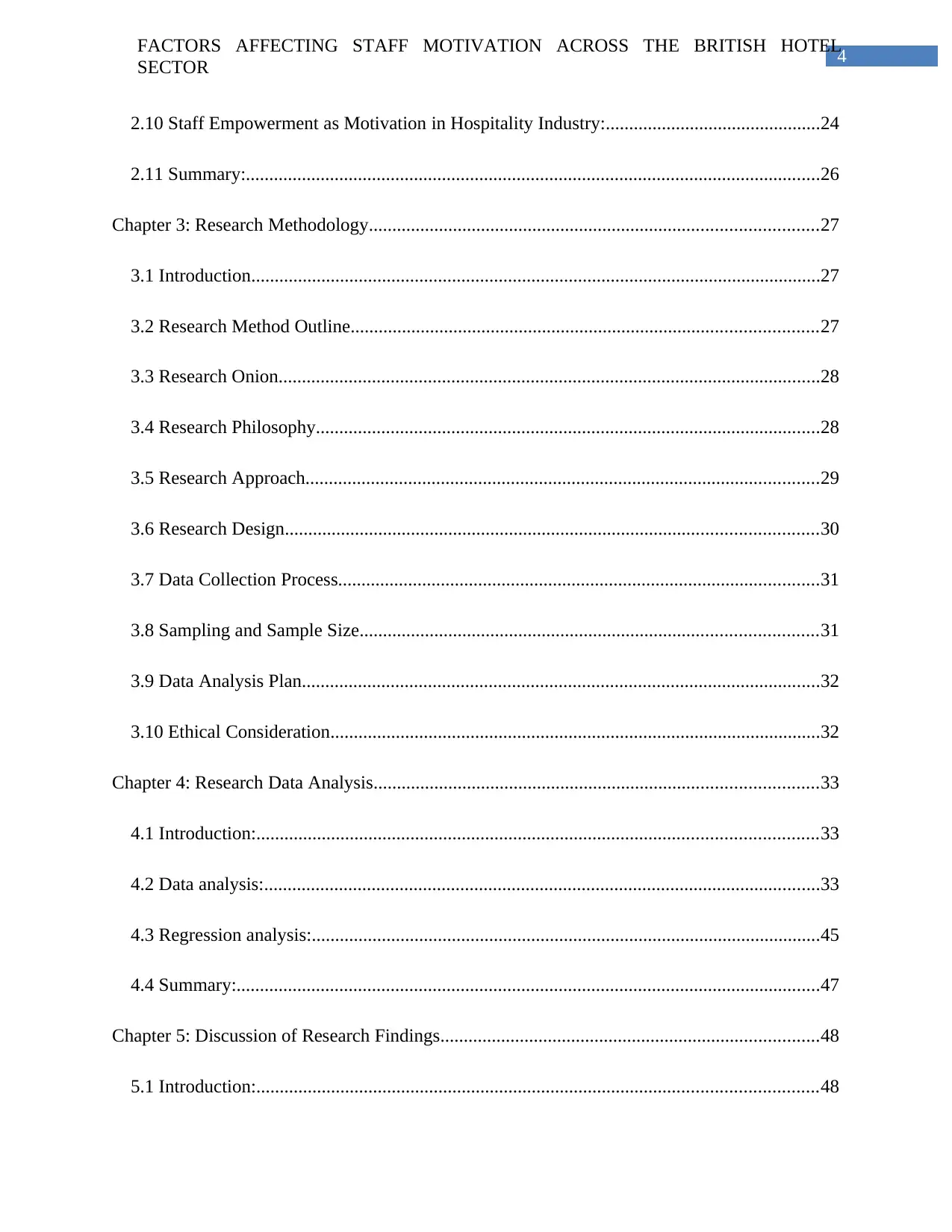
4
FACTORS AFFECTING STAFF MOTIVATION ACROSS THE BRITISH HOTEL
SECTOR
2.10 Staff Empowerment as Motivation in Hospitality Industry:..............................................24
2.11 Summary:...........................................................................................................................26
Chapter 3: Research Methodology................................................................................................27
3.1 Introduction..........................................................................................................................27
3.2 Research Method Outline....................................................................................................27
3.3 Research Onion....................................................................................................................28
3.4 Research Philosophy............................................................................................................28
3.5 Research Approach..............................................................................................................29
3.6 Research Design..................................................................................................................30
3.7 Data Collection Process.......................................................................................................31
3.8 Sampling and Sample Size..................................................................................................31
3.9 Data Analysis Plan...............................................................................................................32
3.10 Ethical Consideration.........................................................................................................32
Chapter 4: Research Data Analysis...............................................................................................33
4.1 Introduction:........................................................................................................................33
4.2 Data analysis:.......................................................................................................................33
4.3 Regression analysis:.............................................................................................................45
4.4 Summary:.............................................................................................................................47
Chapter 5: Discussion of Research Findings.................................................................................48
5.1 Introduction:........................................................................................................................48
FACTORS AFFECTING STAFF MOTIVATION ACROSS THE BRITISH HOTEL
SECTOR
2.10 Staff Empowerment as Motivation in Hospitality Industry:..............................................24
2.11 Summary:...........................................................................................................................26
Chapter 3: Research Methodology................................................................................................27
3.1 Introduction..........................................................................................................................27
3.2 Research Method Outline....................................................................................................27
3.3 Research Onion....................................................................................................................28
3.4 Research Philosophy............................................................................................................28
3.5 Research Approach..............................................................................................................29
3.6 Research Design..................................................................................................................30
3.7 Data Collection Process.......................................................................................................31
3.8 Sampling and Sample Size..................................................................................................31
3.9 Data Analysis Plan...............................................................................................................32
3.10 Ethical Consideration.........................................................................................................32
Chapter 4: Research Data Analysis...............................................................................................33
4.1 Introduction:........................................................................................................................33
4.2 Data analysis:.......................................................................................................................33
4.3 Regression analysis:.............................................................................................................45
4.4 Summary:.............................................................................................................................47
Chapter 5: Discussion of Research Findings.................................................................................48
5.1 Introduction:........................................................................................................................48
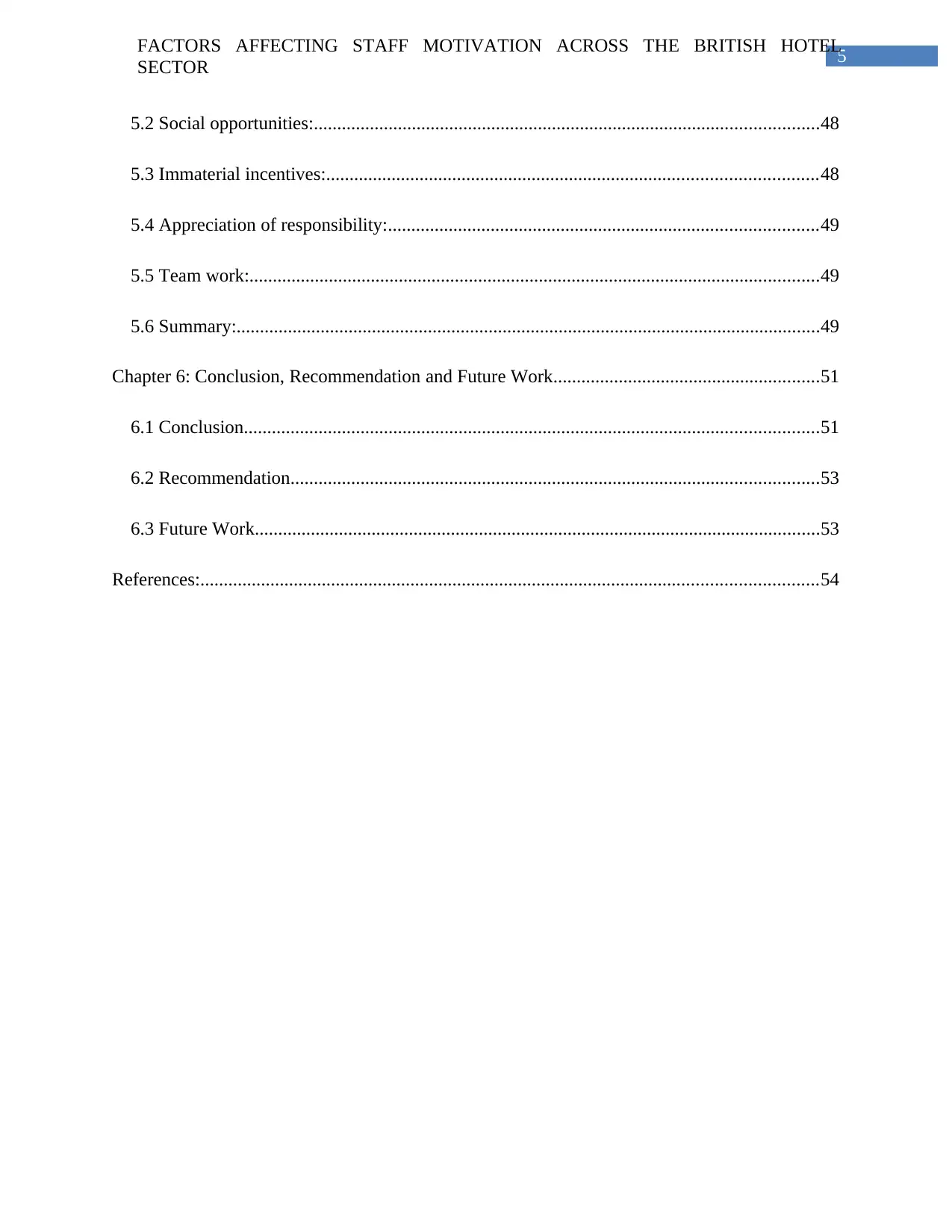
5
FACTORS AFFECTING STAFF MOTIVATION ACROSS THE BRITISH HOTEL
SECTOR
5.2 Social opportunities:............................................................................................................48
5.3 Immaterial incentives:.........................................................................................................48
5.4 Appreciation of responsibility:............................................................................................49
5.5 Team work:..........................................................................................................................49
5.6 Summary:.............................................................................................................................49
Chapter 6: Conclusion, Recommendation and Future Work.........................................................51
6.1 Conclusion...........................................................................................................................51
6.2 Recommendation.................................................................................................................53
6.3 Future Work.........................................................................................................................53
References:....................................................................................................................................54
FACTORS AFFECTING STAFF MOTIVATION ACROSS THE BRITISH HOTEL
SECTOR
5.2 Social opportunities:............................................................................................................48
5.3 Immaterial incentives:.........................................................................................................48
5.4 Appreciation of responsibility:............................................................................................49
5.5 Team work:..........................................................................................................................49
5.6 Summary:.............................................................................................................................49
Chapter 6: Conclusion, Recommendation and Future Work.........................................................51
6.1 Conclusion...........................................................................................................................51
6.2 Recommendation.................................................................................................................53
6.3 Future Work.........................................................................................................................53
References:....................................................................................................................................54
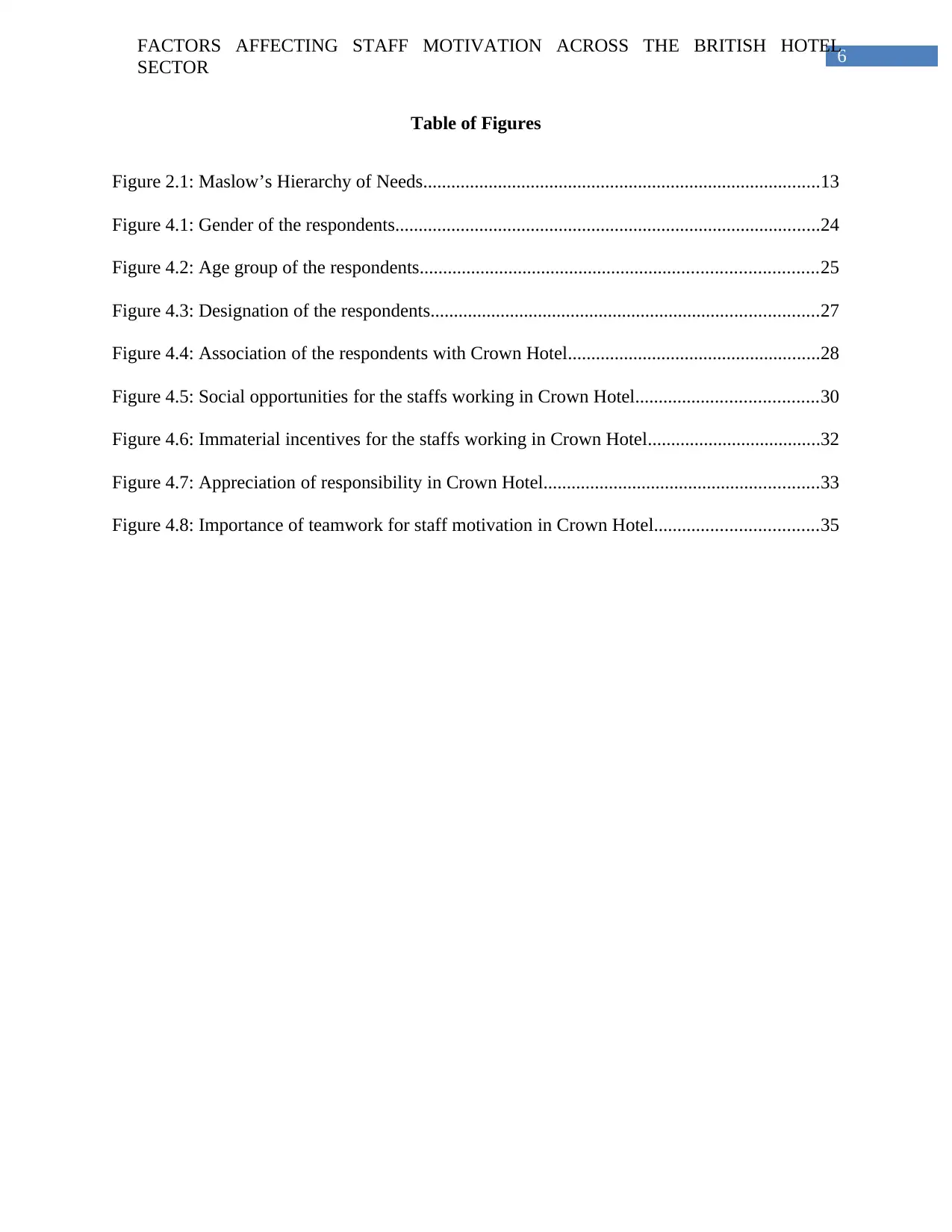
6
FACTORS AFFECTING STAFF MOTIVATION ACROSS THE BRITISH HOTEL
SECTOR
Table of Figures
Figure 2.1: Maslow’s Hierarchy of Needs.....................................................................................13
Figure 4.1: Gender of the respondents...........................................................................................24
Figure 4.2: Age group of the respondents.....................................................................................25
Figure 4.3: Designation of the respondents...................................................................................27
Figure 4.4: Association of the respondents with Crown Hotel......................................................28
Figure 4.5: Social opportunities for the staffs working in Crown Hotel.......................................30
Figure 4.6: Immaterial incentives for the staffs working in Crown Hotel.....................................32
Figure 4.7: Appreciation of responsibility in Crown Hotel...........................................................33
Figure 4.8: Importance of teamwork for staff motivation in Crown Hotel...................................35
FACTORS AFFECTING STAFF MOTIVATION ACROSS THE BRITISH HOTEL
SECTOR
Table of Figures
Figure 2.1: Maslow’s Hierarchy of Needs.....................................................................................13
Figure 4.1: Gender of the respondents...........................................................................................24
Figure 4.2: Age group of the respondents.....................................................................................25
Figure 4.3: Designation of the respondents...................................................................................27
Figure 4.4: Association of the respondents with Crown Hotel......................................................28
Figure 4.5: Social opportunities for the staffs working in Crown Hotel.......................................30
Figure 4.6: Immaterial incentives for the staffs working in Crown Hotel.....................................32
Figure 4.7: Appreciation of responsibility in Crown Hotel...........................................................33
Figure 4.8: Importance of teamwork for staff motivation in Crown Hotel...................................35
Paraphrase This Document
Need a fresh take? Get an instant paraphrase of this document with our AI Paraphraser
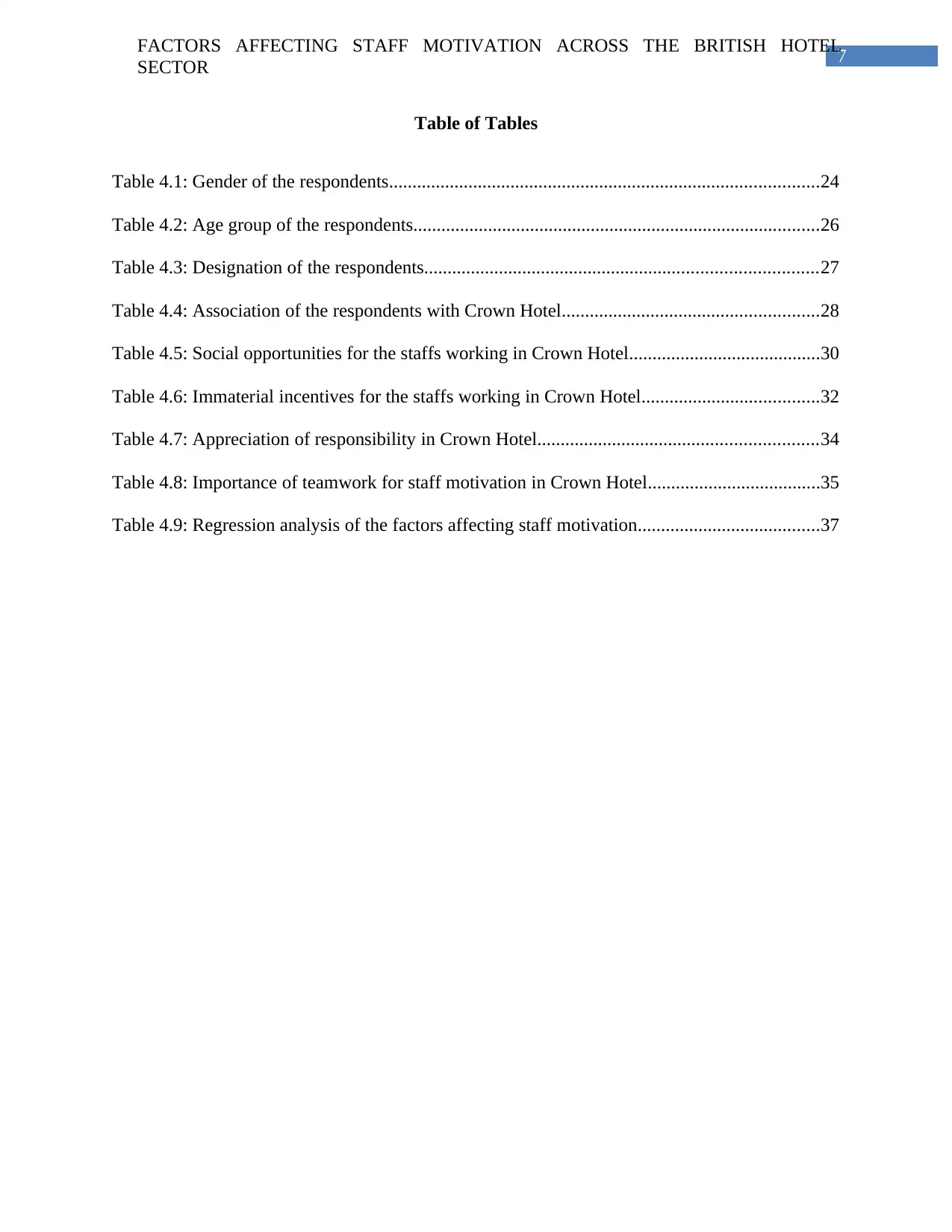
7
FACTORS AFFECTING STAFF MOTIVATION ACROSS THE BRITISH HOTEL
SECTOR
Table of Tables
Table 4.1: Gender of the respondents............................................................................................24
Table 4.2: Age group of the respondents.......................................................................................26
Table 4.3: Designation of the respondents....................................................................................27
Table 4.4: Association of the respondents with Crown Hotel.......................................................28
Table 4.5: Social opportunities for the staffs working in Crown Hotel.........................................30
Table 4.6: Immaterial incentives for the staffs working in Crown Hotel......................................32
Table 4.7: Appreciation of responsibility in Crown Hotel............................................................34
Table 4.8: Importance of teamwork for staff motivation in Crown Hotel.....................................35
Table 4.9: Regression analysis of the factors affecting staff motivation.......................................37
FACTORS AFFECTING STAFF MOTIVATION ACROSS THE BRITISH HOTEL
SECTOR
Table of Tables
Table 4.1: Gender of the respondents............................................................................................24
Table 4.2: Age group of the respondents.......................................................................................26
Table 4.3: Designation of the respondents....................................................................................27
Table 4.4: Association of the respondents with Crown Hotel.......................................................28
Table 4.5: Social opportunities for the staffs working in Crown Hotel.........................................30
Table 4.6: Immaterial incentives for the staffs working in Crown Hotel......................................32
Table 4.7: Appreciation of responsibility in Crown Hotel............................................................34
Table 4.8: Importance of teamwork for staff motivation in Crown Hotel.....................................35
Table 4.9: Regression analysis of the factors affecting staff motivation.......................................37
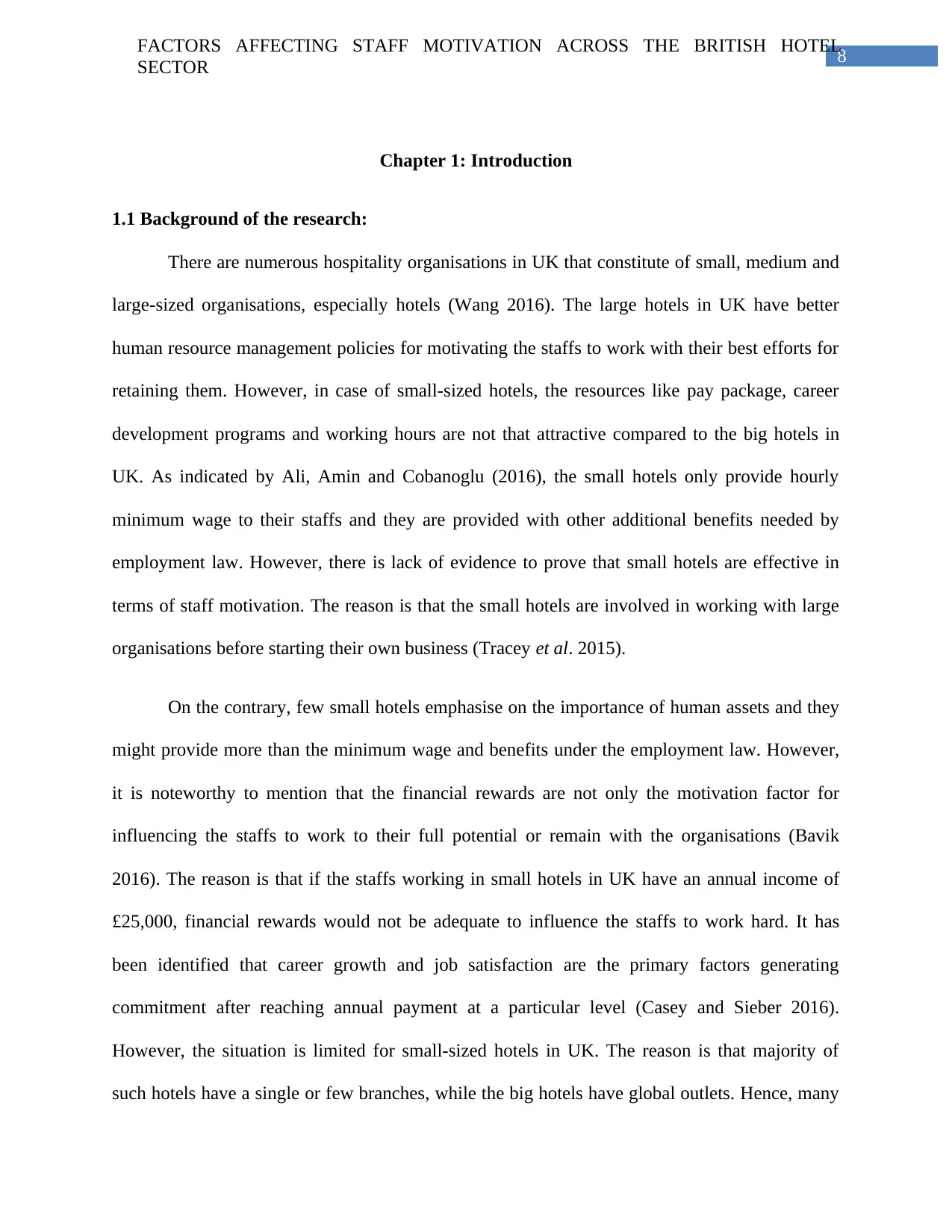
8
FACTORS AFFECTING STAFF MOTIVATION ACROSS THE BRITISH HOTEL
SECTOR
Chapter 1: Introduction
1.1 Background of the research:
There are numerous hospitality organisations in UK that constitute of small, medium and
large-sized organisations, especially hotels (Wang 2016). The large hotels in UK have better
human resource management policies for motivating the staffs to work with their best efforts for
retaining them. However, in case of small-sized hotels, the resources like pay package, career
development programs and working hours are not that attractive compared to the big hotels in
UK. As indicated by Ali, Amin and Cobanoglu (2016), the small hotels only provide hourly
minimum wage to their staffs and they are provided with other additional benefits needed by
employment law. However, there is lack of evidence to prove that small hotels are effective in
terms of staff motivation. The reason is that the small hotels are involved in working with large
organisations before starting their own business (Tracey et al. 2015).
On the contrary, few small hotels emphasise on the importance of human assets and they
might provide more than the minimum wage and benefits under the employment law. However,
it is noteworthy to mention that the financial rewards are not only the motivation factor for
influencing the staffs to work to their full potential or remain with the organisations (Bavik
2016). The reason is that if the staffs working in small hotels in UK have an annual income of
£25,000, financial rewards would not be adequate to influence the staffs to work hard. It has
been identified that career growth and job satisfaction are the primary factors generating
commitment after reaching annual payment at a particular level (Casey and Sieber 2016).
However, the situation is limited for small-sized hotels in UK. The reason is that majority of
such hotels have a single or few branches, while the big hotels have global outlets. Hence, many
FACTORS AFFECTING STAFF MOTIVATION ACROSS THE BRITISH HOTEL
SECTOR
Chapter 1: Introduction
1.1 Background of the research:
There are numerous hospitality organisations in UK that constitute of small, medium and
large-sized organisations, especially hotels (Wang 2016). The large hotels in UK have better
human resource management policies for motivating the staffs to work with their best efforts for
retaining them. However, in case of small-sized hotels, the resources like pay package, career
development programs and working hours are not that attractive compared to the big hotels in
UK. As indicated by Ali, Amin and Cobanoglu (2016), the small hotels only provide hourly
minimum wage to their staffs and they are provided with other additional benefits needed by
employment law. However, there is lack of evidence to prove that small hotels are effective in
terms of staff motivation. The reason is that the small hotels are involved in working with large
organisations before starting their own business (Tracey et al. 2015).
On the contrary, few small hotels emphasise on the importance of human assets and they
might provide more than the minimum wage and benefits under the employment law. However,
it is noteworthy to mention that the financial rewards are not only the motivation factor for
influencing the staffs to work to their full potential or remain with the organisations (Bavik
2016). The reason is that if the staffs working in small hotels in UK have an annual income of
£25,000, financial rewards would not be adequate to influence the staffs to work hard. It has
been identified that career growth and job satisfaction are the primary factors generating
commitment after reaching annual payment at a particular level (Casey and Sieber 2016).
However, the situation is limited for small-sized hotels in UK. The reason is that majority of
such hotels have a single or few branches, while the big hotels have global outlets. Hence, many
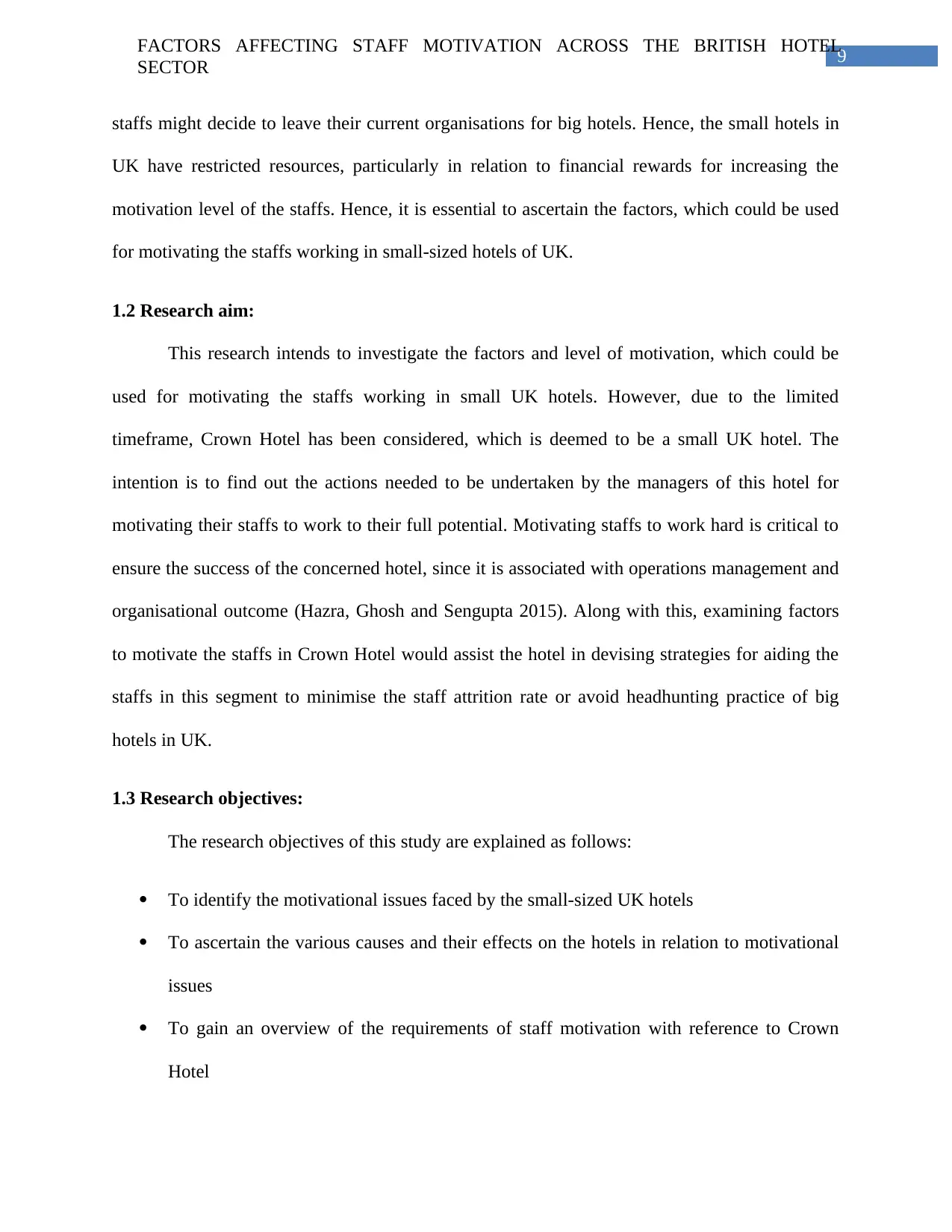
9
FACTORS AFFECTING STAFF MOTIVATION ACROSS THE BRITISH HOTEL
SECTOR
staffs might decide to leave their current organisations for big hotels. Hence, the small hotels in
UK have restricted resources, particularly in relation to financial rewards for increasing the
motivation level of the staffs. Hence, it is essential to ascertain the factors, which could be used
for motivating the staffs working in small-sized hotels of UK.
1.2 Research aim:
This research intends to investigate the factors and level of motivation, which could be
used for motivating the staffs working in small UK hotels. However, due to the limited
timeframe, Crown Hotel has been considered, which is deemed to be a small UK hotel. The
intention is to find out the actions needed to be undertaken by the managers of this hotel for
motivating their staffs to work to their full potential. Motivating staffs to work hard is critical to
ensure the success of the concerned hotel, since it is associated with operations management and
organisational outcome (Hazra, Ghosh and Sengupta 2015). Along with this, examining factors
to motivate the staffs in Crown Hotel would assist the hotel in devising strategies for aiding the
staffs in this segment to minimise the staff attrition rate or avoid headhunting practice of big
hotels in UK.
1.3 Research objectives:
The research objectives of this study are explained as follows:
To identify the motivational issues faced by the small-sized UK hotels
To ascertain the various causes and their effects on the hotels in relation to motivational
issues
To gain an overview of the requirements of staff motivation with reference to Crown
Hotel
FACTORS AFFECTING STAFF MOTIVATION ACROSS THE BRITISH HOTEL
SECTOR
staffs might decide to leave their current organisations for big hotels. Hence, the small hotels in
UK have restricted resources, particularly in relation to financial rewards for increasing the
motivation level of the staffs. Hence, it is essential to ascertain the factors, which could be used
for motivating the staffs working in small-sized hotels of UK.
1.2 Research aim:
This research intends to investigate the factors and level of motivation, which could be
used for motivating the staffs working in small UK hotels. However, due to the limited
timeframe, Crown Hotel has been considered, which is deemed to be a small UK hotel. The
intention is to find out the actions needed to be undertaken by the managers of this hotel for
motivating their staffs to work to their full potential. Motivating staffs to work hard is critical to
ensure the success of the concerned hotel, since it is associated with operations management and
organisational outcome (Hazra, Ghosh and Sengupta 2015). Along with this, examining factors
to motivate the staffs in Crown Hotel would assist the hotel in devising strategies for aiding the
staffs in this segment to minimise the staff attrition rate or avoid headhunting practice of big
hotels in UK.
1.3 Research objectives:
The research objectives of this study are explained as follows:
To identify the motivational issues faced by the small-sized UK hotels
To ascertain the various causes and their effects on the hotels in relation to motivational
issues
To gain an overview of the requirements of staff motivation with reference to Crown
Hotel
Secure Best Marks with AI Grader
Need help grading? Try our AI Grader for instant feedback on your assignments.
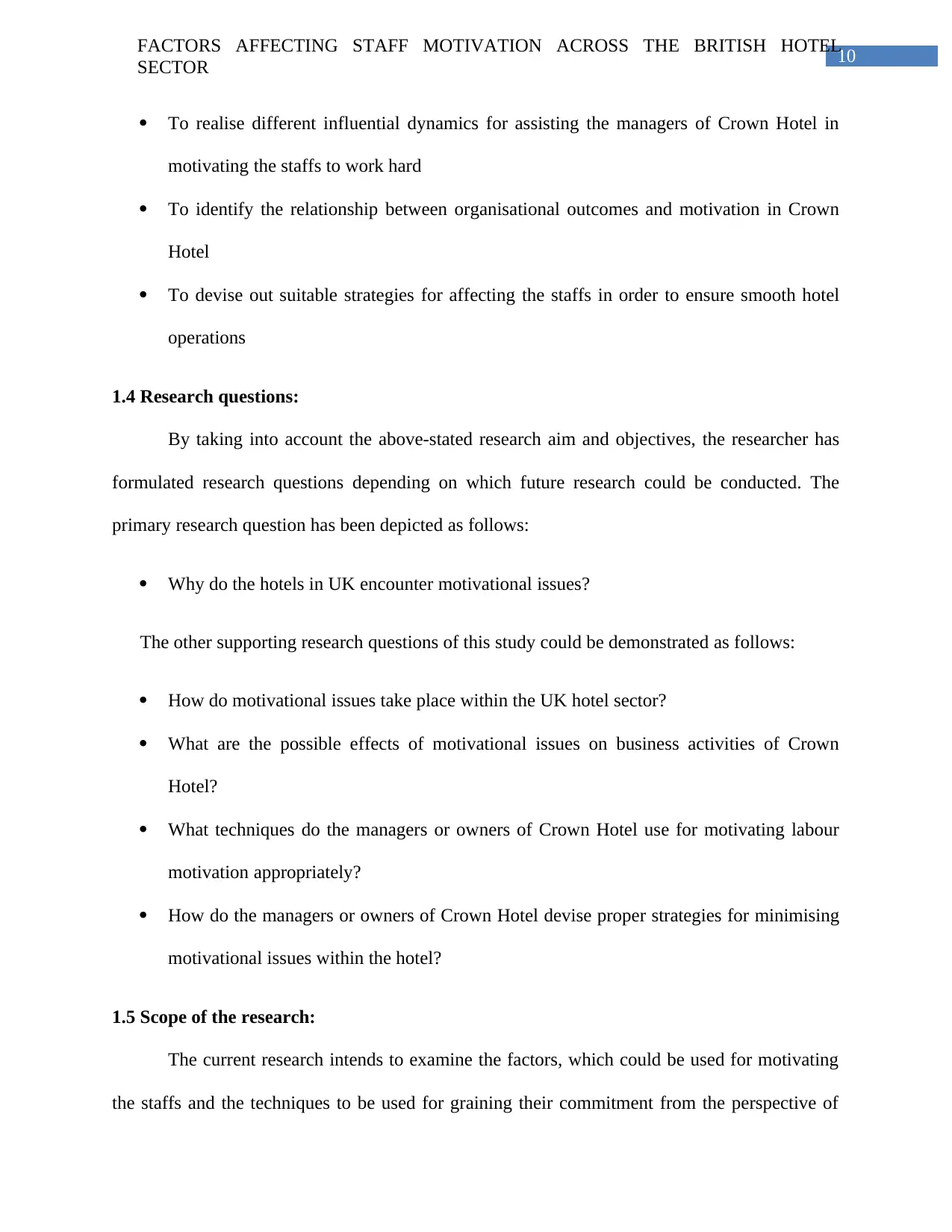
10
FACTORS AFFECTING STAFF MOTIVATION ACROSS THE BRITISH HOTEL
SECTOR
To realise different influential dynamics for assisting the managers of Crown Hotel in
motivating the staffs to work hard
To identify the relationship between organisational outcomes and motivation in Crown
Hotel
To devise out suitable strategies for affecting the staffs in order to ensure smooth hotel
operations
1.4 Research questions:
By taking into account the above-stated research aim and objectives, the researcher has
formulated research questions depending on which future research could be conducted. The
primary research question has been depicted as follows:
Why do the hotels in UK encounter motivational issues?
The other supporting research questions of this study could be demonstrated as follows:
How do motivational issues take place within the UK hotel sector?
What are the possible effects of motivational issues on business activities of Crown
Hotel?
What techniques do the managers or owners of Crown Hotel use for motivating labour
motivation appropriately?
How do the managers or owners of Crown Hotel devise proper strategies for minimising
motivational issues within the hotel?
1.5 Scope of the research:
The current research intends to examine the factors, which could be used for motivating
the staffs and the techniques to be used for graining their commitment from the perspective of
FACTORS AFFECTING STAFF MOTIVATION ACROSS THE BRITISH HOTEL
SECTOR
To realise different influential dynamics for assisting the managers of Crown Hotel in
motivating the staffs to work hard
To identify the relationship between organisational outcomes and motivation in Crown
Hotel
To devise out suitable strategies for affecting the staffs in order to ensure smooth hotel
operations
1.4 Research questions:
By taking into account the above-stated research aim and objectives, the researcher has
formulated research questions depending on which future research could be conducted. The
primary research question has been depicted as follows:
Why do the hotels in UK encounter motivational issues?
The other supporting research questions of this study could be demonstrated as follows:
How do motivational issues take place within the UK hotel sector?
What are the possible effects of motivational issues on business activities of Crown
Hotel?
What techniques do the managers or owners of Crown Hotel use for motivating labour
motivation appropriately?
How do the managers or owners of Crown Hotel devise proper strategies for minimising
motivational issues within the hotel?
1.5 Scope of the research:
The current research intends to examine the factors, which could be used for motivating
the staffs and the techniques to be used for graining their commitment from the perspective of
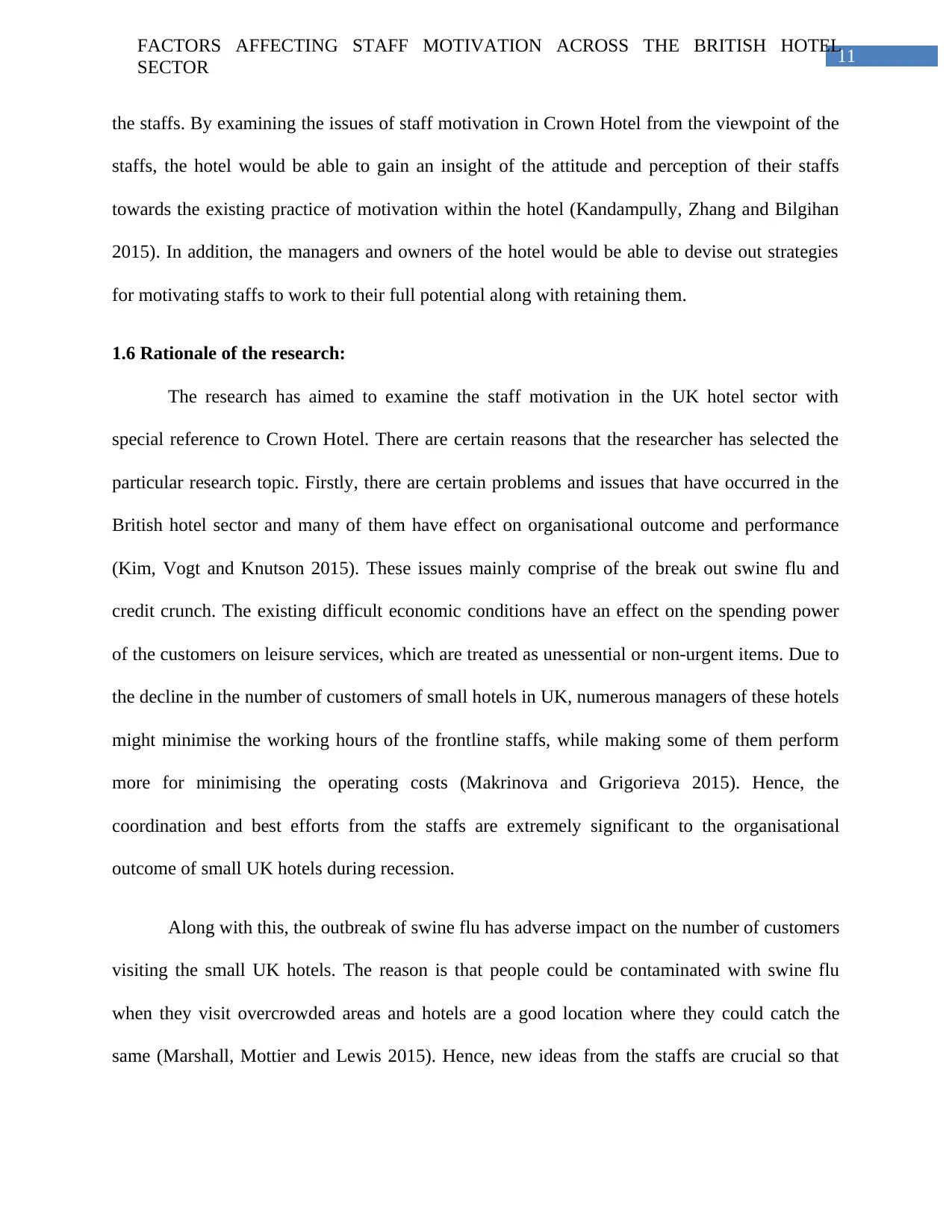
11
FACTORS AFFECTING STAFF MOTIVATION ACROSS THE BRITISH HOTEL
SECTOR
the staffs. By examining the issues of staff motivation in Crown Hotel from the viewpoint of the
staffs, the hotel would be able to gain an insight of the attitude and perception of their staffs
towards the existing practice of motivation within the hotel (Kandampully, Zhang and Bilgihan
2015). In addition, the managers and owners of the hotel would be able to devise out strategies
for motivating staffs to work to their full potential along with retaining them.
1.6 Rationale of the research:
The research has aimed to examine the staff motivation in the UK hotel sector with
special reference to Crown Hotel. There are certain reasons that the researcher has selected the
particular research topic. Firstly, there are certain problems and issues that have occurred in the
British hotel sector and many of them have effect on organisational outcome and performance
(Kim, Vogt and Knutson 2015). These issues mainly comprise of the break out swine flu and
credit crunch. The existing difficult economic conditions have an effect on the spending power
of the customers on leisure services, which are treated as unessential or non-urgent items. Due to
the decline in the number of customers of small hotels in UK, numerous managers of these hotels
might minimise the working hours of the frontline staffs, while making some of them perform
more for minimising the operating costs (Makrinova and Grigorieva 2015). Hence, the
coordination and best efforts from the staffs are extremely significant to the organisational
outcome of small UK hotels during recession.
Along with this, the outbreak of swine flu has adverse impact on the number of customers
visiting the small UK hotels. The reason is that people could be contaminated with swine flu
when they visit overcrowded areas and hotels are a good location where they could catch the
same (Marshall, Mottier and Lewis 2015). Hence, new ideas from the staffs are crucial so that
FACTORS AFFECTING STAFF MOTIVATION ACROSS THE BRITISH HOTEL
SECTOR
the staffs. By examining the issues of staff motivation in Crown Hotel from the viewpoint of the
staffs, the hotel would be able to gain an insight of the attitude and perception of their staffs
towards the existing practice of motivation within the hotel (Kandampully, Zhang and Bilgihan
2015). In addition, the managers and owners of the hotel would be able to devise out strategies
for motivating staffs to work to their full potential along with retaining them.
1.6 Rationale of the research:
The research has aimed to examine the staff motivation in the UK hotel sector with
special reference to Crown Hotel. There are certain reasons that the researcher has selected the
particular research topic. Firstly, there are certain problems and issues that have occurred in the
British hotel sector and many of them have effect on organisational outcome and performance
(Kim, Vogt and Knutson 2015). These issues mainly comprise of the break out swine flu and
credit crunch. The existing difficult economic conditions have an effect on the spending power
of the customers on leisure services, which are treated as unessential or non-urgent items. Due to
the decline in the number of customers of small hotels in UK, numerous managers of these hotels
might minimise the working hours of the frontline staffs, while making some of them perform
more for minimising the operating costs (Makrinova and Grigorieva 2015). Hence, the
coordination and best efforts from the staffs are extremely significant to the organisational
outcome of small UK hotels during recession.
Along with this, the outbreak of swine flu has adverse impact on the number of customers
visiting the small UK hotels. The reason is that people could be contaminated with swine flu
when they visit overcrowded areas and hotels are a good location where they could catch the
same (Marshall, Mottier and Lewis 2015). Hence, new ideas from the staffs are crucial so that
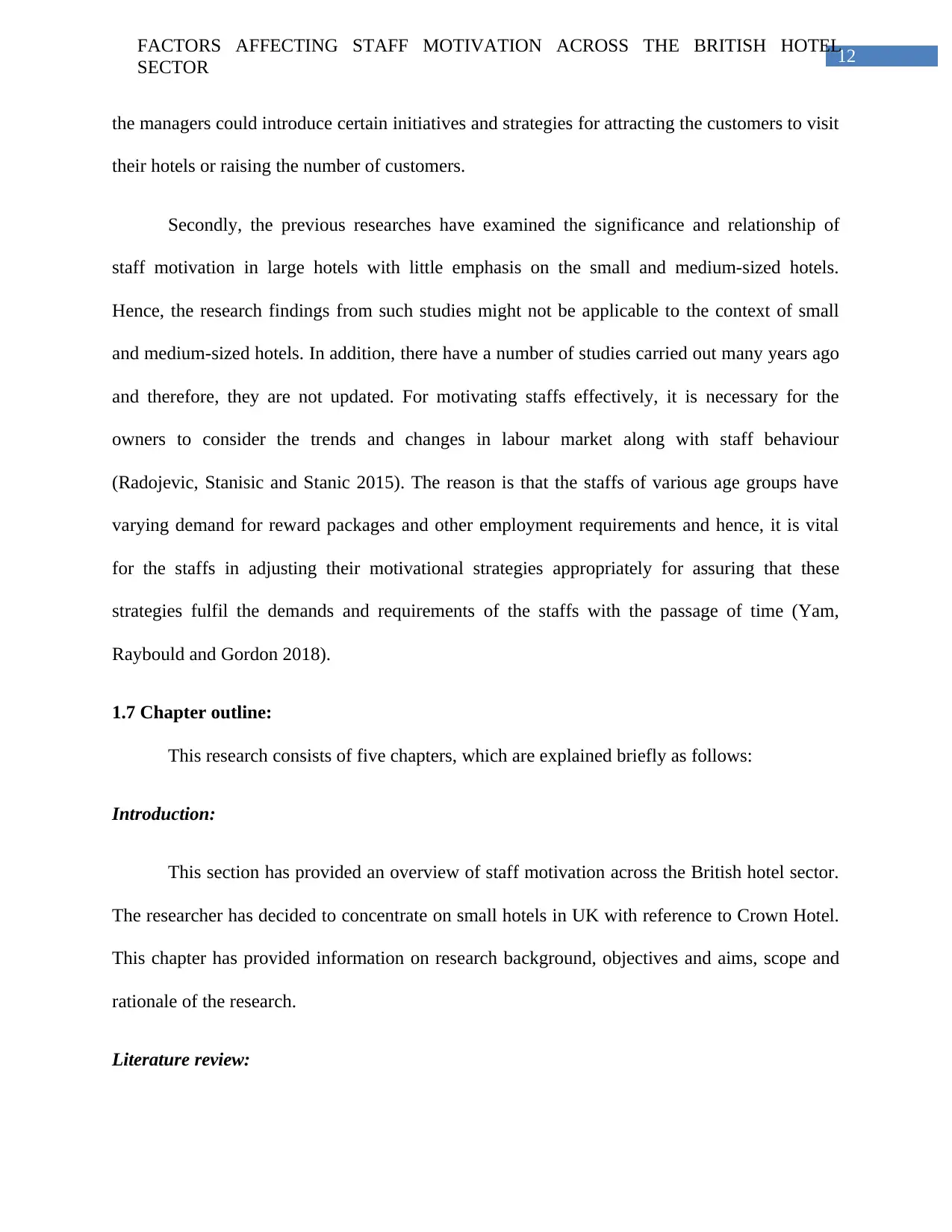
12
FACTORS AFFECTING STAFF MOTIVATION ACROSS THE BRITISH HOTEL
SECTOR
the managers could introduce certain initiatives and strategies for attracting the customers to visit
their hotels or raising the number of customers.
Secondly, the previous researches have examined the significance and relationship of
staff motivation in large hotels with little emphasis on the small and medium-sized hotels.
Hence, the research findings from such studies might not be applicable to the context of small
and medium-sized hotels. In addition, there have a number of studies carried out many years ago
and therefore, they are not updated. For motivating staffs effectively, it is necessary for the
owners to consider the trends and changes in labour market along with staff behaviour
(Radojevic, Stanisic and Stanic 2015). The reason is that the staffs of various age groups have
varying demand for reward packages and other employment requirements and hence, it is vital
for the staffs in adjusting their motivational strategies appropriately for assuring that these
strategies fulfil the demands and requirements of the staffs with the passage of time (Yam,
Raybould and Gordon 2018).
1.7 Chapter outline:
This research consists of five chapters, which are explained briefly as follows:
Introduction:
This section has provided an overview of staff motivation across the British hotel sector.
The researcher has decided to concentrate on small hotels in UK with reference to Crown Hotel.
This chapter has provided information on research background, objectives and aims, scope and
rationale of the research.
Literature review:
FACTORS AFFECTING STAFF MOTIVATION ACROSS THE BRITISH HOTEL
SECTOR
the managers could introduce certain initiatives and strategies for attracting the customers to visit
their hotels or raising the number of customers.
Secondly, the previous researches have examined the significance and relationship of
staff motivation in large hotels with little emphasis on the small and medium-sized hotels.
Hence, the research findings from such studies might not be applicable to the context of small
and medium-sized hotels. In addition, there have a number of studies carried out many years ago
and therefore, they are not updated. For motivating staffs effectively, it is necessary for the
owners to consider the trends and changes in labour market along with staff behaviour
(Radojevic, Stanisic and Stanic 2015). The reason is that the staffs of various age groups have
varying demand for reward packages and other employment requirements and hence, it is vital
for the staffs in adjusting their motivational strategies appropriately for assuring that these
strategies fulfil the demands and requirements of the staffs with the passage of time (Yam,
Raybould and Gordon 2018).
1.7 Chapter outline:
This research consists of five chapters, which are explained briefly as follows:
Introduction:
This section has provided an overview of staff motivation across the British hotel sector.
The researcher has decided to concentrate on small hotels in UK with reference to Crown Hotel.
This chapter has provided information on research background, objectives and aims, scope and
rationale of the research.
Literature review:
Paraphrase This Document
Need a fresh take? Get an instant paraphrase of this document with our AI Paraphraser
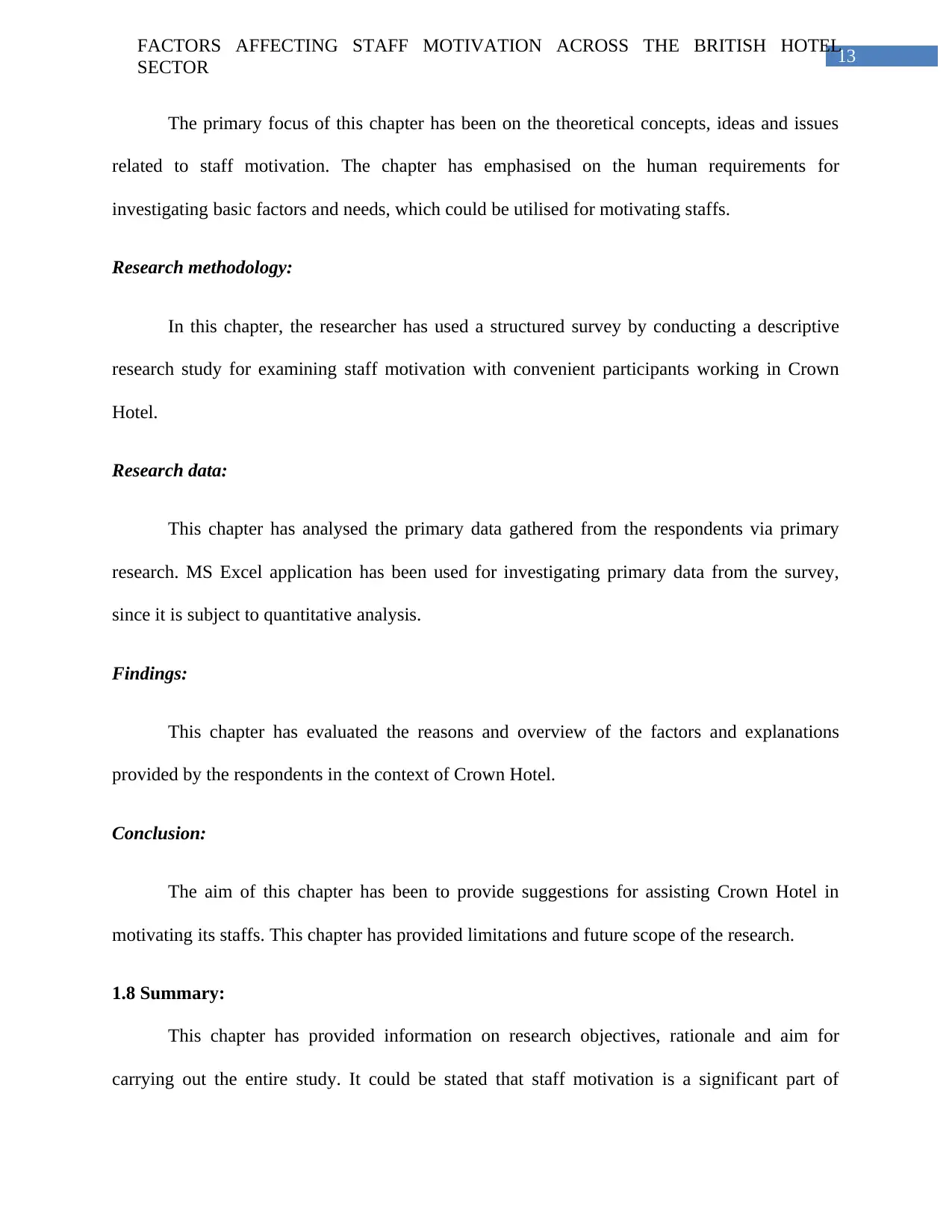
13
FACTORS AFFECTING STAFF MOTIVATION ACROSS THE BRITISH HOTEL
SECTOR
The primary focus of this chapter has been on the theoretical concepts, ideas and issues
related to staff motivation. The chapter has emphasised on the human requirements for
investigating basic factors and needs, which could be utilised for motivating staffs.
Research methodology:
In this chapter, the researcher has used a structured survey by conducting a descriptive
research study for examining staff motivation with convenient participants working in Crown
Hotel.
Research data:
This chapter has analysed the primary data gathered from the respondents via primary
research. MS Excel application has been used for investigating primary data from the survey,
since it is subject to quantitative analysis.
Findings:
This chapter has evaluated the reasons and overview of the factors and explanations
provided by the respondents in the context of Crown Hotel.
Conclusion:
The aim of this chapter has been to provide suggestions for assisting Crown Hotel in
motivating its staffs. This chapter has provided limitations and future scope of the research.
1.8 Summary:
This chapter has provided information on research objectives, rationale and aim for
carrying out the entire study. It could be stated that staff motivation is a significant part of
FACTORS AFFECTING STAFF MOTIVATION ACROSS THE BRITISH HOTEL
SECTOR
The primary focus of this chapter has been on the theoretical concepts, ideas and issues
related to staff motivation. The chapter has emphasised on the human requirements for
investigating basic factors and needs, which could be utilised for motivating staffs.
Research methodology:
In this chapter, the researcher has used a structured survey by conducting a descriptive
research study for examining staff motivation with convenient participants working in Crown
Hotel.
Research data:
This chapter has analysed the primary data gathered from the respondents via primary
research. MS Excel application has been used for investigating primary data from the survey,
since it is subject to quantitative analysis.
Findings:
This chapter has evaluated the reasons and overview of the factors and explanations
provided by the respondents in the context of Crown Hotel.
Conclusion:
The aim of this chapter has been to provide suggestions for assisting Crown Hotel in
motivating its staffs. This chapter has provided limitations and future scope of the research.
1.8 Summary:
This chapter has provided information on research objectives, rationale and aim for
carrying out the entire study. It could be stated that staff motivation is a significant part of
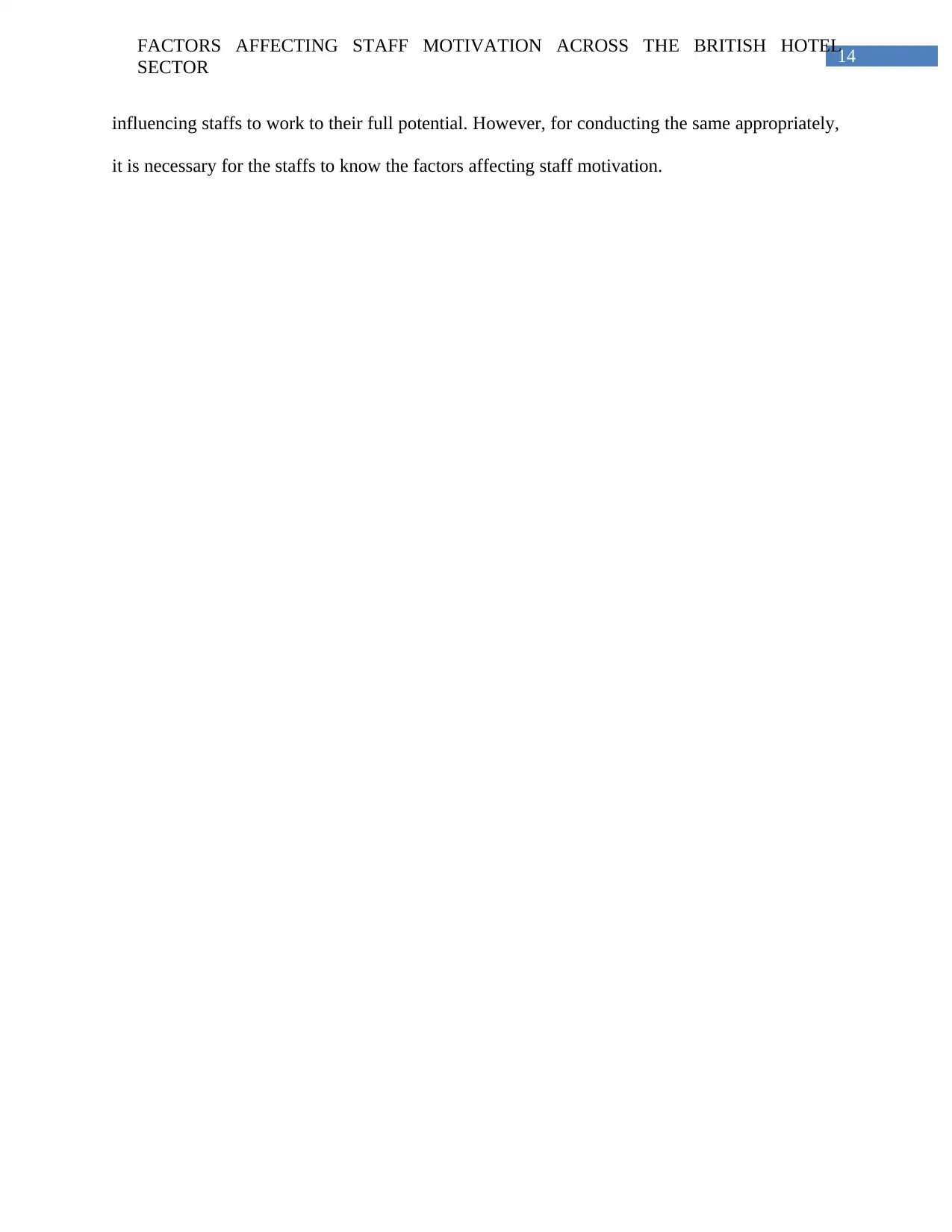
14
FACTORS AFFECTING STAFF MOTIVATION ACROSS THE BRITISH HOTEL
SECTOR
influencing staffs to work to their full potential. However, for conducting the same appropriately,
it is necessary for the staffs to know the factors affecting staff motivation.
FACTORS AFFECTING STAFF MOTIVATION ACROSS THE BRITISH HOTEL
SECTOR
influencing staffs to work to their full potential. However, for conducting the same appropriately,
it is necessary for the staffs to know the factors affecting staff motivation.
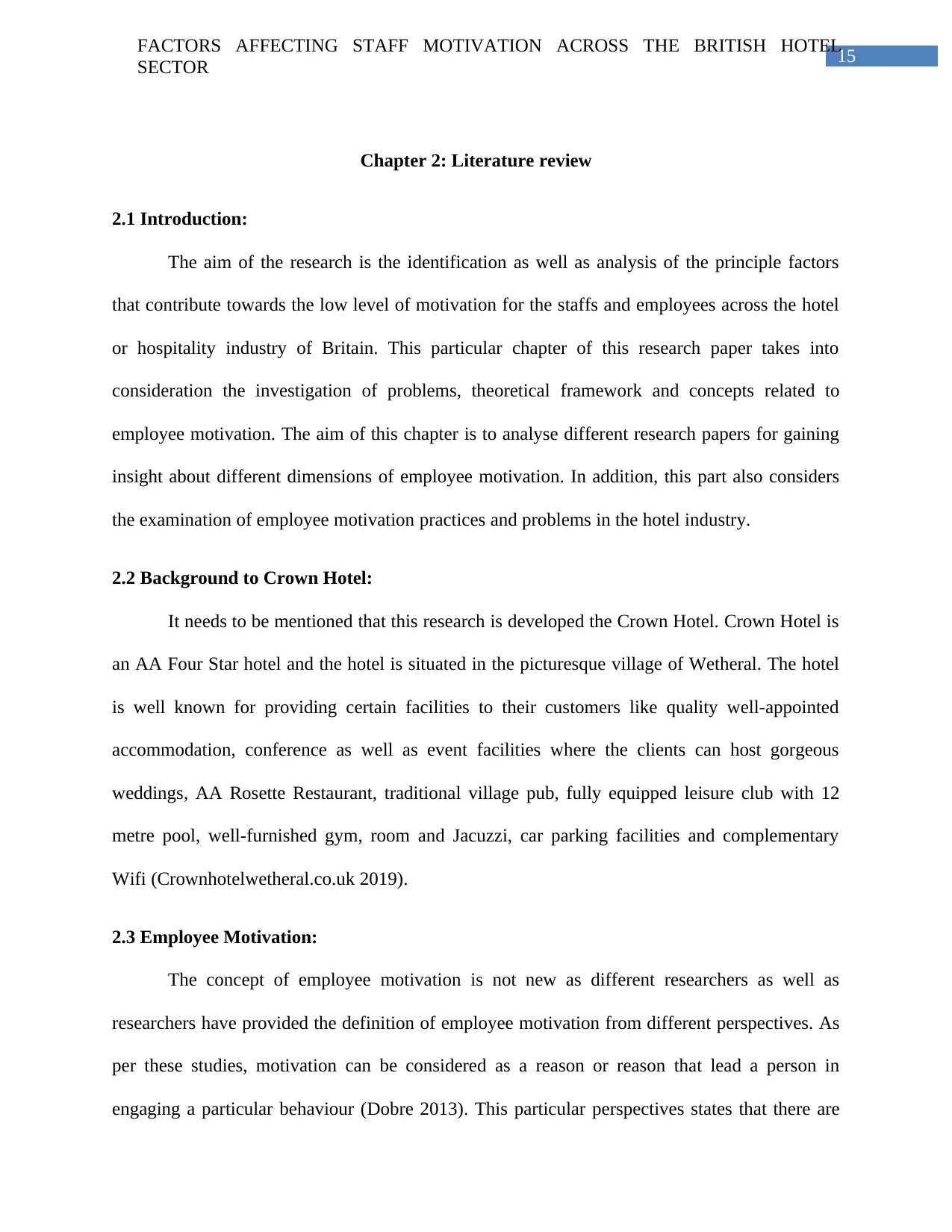
15
FACTORS AFFECTING STAFF MOTIVATION ACROSS THE BRITISH HOTEL
SECTOR
Chapter 2: Literature review
2.1 Introduction:
The aim of the research is the identification as well as analysis of the principle factors
that contribute towards the low level of motivation for the staffs and employees across the hotel
or hospitality industry of Britain. This particular chapter of this research paper takes into
consideration the investigation of problems, theoretical framework and concepts related to
employee motivation. The aim of this chapter is to analyse different research papers for gaining
insight about different dimensions of employee motivation. In addition, this part also considers
the examination of employee motivation practices and problems in the hotel industry.
2.2 Background to Crown Hotel:
It needs to be mentioned that this research is developed the Crown Hotel. Crown Hotel is
an AA Four Star hotel and the hotel is situated in the picturesque village of Wetheral. The hotel
is well known for providing certain facilities to their customers like quality well-appointed
accommodation, conference as well as event facilities where the clients can host gorgeous
weddings, AA Rosette Restaurant, traditional village pub, fully equipped leisure club with 12
metre pool, well-furnished gym, room and Jacuzzi, car parking facilities and complementary
Wifi (Crownhotelwetheral.co.uk 2019).
2.3 Employee Motivation:
The concept of employee motivation is not new as different researchers as well as
researchers have provided the definition of employee motivation from different perspectives. As
per these studies, motivation can be considered as a reason or reason that lead a person in
engaging a particular behaviour (Dobre 2013). This particular perspectives states that there are
FACTORS AFFECTING STAFF MOTIVATION ACROSS THE BRITISH HOTEL
SECTOR
Chapter 2: Literature review
2.1 Introduction:
The aim of the research is the identification as well as analysis of the principle factors
that contribute towards the low level of motivation for the staffs and employees across the hotel
or hospitality industry of Britain. This particular chapter of this research paper takes into
consideration the investigation of problems, theoretical framework and concepts related to
employee motivation. The aim of this chapter is to analyse different research papers for gaining
insight about different dimensions of employee motivation. In addition, this part also considers
the examination of employee motivation practices and problems in the hotel industry.
2.2 Background to Crown Hotel:
It needs to be mentioned that this research is developed the Crown Hotel. Crown Hotel is
an AA Four Star hotel and the hotel is situated in the picturesque village of Wetheral. The hotel
is well known for providing certain facilities to their customers like quality well-appointed
accommodation, conference as well as event facilities where the clients can host gorgeous
weddings, AA Rosette Restaurant, traditional village pub, fully equipped leisure club with 12
metre pool, well-furnished gym, room and Jacuzzi, car parking facilities and complementary
Wifi (Crownhotelwetheral.co.uk 2019).
2.3 Employee Motivation:
The concept of employee motivation is not new as different researchers as well as
researchers have provided the definition of employee motivation from different perspectives. As
per these studies, motivation can be considered as a reason or reason that lead a person in
engaging a particular behaviour (Dobre 2013). This particular perspectives states that there are
Secure Best Marks with AI Grader
Need help grading? Try our AI Grader for instant feedback on your assignments.
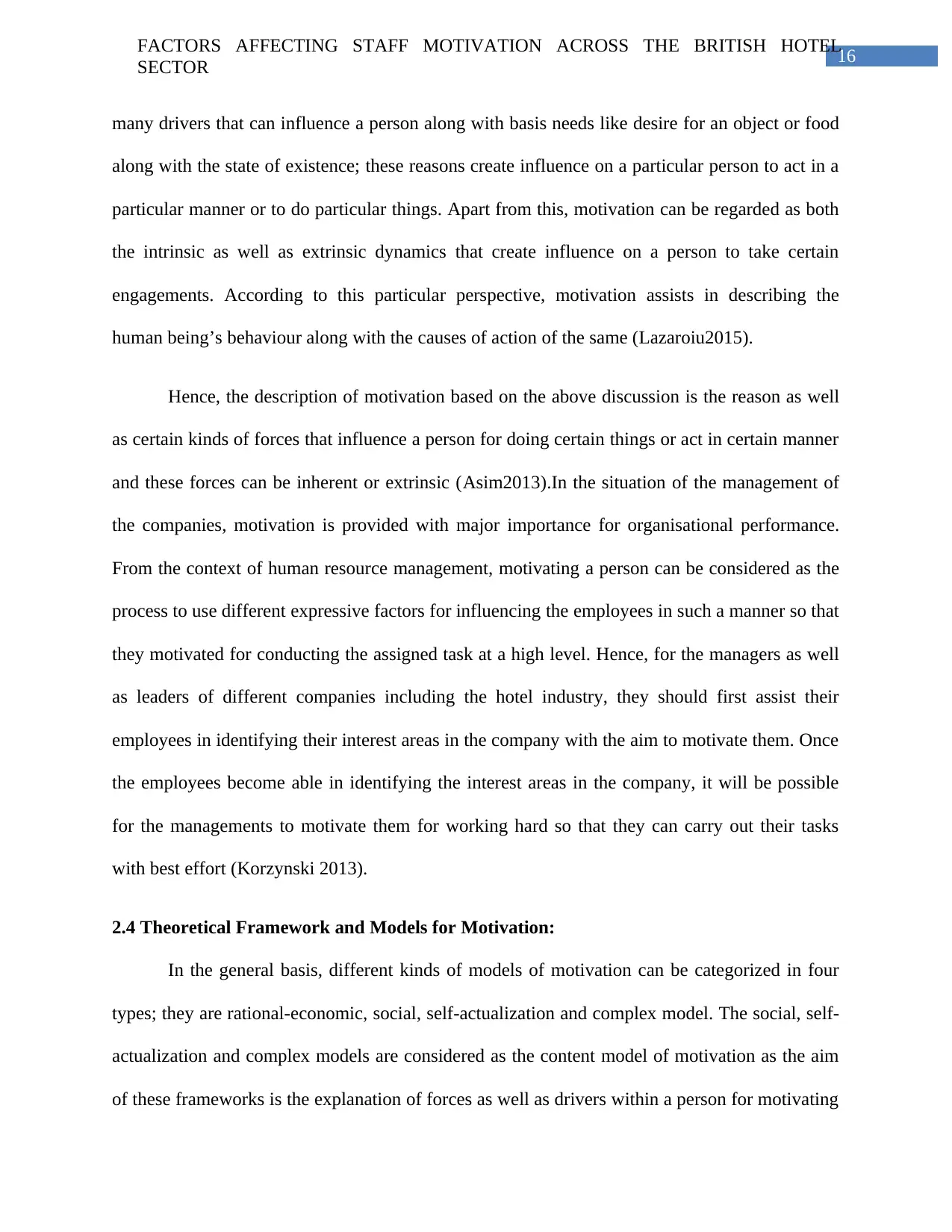
16
FACTORS AFFECTING STAFF MOTIVATION ACROSS THE BRITISH HOTEL
SECTOR
many drivers that can influence a person along with basis needs like desire for an object or food
along with the state of existence; these reasons create influence on a particular person to act in a
particular manner or to do particular things. Apart from this, motivation can be regarded as both
the intrinsic as well as extrinsic dynamics that create influence on a person to take certain
engagements. According to this particular perspective, motivation assists in describing the
human being’s behaviour along with the causes of action of the same (Lazaroiu2015).
Hence, the description of motivation based on the above discussion is the reason as well
as certain kinds of forces that influence a person for doing certain things or act in certain manner
and these forces can be inherent or extrinsic (Asim2013).In the situation of the management of
the companies, motivation is provided with major importance for organisational performance.
From the context of human resource management, motivating a person can be considered as the
process to use different expressive factors for influencing the employees in such a manner so that
they motivated for conducting the assigned task at a high level. Hence, for the managers as well
as leaders of different companies including the hotel industry, they should first assist their
employees in identifying their interest areas in the company with the aim to motivate them. Once
the employees become able in identifying the interest areas in the company, it will be possible
for the managements to motivate them for working hard so that they can carry out their tasks
with best effort (Korzynski 2013).
2.4 Theoretical Framework and Models for Motivation:
In the general basis, different kinds of models of motivation can be categorized in four
types; they are rational-economic, social, self-actualization and complex model. The social, self-
actualization and complex models are considered as the content model of motivation as the aim
of these frameworks is the explanation of forces as well as drivers within a person for motivating
FACTORS AFFECTING STAFF MOTIVATION ACROSS THE BRITISH HOTEL
SECTOR
many drivers that can influence a person along with basis needs like desire for an object or food
along with the state of existence; these reasons create influence on a particular person to act in a
particular manner or to do particular things. Apart from this, motivation can be regarded as both
the intrinsic as well as extrinsic dynamics that create influence on a person to take certain
engagements. According to this particular perspective, motivation assists in describing the
human being’s behaviour along with the causes of action of the same (Lazaroiu2015).
Hence, the description of motivation based on the above discussion is the reason as well
as certain kinds of forces that influence a person for doing certain things or act in certain manner
and these forces can be inherent or extrinsic (Asim2013).In the situation of the management of
the companies, motivation is provided with major importance for organisational performance.
From the context of human resource management, motivating a person can be considered as the
process to use different expressive factors for influencing the employees in such a manner so that
they motivated for conducting the assigned task at a high level. Hence, for the managers as well
as leaders of different companies including the hotel industry, they should first assist their
employees in identifying their interest areas in the company with the aim to motivate them. Once
the employees become able in identifying the interest areas in the company, it will be possible
for the managements to motivate them for working hard so that they can carry out their tasks
with best effort (Korzynski 2013).
2.4 Theoretical Framework and Models for Motivation:
In the general basis, different kinds of models of motivation can be categorized in four
types; they are rational-economic, social, self-actualization and complex model. The social, self-
actualization and complex models are considered as the content model of motivation as the aim
of these frameworks is the explanation of forces as well as drivers within a person for motivating
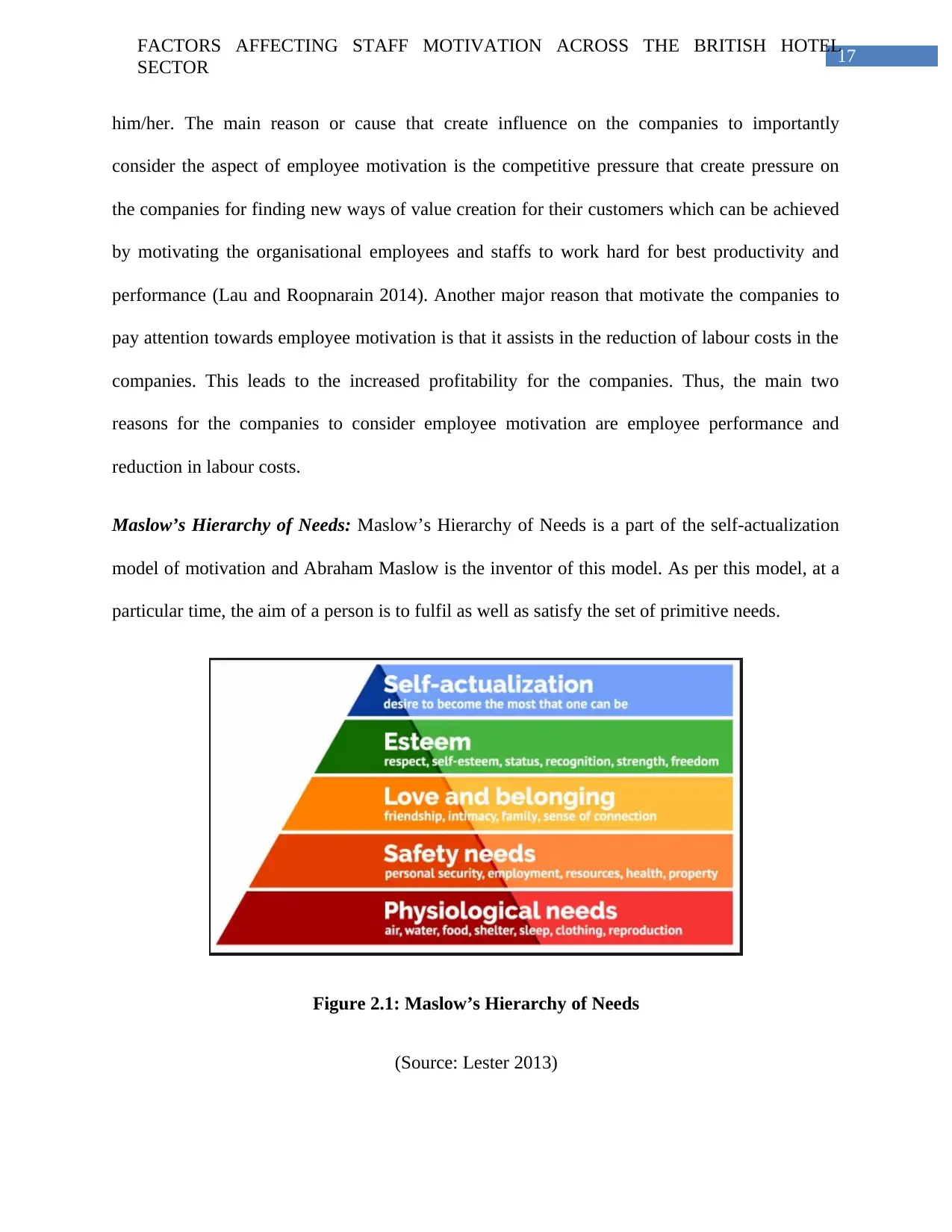
17
FACTORS AFFECTING STAFF MOTIVATION ACROSS THE BRITISH HOTEL
SECTOR
him/her. The main reason or cause that create influence on the companies to importantly
consider the aspect of employee motivation is the competitive pressure that create pressure on
the companies for finding new ways of value creation for their customers which can be achieved
by motivating the organisational employees and staffs to work hard for best productivity and
performance (Lau and Roopnarain 2014). Another major reason that motivate the companies to
pay attention towards employee motivation is that it assists in the reduction of labour costs in the
companies. This leads to the increased profitability for the companies. Thus, the main two
reasons for the companies to consider employee motivation are employee performance and
reduction in labour costs.
Maslow’s Hierarchy of Needs: Maslow’s Hierarchy of Needs is a part of the self-actualization
model of motivation and Abraham Maslow is the inventor of this model. As per this model, at a
particular time, the aim of a person is to fulfil as well as satisfy the set of primitive needs.
Figure 2.1: Maslow’s Hierarchy of Needs
(Source: Lester 2013)
FACTORS AFFECTING STAFF MOTIVATION ACROSS THE BRITISH HOTEL
SECTOR
him/her. The main reason or cause that create influence on the companies to importantly
consider the aspect of employee motivation is the competitive pressure that create pressure on
the companies for finding new ways of value creation for their customers which can be achieved
by motivating the organisational employees and staffs to work hard for best productivity and
performance (Lau and Roopnarain 2014). Another major reason that motivate the companies to
pay attention towards employee motivation is that it assists in the reduction of labour costs in the
companies. This leads to the increased profitability for the companies. Thus, the main two
reasons for the companies to consider employee motivation are employee performance and
reduction in labour costs.
Maslow’s Hierarchy of Needs: Maslow’s Hierarchy of Needs is a part of the self-actualization
model of motivation and Abraham Maslow is the inventor of this model. As per this model, at a
particular time, the aim of a person is to fulfil as well as satisfy the set of primitive needs.
Figure 2.1: Maslow’s Hierarchy of Needs
(Source: Lester 2013)
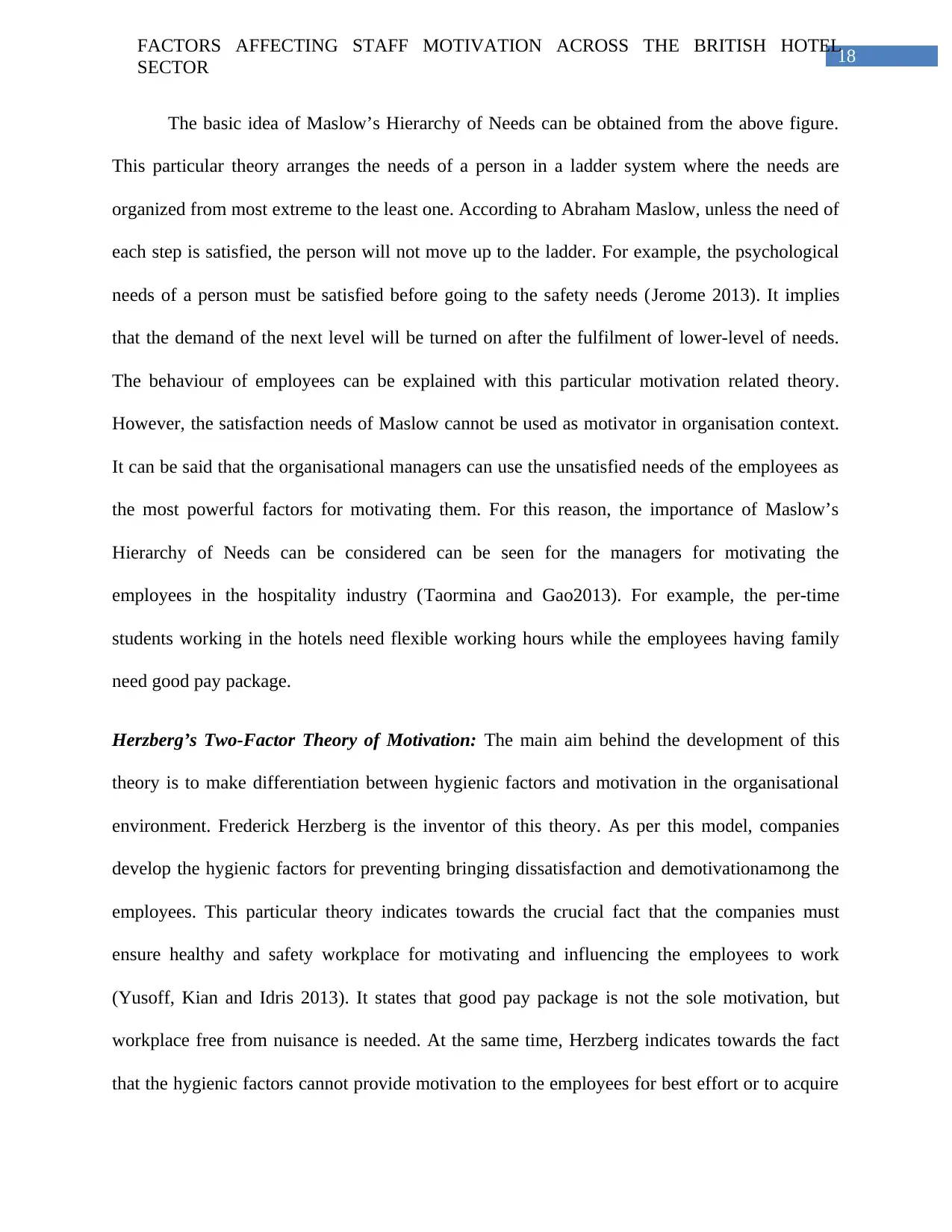
18
FACTORS AFFECTING STAFF MOTIVATION ACROSS THE BRITISH HOTEL
SECTOR
The basic idea of Maslow’s Hierarchy of Needs can be obtained from the above figure.
This particular theory arranges the needs of a person in a ladder system where the needs are
organized from most extreme to the least one. According to Abraham Maslow, unless the need of
each step is satisfied, the person will not move up to the ladder. For example, the psychological
needs of a person must be satisfied before going to the safety needs (Jerome 2013). It implies
that the demand of the next level will be turned on after the fulfilment of lower-level of needs.
The behaviour of employees can be explained with this particular motivation related theory.
However, the satisfaction needs of Maslow cannot be used as motivator in organisation context.
It can be said that the organisational managers can use the unsatisfied needs of the employees as
the most powerful factors for motivating them. For this reason, the importance of Maslow’s
Hierarchy of Needs can be considered can be seen for the managers for motivating the
employees in the hospitality industry (Taormina and Gao2013). For example, the per-time
students working in the hotels need flexible working hours while the employees having family
need good pay package.
Herzberg’s Two-Factor Theory of Motivation: The main aim behind the development of this
theory is to make differentiation between hygienic factors and motivation in the organisational
environment. Frederick Herzberg is the inventor of this theory. As per this model, companies
develop the hygienic factors for preventing bringing dissatisfaction and demotivationamong the
employees. This particular theory indicates towards the crucial fact that the companies must
ensure healthy and safety workplace for motivating and influencing the employees to work
(Yusoff, Kian and Idris 2013). It states that good pay package is not the sole motivation, but
workplace free from nuisance is needed. At the same time, Herzberg indicates towards the fact
that the hygienic factors cannot provide motivation to the employees for best effort or to acquire
FACTORS AFFECTING STAFF MOTIVATION ACROSS THE BRITISH HOTEL
SECTOR
The basic idea of Maslow’s Hierarchy of Needs can be obtained from the above figure.
This particular theory arranges the needs of a person in a ladder system where the needs are
organized from most extreme to the least one. According to Abraham Maslow, unless the need of
each step is satisfied, the person will not move up to the ladder. For example, the psychological
needs of a person must be satisfied before going to the safety needs (Jerome 2013). It implies
that the demand of the next level will be turned on after the fulfilment of lower-level of needs.
The behaviour of employees can be explained with this particular motivation related theory.
However, the satisfaction needs of Maslow cannot be used as motivator in organisation context.
It can be said that the organisational managers can use the unsatisfied needs of the employees as
the most powerful factors for motivating them. For this reason, the importance of Maslow’s
Hierarchy of Needs can be considered can be seen for the managers for motivating the
employees in the hospitality industry (Taormina and Gao2013). For example, the per-time
students working in the hotels need flexible working hours while the employees having family
need good pay package.
Herzberg’s Two-Factor Theory of Motivation: The main aim behind the development of this
theory is to make differentiation between hygienic factors and motivation in the organisational
environment. Frederick Herzberg is the inventor of this theory. As per this model, companies
develop the hygienic factors for preventing bringing dissatisfaction and demotivationamong the
employees. This particular theory indicates towards the crucial fact that the companies must
ensure healthy and safety workplace for motivating and influencing the employees to work
(Yusoff, Kian and Idris 2013). It states that good pay package is not the sole motivation, but
workplace free from nuisance is needed. At the same time, Herzberg indicates towards the fact
that the hygienic factors cannot provide motivation to the employees for best effort or to acquire
Paraphrase This Document
Need a fresh take? Get an instant paraphrase of this document with our AI Paraphraser
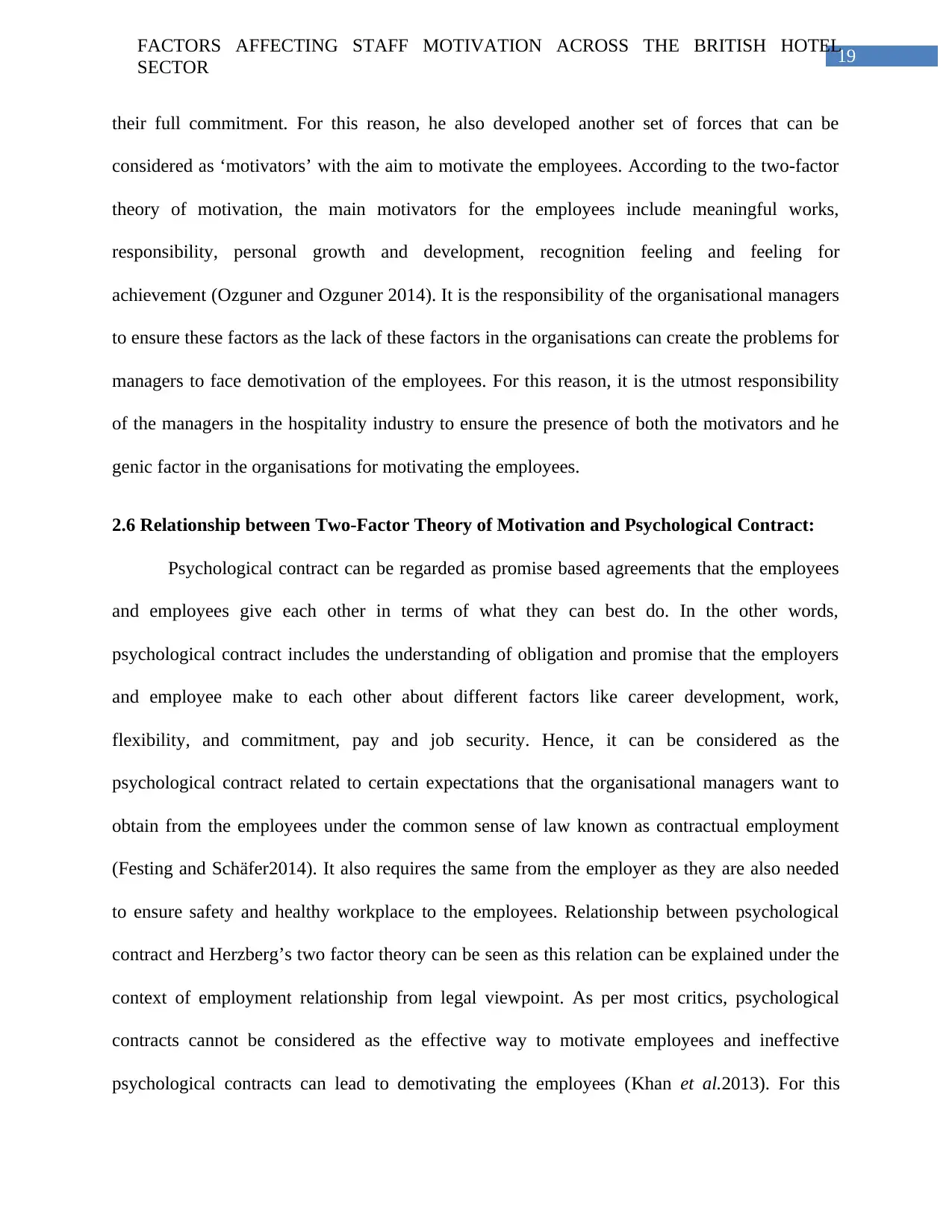
19
FACTORS AFFECTING STAFF MOTIVATION ACROSS THE BRITISH HOTEL
SECTOR
their full commitment. For this reason, he also developed another set of forces that can be
considered as ‘motivators’ with the aim to motivate the employees. According to the two-factor
theory of motivation, the main motivators for the employees include meaningful works,
responsibility, personal growth and development, recognition feeling and feeling for
achievement (Ozguner and Ozguner 2014). It is the responsibility of the organisational managers
to ensure these factors as the lack of these factors in the organisations can create the problems for
managers to face demotivation of the employees. For this reason, it is the utmost responsibility
of the managers in the hospitality industry to ensure the presence of both the motivators and he
genic factor in the organisations for motivating the employees.
2.6 Relationship between Two-Factor Theory of Motivation and Psychological Contract:
Psychological contract can be regarded as promise based agreements that the employees
and employees give each other in terms of what they can best do. In the other words,
psychological contract includes the understanding of obligation and promise that the employers
and employee make to each other about different factors like career development, work,
flexibility, and commitment, pay and job security. Hence, it can be considered as the
psychological contract related to certain expectations that the organisational managers want to
obtain from the employees under the common sense of law known as contractual employment
(Festing and Schäfer2014). It also requires the same from the employer as they are also needed
to ensure safety and healthy workplace to the employees. Relationship between psychological
contract and Herzberg’s two factor theory can be seen as this relation can be explained under the
context of employment relationship from legal viewpoint. As per most critics, psychological
contracts cannot be considered as the effective way to motivate employees and ineffective
psychological contracts can lead to demotivating the employees (Khan et al.2013). For this
FACTORS AFFECTING STAFF MOTIVATION ACROSS THE BRITISH HOTEL
SECTOR
their full commitment. For this reason, he also developed another set of forces that can be
considered as ‘motivators’ with the aim to motivate the employees. According to the two-factor
theory of motivation, the main motivators for the employees include meaningful works,
responsibility, personal growth and development, recognition feeling and feeling for
achievement (Ozguner and Ozguner 2014). It is the responsibility of the organisational managers
to ensure these factors as the lack of these factors in the organisations can create the problems for
managers to face demotivation of the employees. For this reason, it is the utmost responsibility
of the managers in the hospitality industry to ensure the presence of both the motivators and he
genic factor in the organisations for motivating the employees.
2.6 Relationship between Two-Factor Theory of Motivation and Psychological Contract:
Psychological contract can be regarded as promise based agreements that the employees
and employees give each other in terms of what they can best do. In the other words,
psychological contract includes the understanding of obligation and promise that the employers
and employee make to each other about different factors like career development, work,
flexibility, and commitment, pay and job security. Hence, it can be considered as the
psychological contract related to certain expectations that the organisational managers want to
obtain from the employees under the common sense of law known as contractual employment
(Festing and Schäfer2014). It also requires the same from the employer as they are also needed
to ensure safety and healthy workplace to the employees. Relationship between psychological
contract and Herzberg’s two factor theory can be seen as this relation can be explained under the
context of employment relationship from legal viewpoint. As per most critics, psychological
contracts cannot be considered as the effective way to motivate employees and ineffective
psychological contracts can lead to demotivating the employees (Khan et al.2013). For this
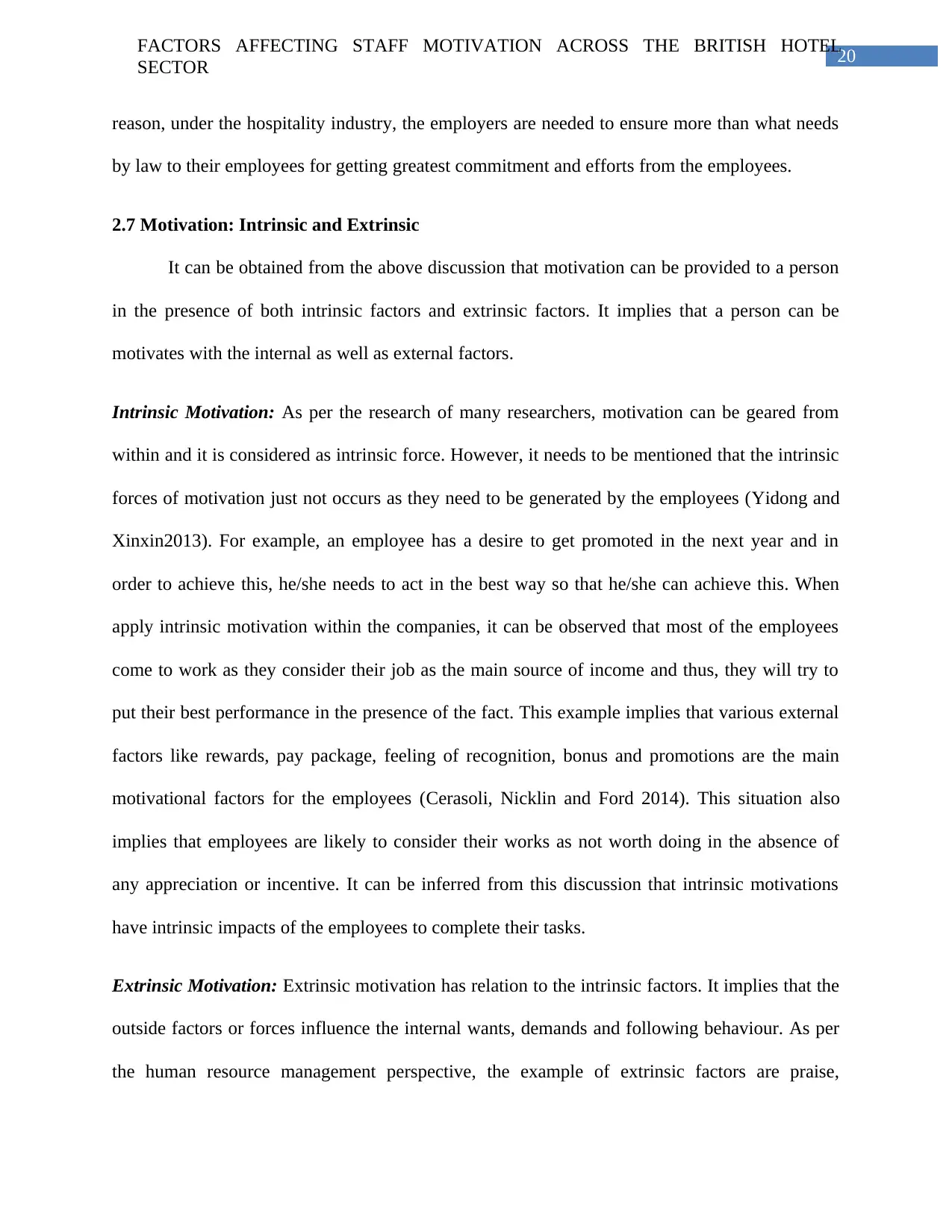
20
FACTORS AFFECTING STAFF MOTIVATION ACROSS THE BRITISH HOTEL
SECTOR
reason, under the hospitality industry, the employers are needed to ensure more than what needs
by law to their employees for getting greatest commitment and efforts from the employees.
2.7 Motivation: Intrinsic and Extrinsic
It can be obtained from the above discussion that motivation can be provided to a person
in the presence of both intrinsic factors and extrinsic factors. It implies that a person can be
motivates with the internal as well as external factors.
Intrinsic Motivation: As per the research of many researchers, motivation can be geared from
within and it is considered as intrinsic force. However, it needs to be mentioned that the intrinsic
forces of motivation just not occurs as they need to be generated by the employees (Yidong and
Xinxin2013). For example, an employee has a desire to get promoted in the next year and in
order to achieve this, he/she needs to act in the best way so that he/she can achieve this. When
apply intrinsic motivation within the companies, it can be observed that most of the employees
come to work as they consider their job as the main source of income and thus, they will try to
put their best performance in the presence of the fact. This example implies that various external
factors like rewards, pay package, feeling of recognition, bonus and promotions are the main
motivational factors for the employees (Cerasoli, Nicklin and Ford 2014). This situation also
implies that employees are likely to consider their works as not worth doing in the absence of
any appreciation or incentive. It can be inferred from this discussion that intrinsic motivations
have intrinsic impacts of the employees to complete their tasks.
Extrinsic Motivation: Extrinsic motivation has relation to the intrinsic factors. It implies that the
outside factors or forces influence the internal wants, demands and following behaviour. As per
the human resource management perspective, the example of extrinsic factors are praise,
FACTORS AFFECTING STAFF MOTIVATION ACROSS THE BRITISH HOTEL
SECTOR
reason, under the hospitality industry, the employers are needed to ensure more than what needs
by law to their employees for getting greatest commitment and efforts from the employees.
2.7 Motivation: Intrinsic and Extrinsic
It can be obtained from the above discussion that motivation can be provided to a person
in the presence of both intrinsic factors and extrinsic factors. It implies that a person can be
motivates with the internal as well as external factors.
Intrinsic Motivation: As per the research of many researchers, motivation can be geared from
within and it is considered as intrinsic force. However, it needs to be mentioned that the intrinsic
forces of motivation just not occurs as they need to be generated by the employees (Yidong and
Xinxin2013). For example, an employee has a desire to get promoted in the next year and in
order to achieve this, he/she needs to act in the best way so that he/she can achieve this. When
apply intrinsic motivation within the companies, it can be observed that most of the employees
come to work as they consider their job as the main source of income and thus, they will try to
put their best performance in the presence of the fact. This example implies that various external
factors like rewards, pay package, feeling of recognition, bonus and promotions are the main
motivational factors for the employees (Cerasoli, Nicklin and Ford 2014). This situation also
implies that employees are likely to consider their works as not worth doing in the absence of
any appreciation or incentive. It can be inferred from this discussion that intrinsic motivations
have intrinsic impacts of the employees to complete their tasks.
Extrinsic Motivation: Extrinsic motivation has relation to the intrinsic factors. It implies that the
outside factors or forces influence the internal wants, demands and following behaviour. As per
the human resource management perspective, the example of extrinsic factors are praise,
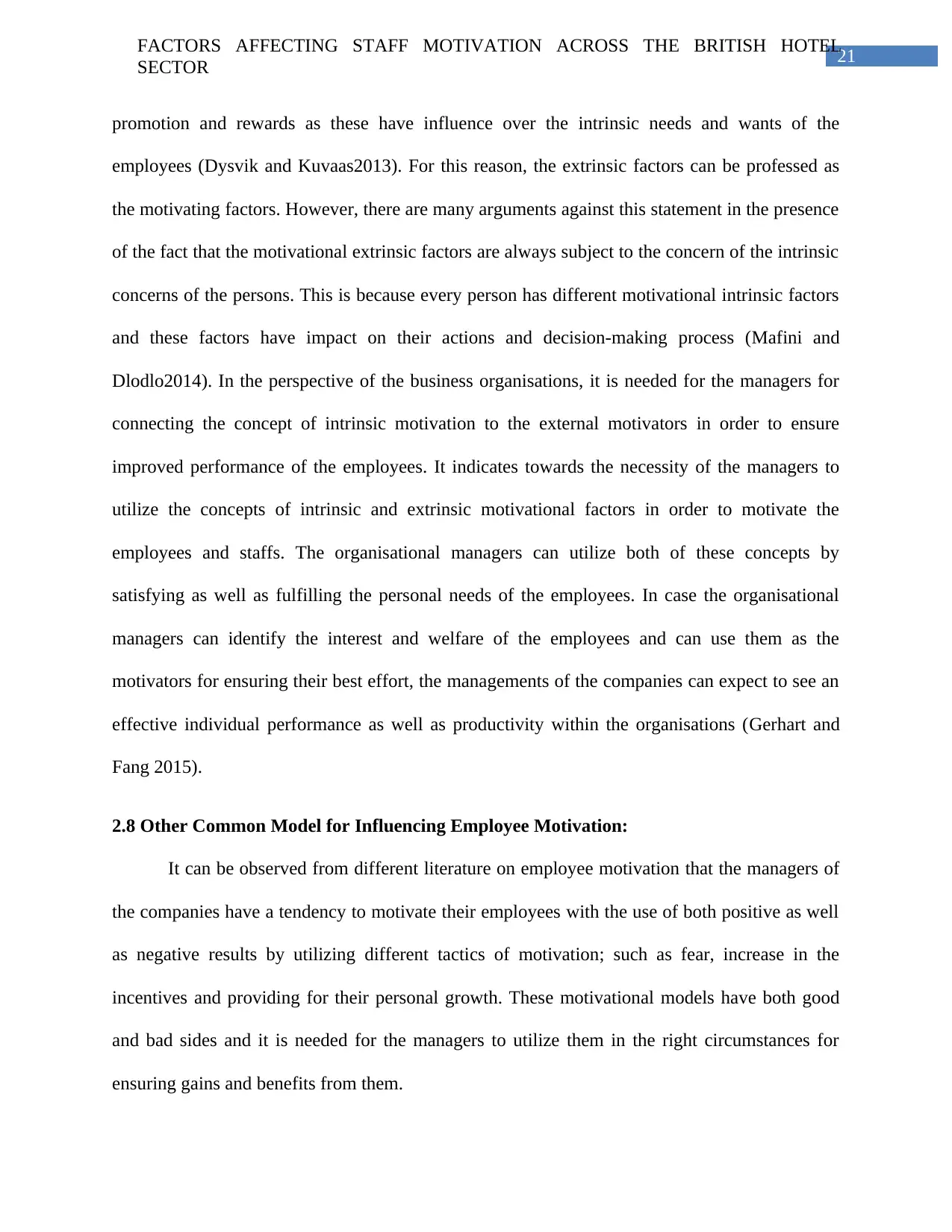
21
FACTORS AFFECTING STAFF MOTIVATION ACROSS THE BRITISH HOTEL
SECTOR
promotion and rewards as these have influence over the intrinsic needs and wants of the
employees (Dysvik and Kuvaas2013). For this reason, the extrinsic factors can be professed as
the motivating factors. However, there are many arguments against this statement in the presence
of the fact that the motivational extrinsic factors are always subject to the concern of the intrinsic
concerns of the persons. This is because every person has different motivational intrinsic factors
and these factors have impact on their actions and decision-making process (Mafini and
Dlodlo2014). In the perspective of the business organisations, it is needed for the managers for
connecting the concept of intrinsic motivation to the external motivators in order to ensure
improved performance of the employees. It indicates towards the necessity of the managers to
utilize the concepts of intrinsic and extrinsic motivational factors in order to motivate the
employees and staffs. The organisational managers can utilize both of these concepts by
satisfying as well as fulfilling the personal needs of the employees. In case the organisational
managers can identify the interest and welfare of the employees and can use them as the
motivators for ensuring their best effort, the managements of the companies can expect to see an
effective individual performance as well as productivity within the organisations (Gerhart and
Fang 2015).
2.8 Other Common Model for Influencing Employee Motivation:
It can be observed from different literature on employee motivation that the managers of
the companies have a tendency to motivate their employees with the use of both positive as well
as negative results by utilizing different tactics of motivation; such as fear, increase in the
incentives and providing for their personal growth. These motivational models have both good
and bad sides and it is needed for the managers to utilize them in the right circumstances for
ensuring gains and benefits from them.
FACTORS AFFECTING STAFF MOTIVATION ACROSS THE BRITISH HOTEL
SECTOR
promotion and rewards as these have influence over the intrinsic needs and wants of the
employees (Dysvik and Kuvaas2013). For this reason, the extrinsic factors can be professed as
the motivating factors. However, there are many arguments against this statement in the presence
of the fact that the motivational extrinsic factors are always subject to the concern of the intrinsic
concerns of the persons. This is because every person has different motivational intrinsic factors
and these factors have impact on their actions and decision-making process (Mafini and
Dlodlo2014). In the perspective of the business organisations, it is needed for the managers for
connecting the concept of intrinsic motivation to the external motivators in order to ensure
improved performance of the employees. It indicates towards the necessity of the managers to
utilize the concepts of intrinsic and extrinsic motivational factors in order to motivate the
employees and staffs. The organisational managers can utilize both of these concepts by
satisfying as well as fulfilling the personal needs of the employees. In case the organisational
managers can identify the interest and welfare of the employees and can use them as the
motivators for ensuring their best effort, the managements of the companies can expect to see an
effective individual performance as well as productivity within the organisations (Gerhart and
Fang 2015).
2.8 Other Common Model for Influencing Employee Motivation:
It can be observed from different literature on employee motivation that the managers of
the companies have a tendency to motivate their employees with the use of both positive as well
as negative results by utilizing different tactics of motivation; such as fear, increase in the
incentives and providing for their personal growth. These motivational models have both good
and bad sides and it is needed for the managers to utilize them in the right circumstances for
ensuring gains and benefits from them.
Secure Best Marks with AI Grader
Need help grading? Try our AI Grader for instant feedback on your assignments.
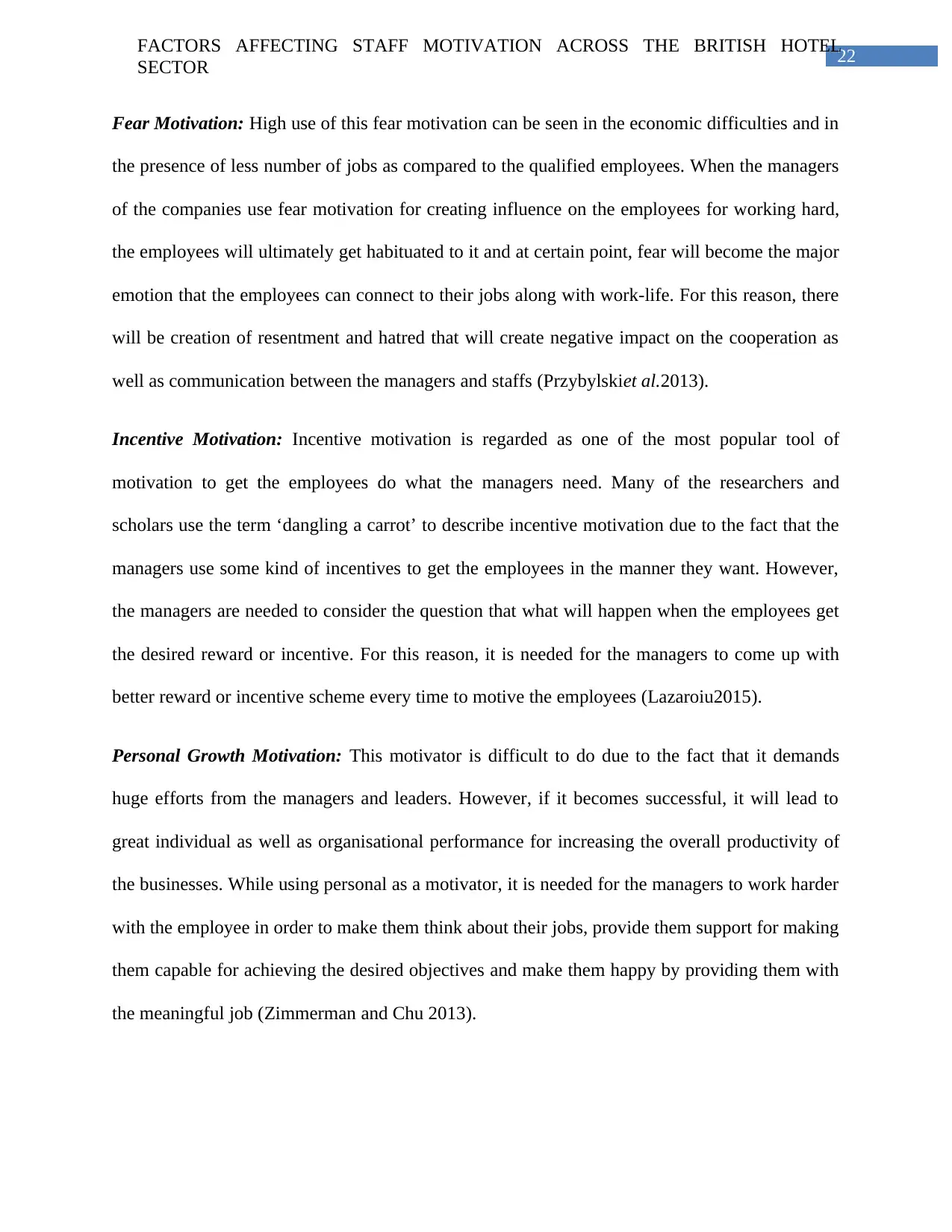
22
FACTORS AFFECTING STAFF MOTIVATION ACROSS THE BRITISH HOTEL
SECTOR
Fear Motivation: High use of this fear motivation can be seen in the economic difficulties and in
the presence of less number of jobs as compared to the qualified employees. When the managers
of the companies use fear motivation for creating influence on the employees for working hard,
the employees will ultimately get habituated to it and at certain point, fear will become the major
emotion that the employees can connect to their jobs along with work-life. For this reason, there
will be creation of resentment and hatred that will create negative impact on the cooperation as
well as communication between the managers and staffs (Przybylskiet al.2013).
Incentive Motivation: Incentive motivation is regarded as one of the most popular tool of
motivation to get the employees do what the managers need. Many of the researchers and
scholars use the term ‘dangling a carrot’ to describe incentive motivation due to the fact that the
managers use some kind of incentives to get the employees in the manner they want. However,
the managers are needed to consider the question that what will happen when the employees get
the desired reward or incentive. For this reason, it is needed for the managers to come up with
better reward or incentive scheme every time to motive the employees (Lazaroiu2015).
Personal Growth Motivation: This motivator is difficult to do due to the fact that it demands
huge efforts from the managers and leaders. However, if it becomes successful, it will lead to
great individual as well as organisational performance for increasing the overall productivity of
the businesses. While using personal as a motivator, it is needed for the managers to work harder
with the employee in order to make them think about their jobs, provide them support for making
them capable for achieving the desired objectives and make them happy by providing them with
the meaningful job (Zimmerman and Chu 2013).
FACTORS AFFECTING STAFF MOTIVATION ACROSS THE BRITISH HOTEL
SECTOR
Fear Motivation: High use of this fear motivation can be seen in the economic difficulties and in
the presence of less number of jobs as compared to the qualified employees. When the managers
of the companies use fear motivation for creating influence on the employees for working hard,
the employees will ultimately get habituated to it and at certain point, fear will become the major
emotion that the employees can connect to their jobs along with work-life. For this reason, there
will be creation of resentment and hatred that will create negative impact on the cooperation as
well as communication between the managers and staffs (Przybylskiet al.2013).
Incentive Motivation: Incentive motivation is regarded as one of the most popular tool of
motivation to get the employees do what the managers need. Many of the researchers and
scholars use the term ‘dangling a carrot’ to describe incentive motivation due to the fact that the
managers use some kind of incentives to get the employees in the manner they want. However,
the managers are needed to consider the question that what will happen when the employees get
the desired reward or incentive. For this reason, it is needed for the managers to come up with
better reward or incentive scheme every time to motive the employees (Lazaroiu2015).
Personal Growth Motivation: This motivator is difficult to do due to the fact that it demands
huge efforts from the managers and leaders. However, if it becomes successful, it will lead to
great individual as well as organisational performance for increasing the overall productivity of
the businesses. While using personal as a motivator, it is needed for the managers to work harder
with the employee in order to make them think about their jobs, provide them support for making
them capable for achieving the desired objectives and make them happy by providing them with
the meaningful job (Zimmerman and Chu 2013).
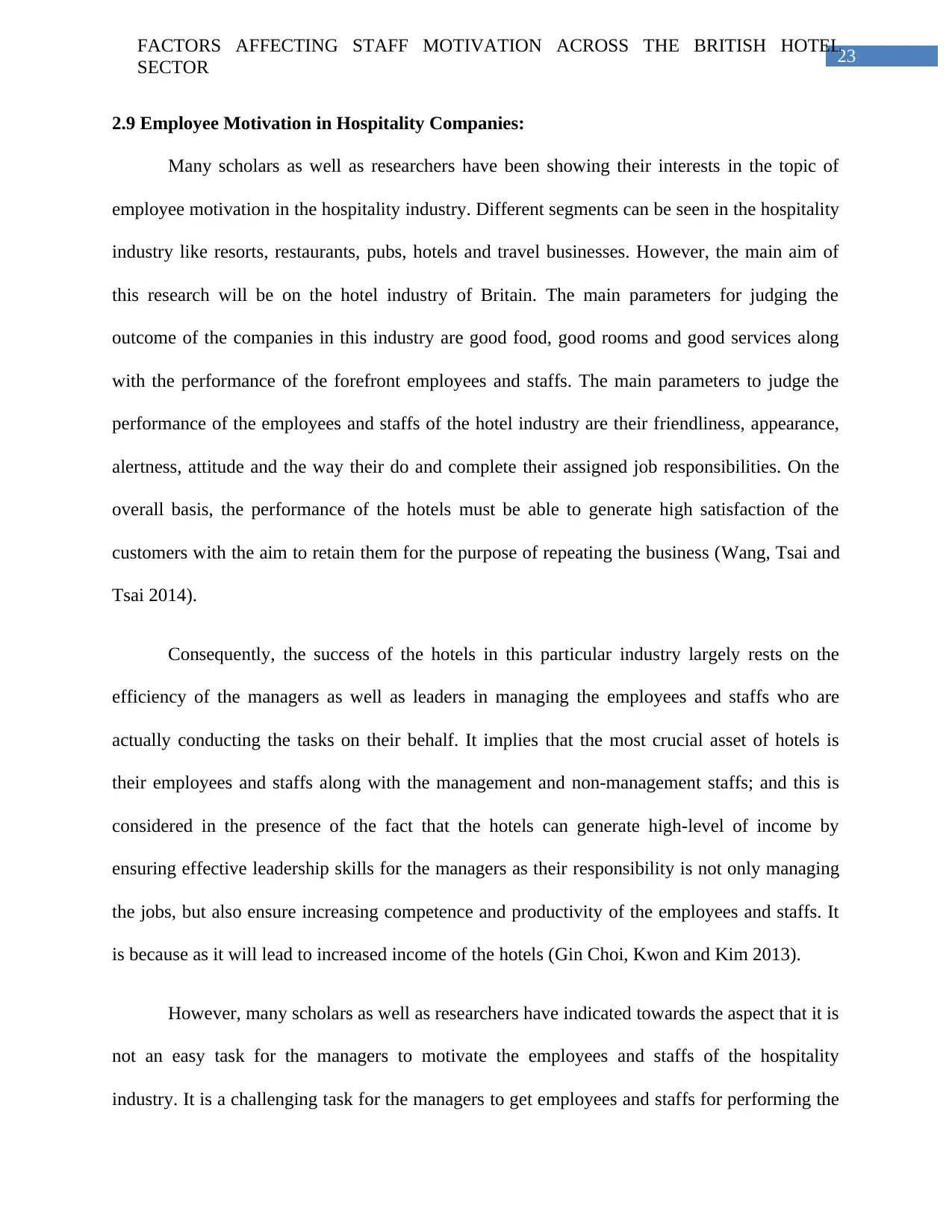
23
FACTORS AFFECTING STAFF MOTIVATION ACROSS THE BRITISH HOTEL
SECTOR
2.9 Employee Motivation in Hospitality Companies:
Many scholars as well as researchers have been showing their interests in the topic of
employee motivation in the hospitality industry. Different segments can be seen in the hospitality
industry like resorts, restaurants, pubs, hotels and travel businesses. However, the main aim of
this research will be on the hotel industry of Britain. The main parameters for judging the
outcome of the companies in this industry are good food, good rooms and good services along
with the performance of the forefront employees and staffs. The main parameters to judge the
performance of the employees and staffs of the hotel industry are their friendliness, appearance,
alertness, attitude and the way their do and complete their assigned job responsibilities. On the
overall basis, the performance of the hotels must be able to generate high satisfaction of the
customers with the aim to retain them for the purpose of repeating the business (Wang, Tsai and
Tsai 2014).
Consequently, the success of the hotels in this particular industry largely rests on the
efficiency of the managers as well as leaders in managing the employees and staffs who are
actually conducting the tasks on their behalf. It implies that the most crucial asset of hotels is
their employees and staffs along with the management and non-management staffs; and this is
considered in the presence of the fact that the hotels can generate high-level of income by
ensuring effective leadership skills for the managers as their responsibility is not only managing
the jobs, but also ensure increasing competence and productivity of the employees and staffs. It
is because as it will lead to increased income of the hotels (Gin Choi, Kwon and Kim 2013).
However, many scholars as well as researchers have indicated towards the aspect that it is
not an easy task for the managers to motivate the employees and staffs of the hospitality
industry. It is a challenging task for the managers to get employees and staffs for performing the
FACTORS AFFECTING STAFF MOTIVATION ACROSS THE BRITISH HOTEL
SECTOR
2.9 Employee Motivation in Hospitality Companies:
Many scholars as well as researchers have been showing their interests in the topic of
employee motivation in the hospitality industry. Different segments can be seen in the hospitality
industry like resorts, restaurants, pubs, hotels and travel businesses. However, the main aim of
this research will be on the hotel industry of Britain. The main parameters for judging the
outcome of the companies in this industry are good food, good rooms and good services along
with the performance of the forefront employees and staffs. The main parameters to judge the
performance of the employees and staffs of the hotel industry are their friendliness, appearance,
alertness, attitude and the way their do and complete their assigned job responsibilities. On the
overall basis, the performance of the hotels must be able to generate high satisfaction of the
customers with the aim to retain them for the purpose of repeating the business (Wang, Tsai and
Tsai 2014).
Consequently, the success of the hotels in this particular industry largely rests on the
efficiency of the managers as well as leaders in managing the employees and staffs who are
actually conducting the tasks on their behalf. It implies that the most crucial asset of hotels is
their employees and staffs along with the management and non-management staffs; and this is
considered in the presence of the fact that the hotels can generate high-level of income by
ensuring effective leadership skills for the managers as their responsibility is not only managing
the jobs, but also ensure increasing competence and productivity of the employees and staffs. It
is because as it will lead to increased income of the hotels (Gin Choi, Kwon and Kim 2013).
However, many scholars as well as researchers have indicated towards the aspect that it is
not an easy task for the managers to motivate the employees and staffs of the hospitality
industry. It is a challenging task for the managers to get employees and staffs for performing the
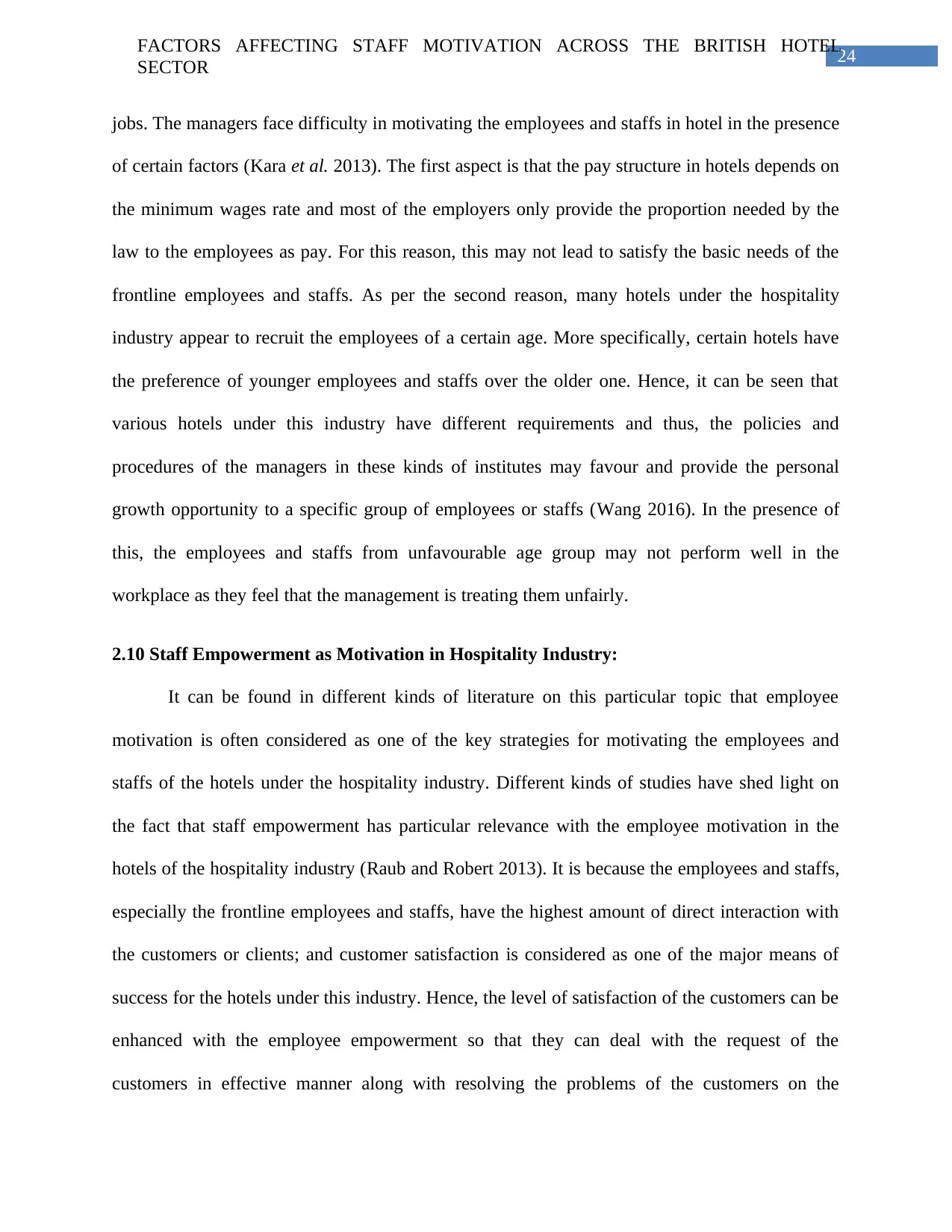
24
FACTORS AFFECTING STAFF MOTIVATION ACROSS THE BRITISH HOTEL
SECTOR
jobs. The managers face difficulty in motivating the employees and staffs in hotel in the presence
of certain factors (Kara et al. 2013). The first aspect is that the pay structure in hotels depends on
the minimum wages rate and most of the employers only provide the proportion needed by the
law to the employees as pay. For this reason, this may not lead to satisfy the basic needs of the
frontline employees and staffs. As per the second reason, many hotels under the hospitality
industry appear to recruit the employees of a certain age. More specifically, certain hotels have
the preference of younger employees and staffs over the older one. Hence, it can be seen that
various hotels under this industry have different requirements and thus, the policies and
procedures of the managers in these kinds of institutes may favour and provide the personal
growth opportunity to a specific group of employees or staffs (Wang 2016). In the presence of
this, the employees and staffs from unfavourable age group may not perform well in the
workplace as they feel that the management is treating them unfairly.
2.10 Staff Empowerment as Motivation in Hospitality Industry:
It can be found in different kinds of literature on this particular topic that employee
motivation is often considered as one of the key strategies for motivating the employees and
staffs of the hotels under the hospitality industry. Different kinds of studies have shed light on
the fact that staff empowerment has particular relevance with the employee motivation in the
hotels of the hospitality industry (Raub and Robert 2013). It is because the employees and staffs,
especially the frontline employees and staffs, have the highest amount of direct interaction with
the customers or clients; and customer satisfaction is considered as one of the major means of
success for the hotels under this industry. Hence, the level of satisfaction of the customers can be
enhanced with the employee empowerment so that they can deal with the request of the
customers in effective manner along with resolving the problems of the customers on the
FACTORS AFFECTING STAFF MOTIVATION ACROSS THE BRITISH HOTEL
SECTOR
jobs. The managers face difficulty in motivating the employees and staffs in hotel in the presence
of certain factors (Kara et al. 2013). The first aspect is that the pay structure in hotels depends on
the minimum wages rate and most of the employers only provide the proportion needed by the
law to the employees as pay. For this reason, this may not lead to satisfy the basic needs of the
frontline employees and staffs. As per the second reason, many hotels under the hospitality
industry appear to recruit the employees of a certain age. More specifically, certain hotels have
the preference of younger employees and staffs over the older one. Hence, it can be seen that
various hotels under this industry have different requirements and thus, the policies and
procedures of the managers in these kinds of institutes may favour and provide the personal
growth opportunity to a specific group of employees or staffs (Wang 2016). In the presence of
this, the employees and staffs from unfavourable age group may not perform well in the
workplace as they feel that the management is treating them unfairly.
2.10 Staff Empowerment as Motivation in Hospitality Industry:
It can be found in different kinds of literature on this particular topic that employee
motivation is often considered as one of the key strategies for motivating the employees and
staffs of the hotels under the hospitality industry. Different kinds of studies have shed light on
the fact that staff empowerment has particular relevance with the employee motivation in the
hotels of the hospitality industry (Raub and Robert 2013). It is because the employees and staffs,
especially the frontline employees and staffs, have the highest amount of direct interaction with
the customers or clients; and customer satisfaction is considered as one of the major means of
success for the hotels under this industry. Hence, the level of satisfaction of the customers can be
enhanced with the employee empowerment so that they can deal with the request of the
customers in effective manner along with resolving the problems of the customers on the
Paraphrase This Document
Need a fresh take? Get an instant paraphrase of this document with our AI Paraphraser
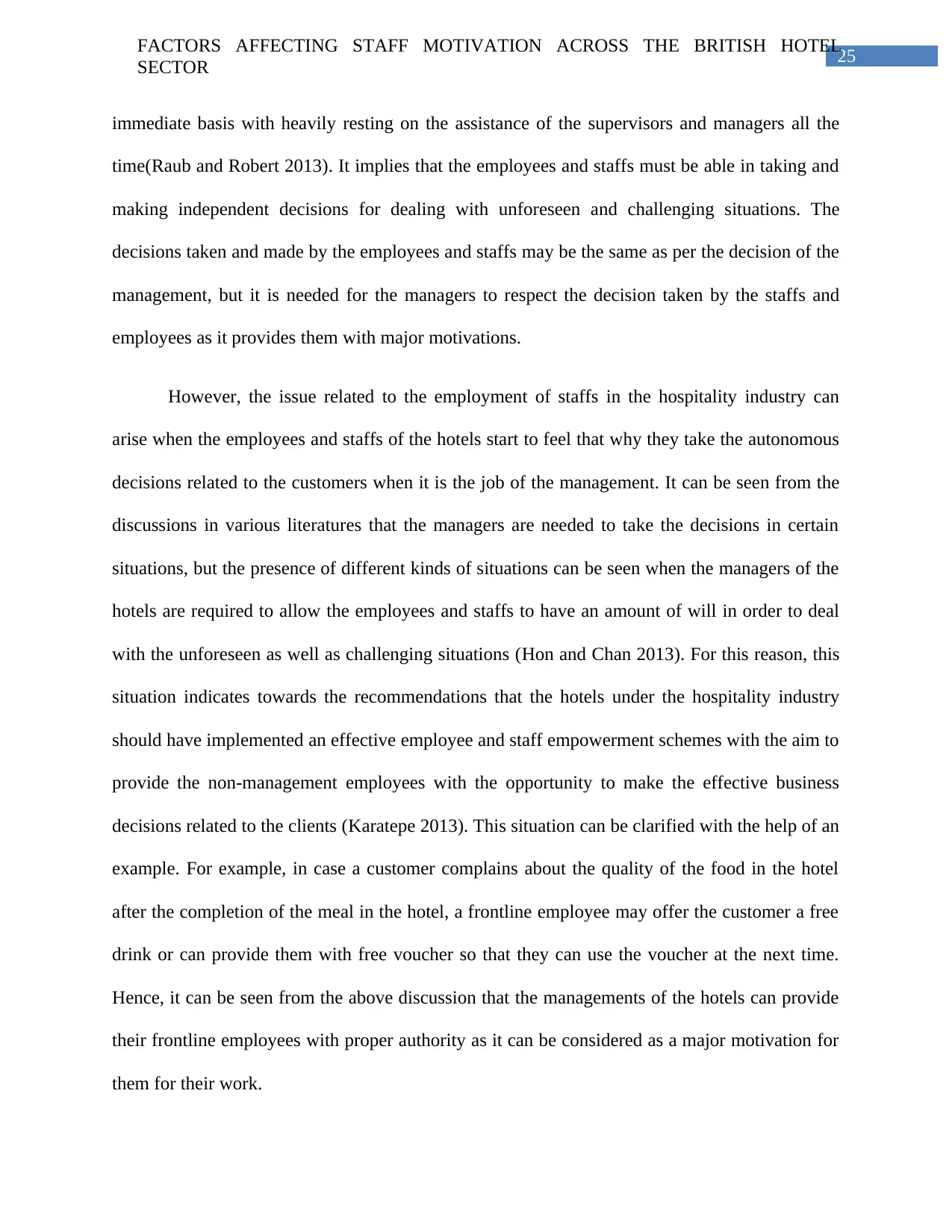
25
FACTORS AFFECTING STAFF MOTIVATION ACROSS THE BRITISH HOTEL
SECTOR
immediate basis with heavily resting on the assistance of the supervisors and managers all the
time(Raub and Robert 2013). It implies that the employees and staffs must be able in taking and
making independent decisions for dealing with unforeseen and challenging situations. The
decisions taken and made by the employees and staffs may be the same as per the decision of the
management, but it is needed for the managers to respect the decision taken by the staffs and
employees as it provides them with major motivations.
However, the issue related to the employment of staffs in the hospitality industry can
arise when the employees and staffs of the hotels start to feel that why they take the autonomous
decisions related to the customers when it is the job of the management. It can be seen from the
discussions in various literatures that the managers are needed to take the decisions in certain
situations, but the presence of different kinds of situations can be seen when the managers of the
hotels are required to allow the employees and staffs to have an amount of will in order to deal
with the unforeseen as well as challenging situations (Hon and Chan 2013). For this reason, this
situation indicates towards the recommendations that the hotels under the hospitality industry
should have implemented an effective employee and staff empowerment schemes with the aim to
provide the non-management employees with the opportunity to make the effective business
decisions related to the clients (Karatepe 2013). This situation can be clarified with the help of an
example. For example, in case a customer complains about the quality of the food in the hotel
after the completion of the meal in the hotel, a frontline employee may offer the customer a free
drink or can provide them with free voucher so that they can use the voucher at the next time.
Hence, it can be seen from the above discussion that the managements of the hotels can provide
their frontline employees with proper authority as it can be considered as a major motivation for
them for their work.
FACTORS AFFECTING STAFF MOTIVATION ACROSS THE BRITISH HOTEL
SECTOR
immediate basis with heavily resting on the assistance of the supervisors and managers all the
time(Raub and Robert 2013). It implies that the employees and staffs must be able in taking and
making independent decisions for dealing with unforeseen and challenging situations. The
decisions taken and made by the employees and staffs may be the same as per the decision of the
management, but it is needed for the managers to respect the decision taken by the staffs and
employees as it provides them with major motivations.
However, the issue related to the employment of staffs in the hospitality industry can
arise when the employees and staffs of the hotels start to feel that why they take the autonomous
decisions related to the customers when it is the job of the management. It can be seen from the
discussions in various literatures that the managers are needed to take the decisions in certain
situations, but the presence of different kinds of situations can be seen when the managers of the
hotels are required to allow the employees and staffs to have an amount of will in order to deal
with the unforeseen as well as challenging situations (Hon and Chan 2013). For this reason, this
situation indicates towards the recommendations that the hotels under the hospitality industry
should have implemented an effective employee and staff empowerment schemes with the aim to
provide the non-management employees with the opportunity to make the effective business
decisions related to the clients (Karatepe 2013). This situation can be clarified with the help of an
example. For example, in case a customer complains about the quality of the food in the hotel
after the completion of the meal in the hotel, a frontline employee may offer the customer a free
drink or can provide them with free voucher so that they can use the voucher at the next time.
Hence, it can be seen from the above discussion that the managements of the hotels can provide
their frontline employees with proper authority as it can be considered as a major motivation for
them for their work.
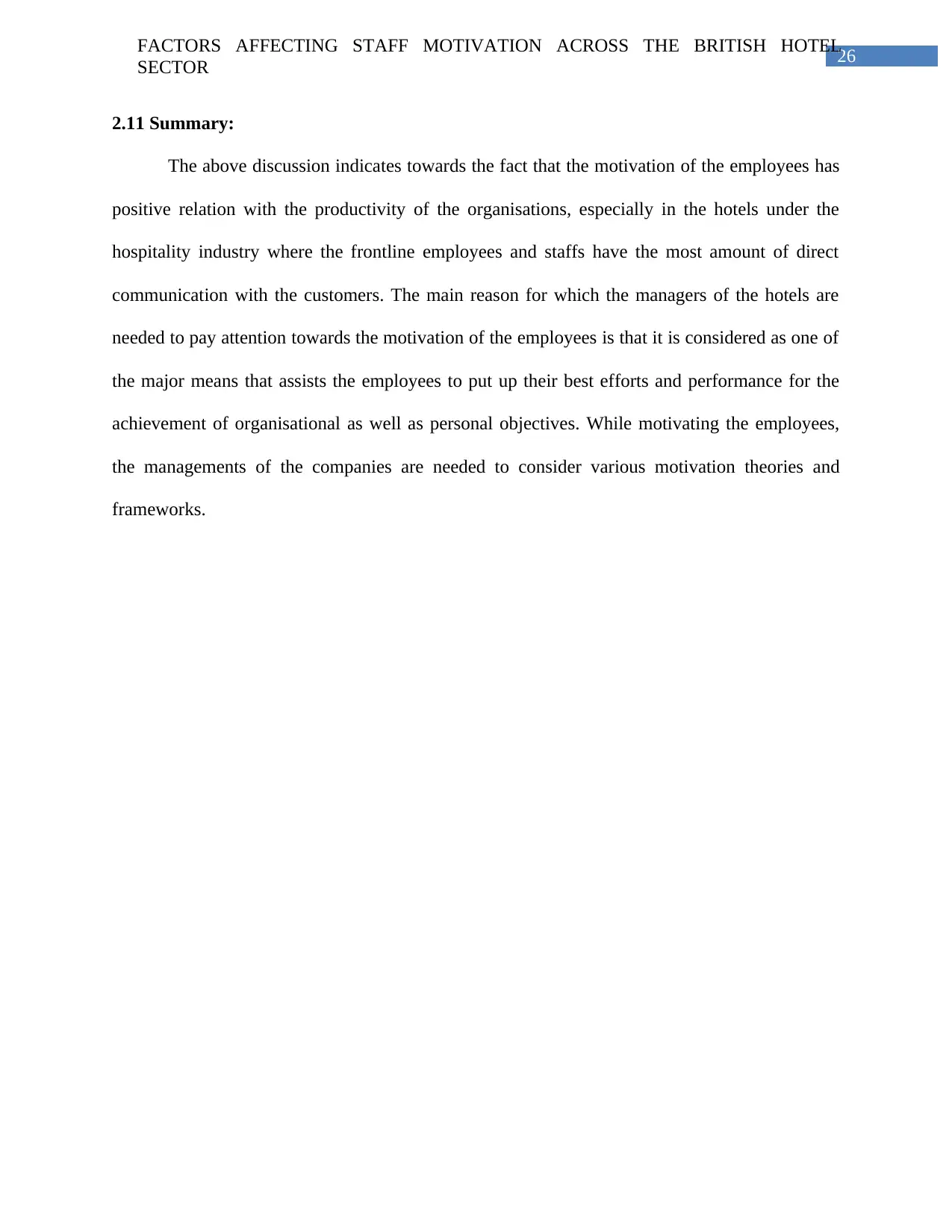
26
FACTORS AFFECTING STAFF MOTIVATION ACROSS THE BRITISH HOTEL
SECTOR
2.11 Summary:
The above discussion indicates towards the fact that the motivation of the employees has
positive relation with the productivity of the organisations, especially in the hotels under the
hospitality industry where the frontline employees and staffs have the most amount of direct
communication with the customers. The main reason for which the managers of the hotels are
needed to pay attention towards the motivation of the employees is that it is considered as one of
the major means that assists the employees to put up their best efforts and performance for the
achievement of organisational as well as personal objectives. While motivating the employees,
the managements of the companies are needed to consider various motivation theories and
frameworks.
FACTORS AFFECTING STAFF MOTIVATION ACROSS THE BRITISH HOTEL
SECTOR
2.11 Summary:
The above discussion indicates towards the fact that the motivation of the employees has
positive relation with the productivity of the organisations, especially in the hotels under the
hospitality industry where the frontline employees and staffs have the most amount of direct
communication with the customers. The main reason for which the managers of the hotels are
needed to pay attention towards the motivation of the employees is that it is considered as one of
the major means that assists the employees to put up their best efforts and performance for the
achievement of organisational as well as personal objectives. While motivating the employees,
the managements of the companies are needed to consider various motivation theories and
frameworks.
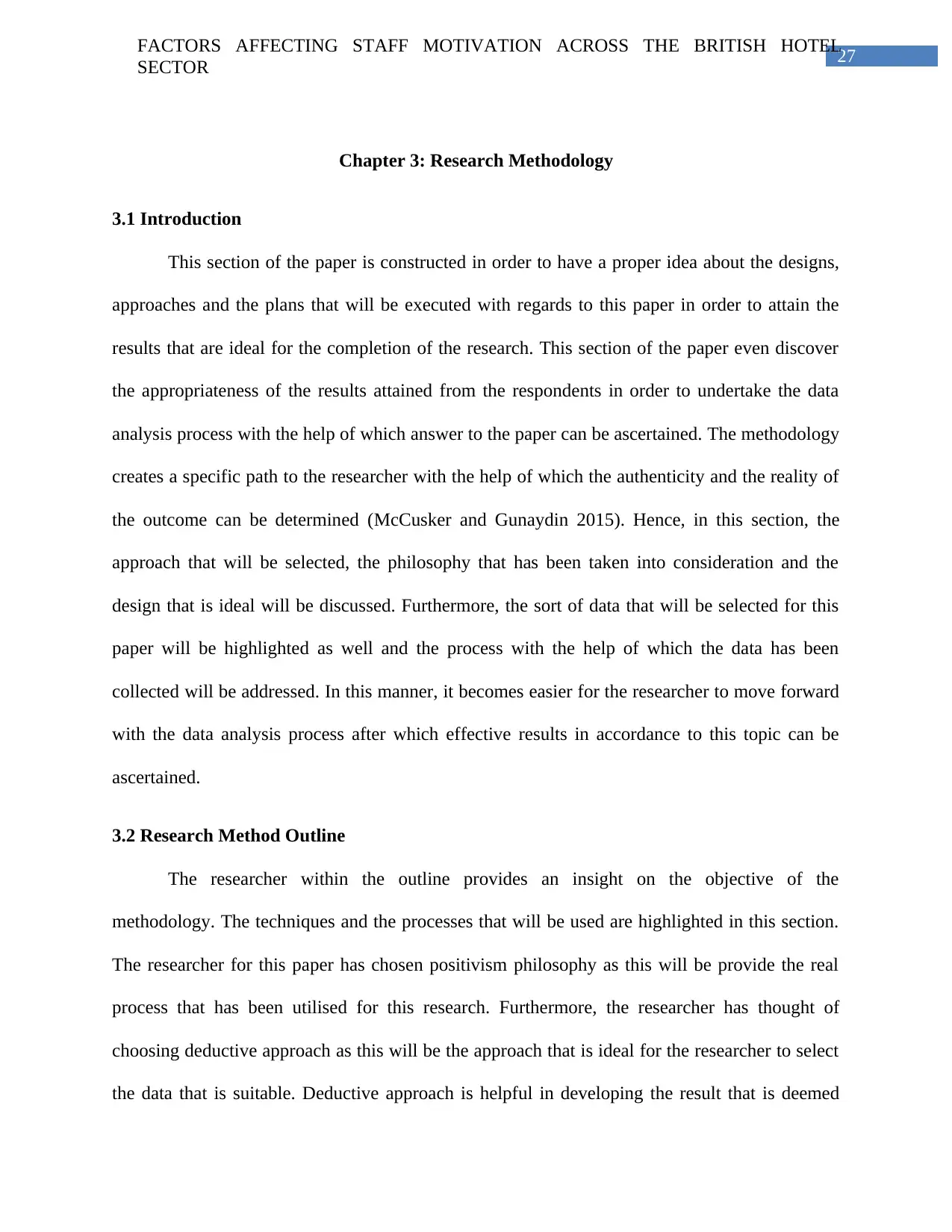
27
FACTORS AFFECTING STAFF MOTIVATION ACROSS THE BRITISH HOTEL
SECTOR
Chapter 3: Research Methodology
3.1 Introduction
This section of the paper is constructed in order to have a proper idea about the designs,
approaches and the plans that will be executed with regards to this paper in order to attain the
results that are ideal for the completion of the research. This section of the paper even discover
the appropriateness of the results attained from the respondents in order to undertake the data
analysis process with the help of which answer to the paper can be ascertained. The methodology
creates a specific path to the researcher with the help of which the authenticity and the reality of
the outcome can be determined (McCusker and Gunaydin 2015). Hence, in this section, the
approach that will be selected, the philosophy that has been taken into consideration and the
design that is ideal will be discussed. Furthermore, the sort of data that will be selected for this
paper will be highlighted as well and the process with the help of which the data has been
collected will be addressed. In this manner, it becomes easier for the researcher to move forward
with the data analysis process after which effective results in accordance to this topic can be
ascertained.
3.2 Research Method Outline
The researcher within the outline provides an insight on the objective of the
methodology. The techniques and the processes that will be used are highlighted in this section.
The researcher for this paper has chosen positivism philosophy as this will be provide the real
process that has been utilised for this research. Furthermore, the researcher has thought of
choosing deductive approach as this will be the approach that is ideal for the researcher to select
the data that is suitable. Deductive approach is helpful in developing the result that is deemed
FACTORS AFFECTING STAFF MOTIVATION ACROSS THE BRITISH HOTEL
SECTOR
Chapter 3: Research Methodology
3.1 Introduction
This section of the paper is constructed in order to have a proper idea about the designs,
approaches and the plans that will be executed with regards to this paper in order to attain the
results that are ideal for the completion of the research. This section of the paper even discover
the appropriateness of the results attained from the respondents in order to undertake the data
analysis process with the help of which answer to the paper can be ascertained. The methodology
creates a specific path to the researcher with the help of which the authenticity and the reality of
the outcome can be determined (McCusker and Gunaydin 2015). Hence, in this section, the
approach that will be selected, the philosophy that has been taken into consideration and the
design that is ideal will be discussed. Furthermore, the sort of data that will be selected for this
paper will be highlighted as well and the process with the help of which the data has been
collected will be addressed. In this manner, it becomes easier for the researcher to move forward
with the data analysis process after which effective results in accordance to this topic can be
ascertained.
3.2 Research Method Outline
The researcher within the outline provides an insight on the objective of the
methodology. The techniques and the processes that will be used are highlighted in this section.
The researcher for this paper has chosen positivism philosophy as this will be provide the real
process that has been utilised for this research. Furthermore, the researcher has thought of
choosing deductive approach as this will be the approach that is ideal for the researcher to select
the data that is suitable. Deductive approach is helpful in developing the result that is deemed
Secure Best Marks with AI Grader
Need help grading? Try our AI Grader for instant feedback on your assignments.
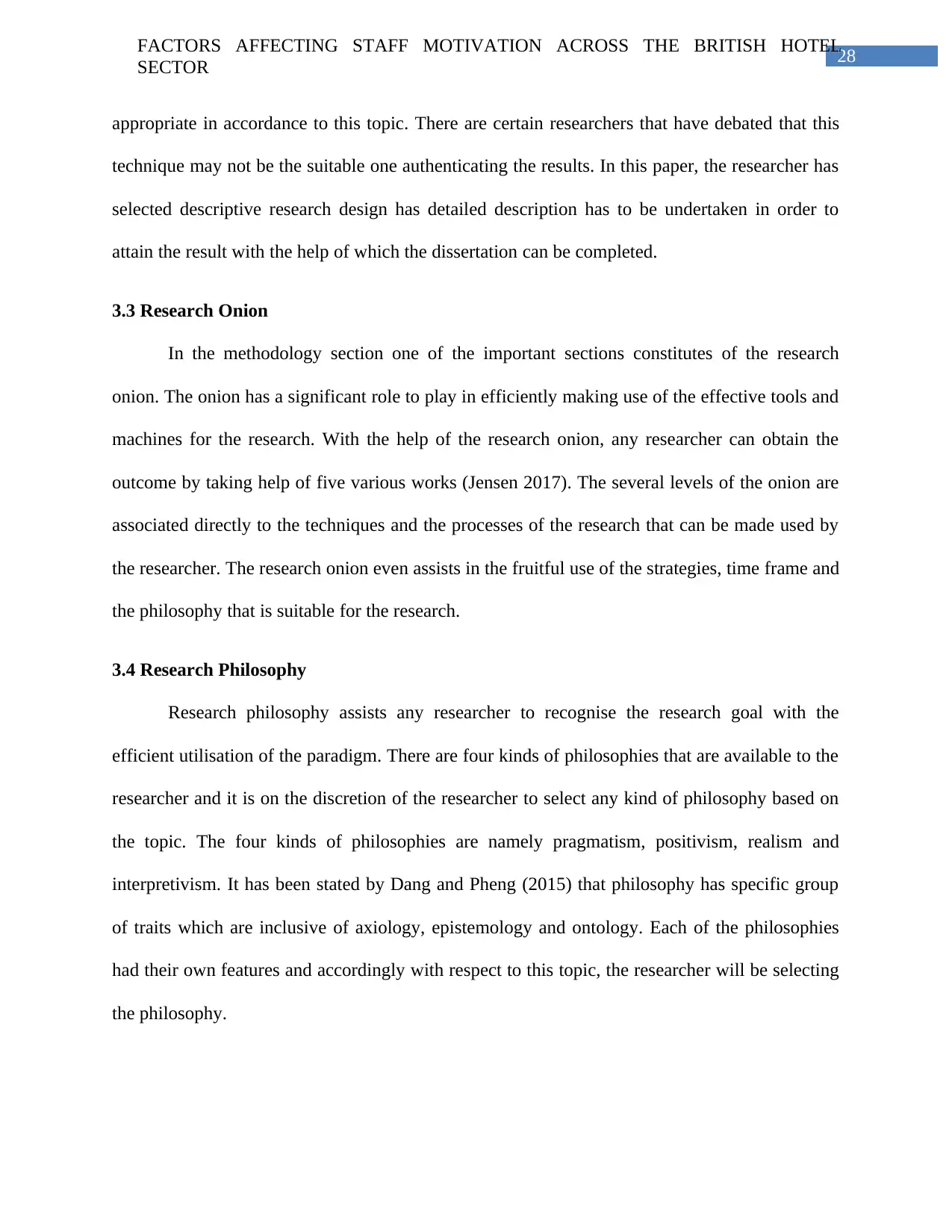
28
FACTORS AFFECTING STAFF MOTIVATION ACROSS THE BRITISH HOTEL
SECTOR
appropriate in accordance to this topic. There are certain researchers that have debated that this
technique may not be the suitable one authenticating the results. In this paper, the researcher has
selected descriptive research design has detailed description has to be undertaken in order to
attain the result with the help of which the dissertation can be completed.
3.3 Research Onion
In the methodology section one of the important sections constitutes of the research
onion. The onion has a significant role to play in efficiently making use of the effective tools and
machines for the research. With the help of the research onion, any researcher can obtain the
outcome by taking help of five various works (Jensen 2017). The several levels of the onion are
associated directly to the techniques and the processes of the research that can be made used by
the researcher. The research onion even assists in the fruitful use of the strategies, time frame and
the philosophy that is suitable for the research.
3.4 Research Philosophy
Research philosophy assists any researcher to recognise the research goal with the
efficient utilisation of the paradigm. There are four kinds of philosophies that are available to the
researcher and it is on the discretion of the researcher to select any kind of philosophy based on
the topic. The four kinds of philosophies are namely pragmatism, positivism, realism and
interpretivism. It has been stated by Dang and Pheng (2015) that philosophy has specific group
of traits which are inclusive of axiology, epistemology and ontology. Each of the philosophies
had their own features and accordingly with respect to this topic, the researcher will be selecting
the philosophy.
FACTORS AFFECTING STAFF MOTIVATION ACROSS THE BRITISH HOTEL
SECTOR
appropriate in accordance to this topic. There are certain researchers that have debated that this
technique may not be the suitable one authenticating the results. In this paper, the researcher has
selected descriptive research design has detailed description has to be undertaken in order to
attain the result with the help of which the dissertation can be completed.
3.3 Research Onion
In the methodology section one of the important sections constitutes of the research
onion. The onion has a significant role to play in efficiently making use of the effective tools and
machines for the research. With the help of the research onion, any researcher can obtain the
outcome by taking help of five various works (Jensen 2017). The several levels of the onion are
associated directly to the techniques and the processes of the research that can be made used by
the researcher. The research onion even assists in the fruitful use of the strategies, time frame and
the philosophy that is suitable for the research.
3.4 Research Philosophy
Research philosophy assists any researcher to recognise the research goal with the
efficient utilisation of the paradigm. There are four kinds of philosophies that are available to the
researcher and it is on the discretion of the researcher to select any kind of philosophy based on
the topic. The four kinds of philosophies are namely pragmatism, positivism, realism and
interpretivism. It has been stated by Dang and Pheng (2015) that philosophy has specific group
of traits which are inclusive of axiology, epistemology and ontology. Each of the philosophies
had their own features and accordingly with respect to this topic, the researcher will be selecting
the philosophy.
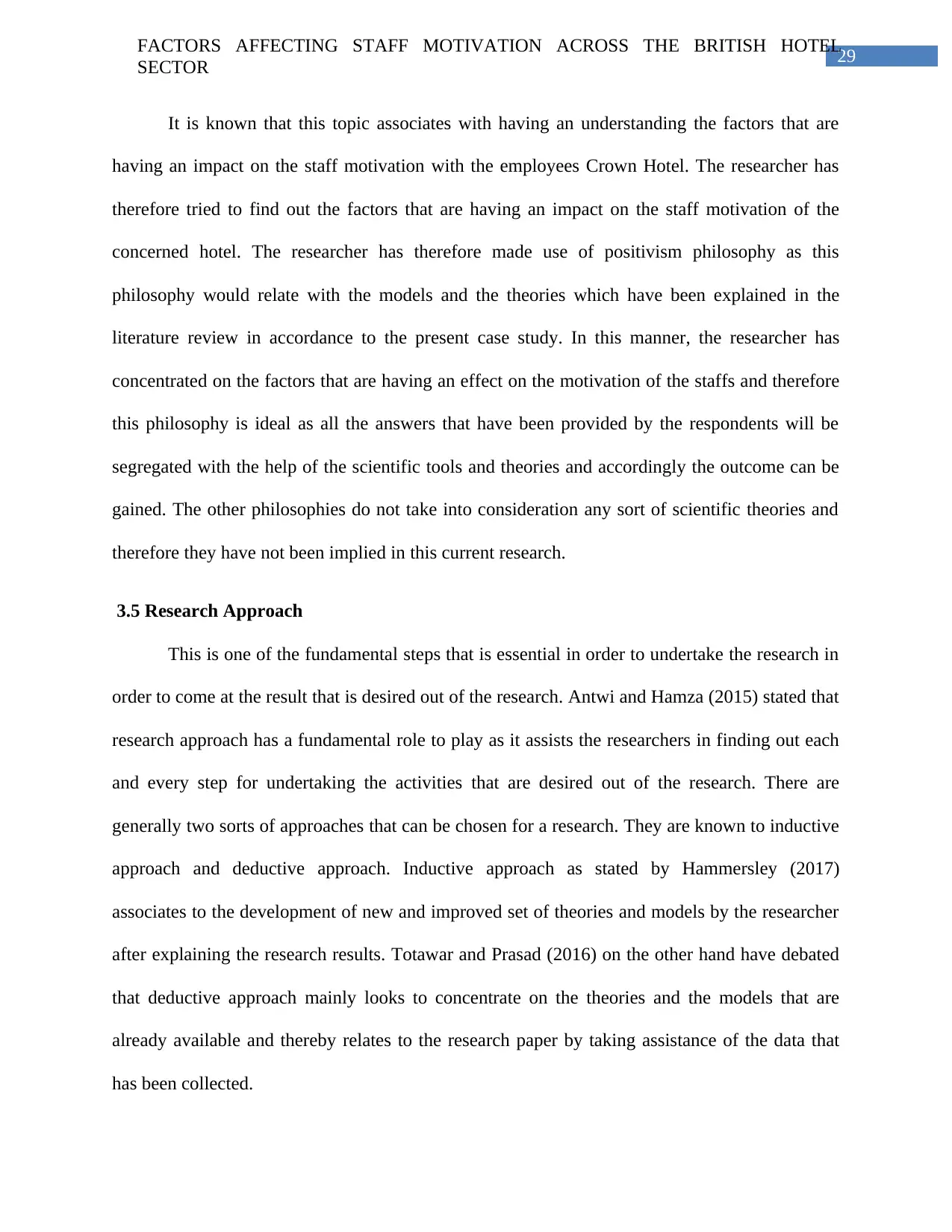
29
FACTORS AFFECTING STAFF MOTIVATION ACROSS THE BRITISH HOTEL
SECTOR
It is known that this topic associates with having an understanding the factors that are
having an impact on the staff motivation with the employees Crown Hotel. The researcher has
therefore tried to find out the factors that are having an impact on the staff motivation of the
concerned hotel. The researcher has therefore made use of positivism philosophy as this
philosophy would relate with the models and the theories which have been explained in the
literature review in accordance to the present case study. In this manner, the researcher has
concentrated on the factors that are having an effect on the motivation of the staffs and therefore
this philosophy is ideal as all the answers that have been provided by the respondents will be
segregated with the help of the scientific tools and theories and accordingly the outcome can be
gained. The other philosophies do not take into consideration any sort of scientific theories and
therefore they have not been implied in this current research.
3.5 Research Approach
This is one of the fundamental steps that is essential in order to undertake the research in
order to come at the result that is desired out of the research. Antwi and Hamza (2015) stated that
research approach has a fundamental role to play as it assists the researchers in finding out each
and every step for undertaking the activities that are desired out of the research. There are
generally two sorts of approaches that can be chosen for a research. They are known to inductive
approach and deductive approach. Inductive approach as stated by Hammersley (2017)
associates to the development of new and improved set of theories and models by the researcher
after explaining the research results. Totawar and Prasad (2016) on the other hand have debated
that deductive approach mainly looks to concentrate on the theories and the models that are
already available and thereby relates to the research paper by taking assistance of the data that
has been collected.
FACTORS AFFECTING STAFF MOTIVATION ACROSS THE BRITISH HOTEL
SECTOR
It is known that this topic associates with having an understanding the factors that are
having an impact on the staff motivation with the employees Crown Hotel. The researcher has
therefore tried to find out the factors that are having an impact on the staff motivation of the
concerned hotel. The researcher has therefore made use of positivism philosophy as this
philosophy would relate with the models and the theories which have been explained in the
literature review in accordance to the present case study. In this manner, the researcher has
concentrated on the factors that are having an effect on the motivation of the staffs and therefore
this philosophy is ideal as all the answers that have been provided by the respondents will be
segregated with the help of the scientific tools and theories and accordingly the outcome can be
gained. The other philosophies do not take into consideration any sort of scientific theories and
therefore they have not been implied in this current research.
3.5 Research Approach
This is one of the fundamental steps that is essential in order to undertake the research in
order to come at the result that is desired out of the research. Antwi and Hamza (2015) stated that
research approach has a fundamental role to play as it assists the researchers in finding out each
and every step for undertaking the activities that are desired out of the research. There are
generally two sorts of approaches that can be chosen for a research. They are known to inductive
approach and deductive approach. Inductive approach as stated by Hammersley (2017)
associates to the development of new and improved set of theories and models by the researcher
after explaining the research results. Totawar and Prasad (2016) on the other hand have debated
that deductive approach mainly looks to concentrate on the theories and the models that are
already available and thereby relates to the research paper by taking assistance of the data that
has been collected.
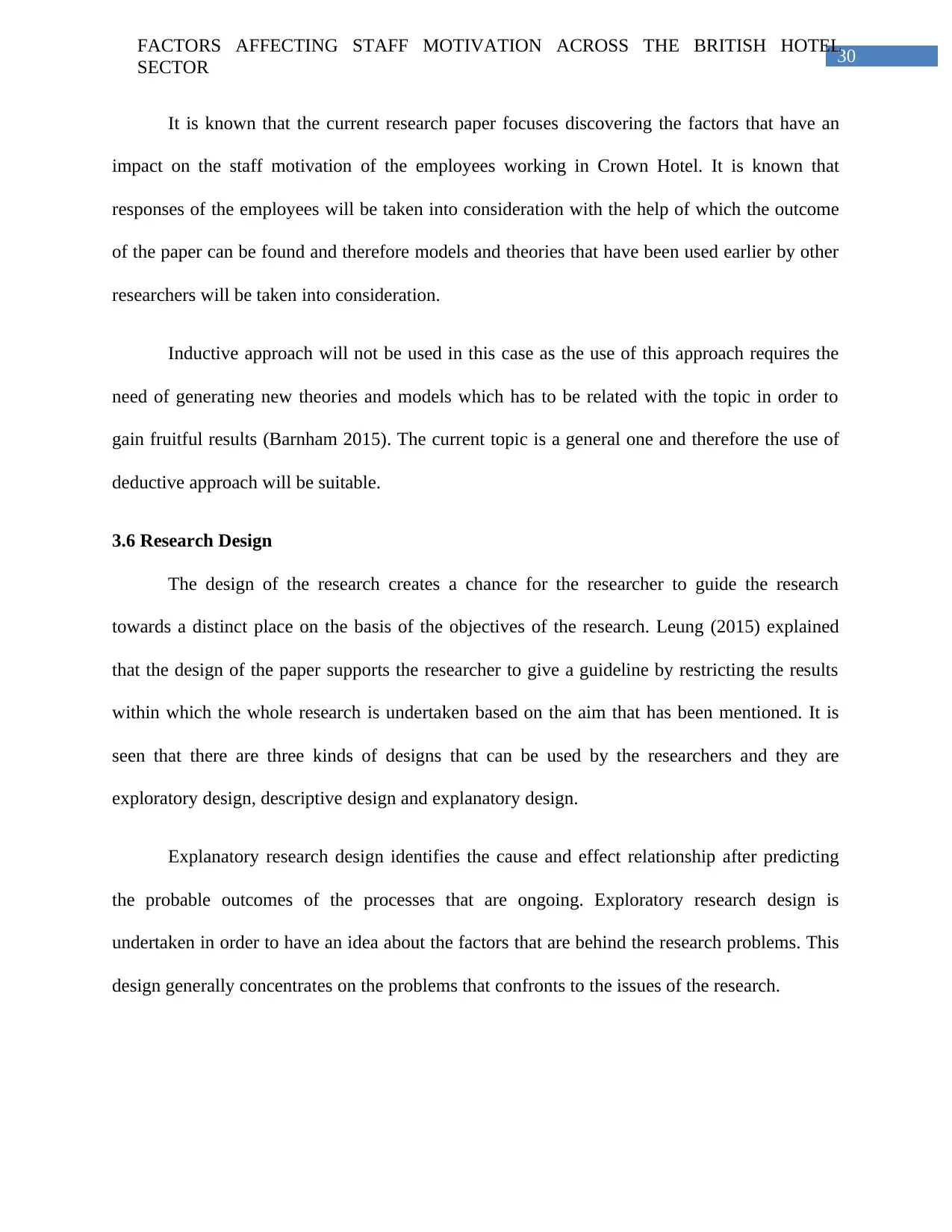
30
FACTORS AFFECTING STAFF MOTIVATION ACROSS THE BRITISH HOTEL
SECTOR
It is known that the current research paper focuses discovering the factors that have an
impact on the staff motivation of the employees working in Crown Hotel. It is known that
responses of the employees will be taken into consideration with the help of which the outcome
of the paper can be found and therefore models and theories that have been used earlier by other
researchers will be taken into consideration.
Inductive approach will not be used in this case as the use of this approach requires the
need of generating new theories and models which has to be related with the topic in order to
gain fruitful results (Barnham 2015). The current topic is a general one and therefore the use of
deductive approach will be suitable.
3.6 Research Design
The design of the research creates a chance for the researcher to guide the research
towards a distinct place on the basis of the objectives of the research. Leung (2015) explained
that the design of the paper supports the researcher to give a guideline by restricting the results
within which the whole research is undertaken based on the aim that has been mentioned. It is
seen that there are three kinds of designs that can be used by the researchers and they are
exploratory design, descriptive design and explanatory design.
Explanatory research design identifies the cause and effect relationship after predicting
the probable outcomes of the processes that are ongoing. Exploratory research design is
undertaken in order to have an idea about the factors that are behind the research problems. This
design generally concentrates on the problems that confronts to the issues of the research.
FACTORS AFFECTING STAFF MOTIVATION ACROSS THE BRITISH HOTEL
SECTOR
It is known that the current research paper focuses discovering the factors that have an
impact on the staff motivation of the employees working in Crown Hotel. It is known that
responses of the employees will be taken into consideration with the help of which the outcome
of the paper can be found and therefore models and theories that have been used earlier by other
researchers will be taken into consideration.
Inductive approach will not be used in this case as the use of this approach requires the
need of generating new theories and models which has to be related with the topic in order to
gain fruitful results (Barnham 2015). The current topic is a general one and therefore the use of
deductive approach will be suitable.
3.6 Research Design
The design of the research creates a chance for the researcher to guide the research
towards a distinct place on the basis of the objectives of the research. Leung (2015) explained
that the design of the paper supports the researcher to give a guideline by restricting the results
within which the whole research is undertaken based on the aim that has been mentioned. It is
seen that there are three kinds of designs that can be used by the researchers and they are
exploratory design, descriptive design and explanatory design.
Explanatory research design identifies the cause and effect relationship after predicting
the probable outcomes of the processes that are ongoing. Exploratory research design is
undertaken in order to have an idea about the factors that are behind the research problems. This
design generally concentrates on the problems that confronts to the issues of the research.
Paraphrase This Document
Need a fresh take? Get an instant paraphrase of this document with our AI Paraphraser
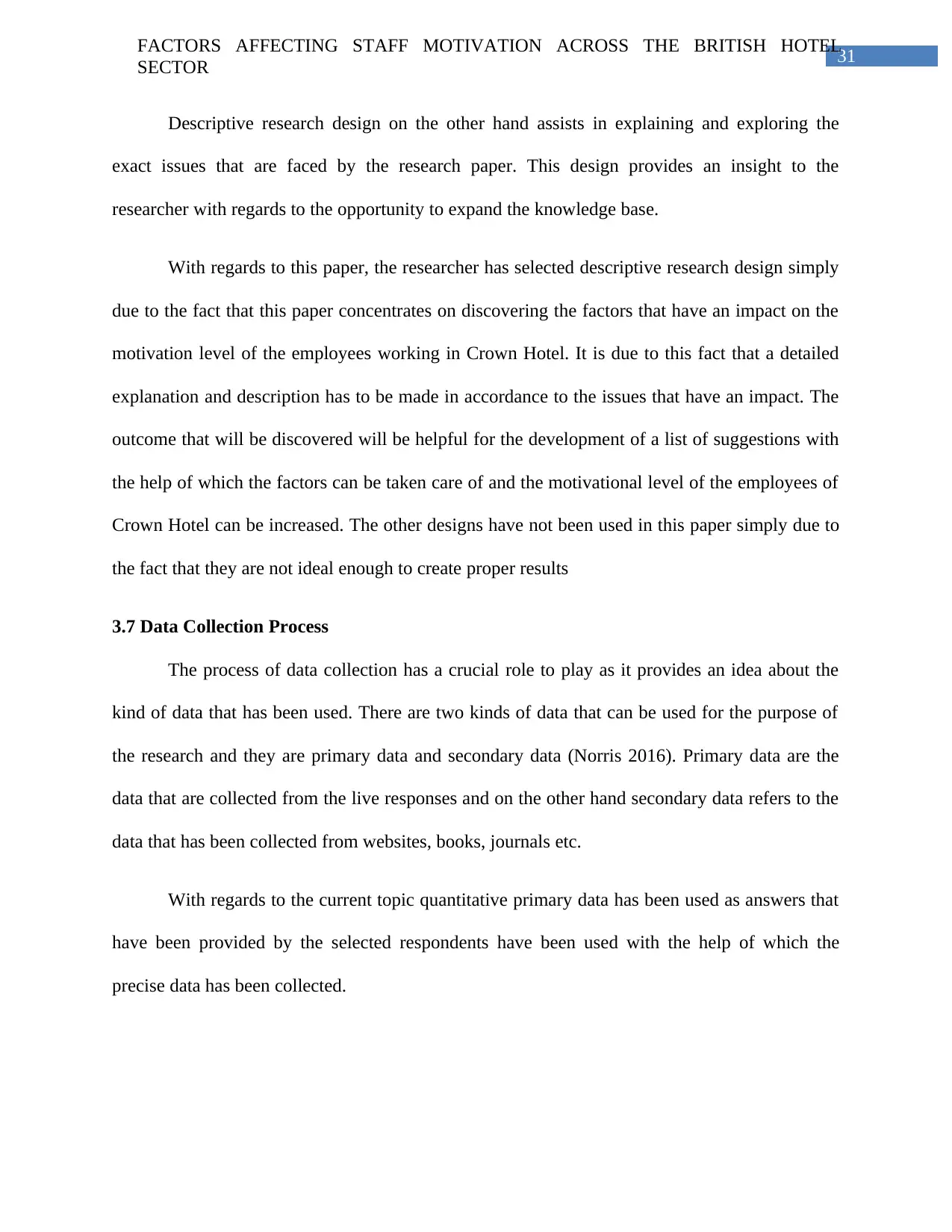
31
FACTORS AFFECTING STAFF MOTIVATION ACROSS THE BRITISH HOTEL
SECTOR
Descriptive research design on the other hand assists in explaining and exploring the
exact issues that are faced by the research paper. This design provides an insight to the
researcher with regards to the opportunity to expand the knowledge base.
With regards to this paper, the researcher has selected descriptive research design simply
due to the fact that this paper concentrates on discovering the factors that have an impact on the
motivation level of the employees working in Crown Hotel. It is due to this fact that a detailed
explanation and description has to be made in accordance to the issues that have an impact. The
outcome that will be discovered will be helpful for the development of a list of suggestions with
the help of which the factors can be taken care of and the motivational level of the employees of
Crown Hotel can be increased. The other designs have not been used in this paper simply due to
the fact that they are not ideal enough to create proper results
3.7 Data Collection Process
The process of data collection has a crucial role to play as it provides an idea about the
kind of data that has been used. There are two kinds of data that can be used for the purpose of
the research and they are primary data and secondary data (Norris 2016). Primary data are the
data that are collected from the live responses and on the other hand secondary data refers to the
data that has been collected from websites, books, journals etc.
With regards to the current topic quantitative primary data has been used as answers that
have been provided by the selected respondents have been used with the help of which the
precise data has been collected.
FACTORS AFFECTING STAFF MOTIVATION ACROSS THE BRITISH HOTEL
SECTOR
Descriptive research design on the other hand assists in explaining and exploring the
exact issues that are faced by the research paper. This design provides an insight to the
researcher with regards to the opportunity to expand the knowledge base.
With regards to this paper, the researcher has selected descriptive research design simply
due to the fact that this paper concentrates on discovering the factors that have an impact on the
motivation level of the employees working in Crown Hotel. It is due to this fact that a detailed
explanation and description has to be made in accordance to the issues that have an impact. The
outcome that will be discovered will be helpful for the development of a list of suggestions with
the help of which the factors can be taken care of and the motivational level of the employees of
Crown Hotel can be increased. The other designs have not been used in this paper simply due to
the fact that they are not ideal enough to create proper results
3.7 Data Collection Process
The process of data collection has a crucial role to play as it provides an idea about the
kind of data that has been used. There are two kinds of data that can be used for the purpose of
the research and they are primary data and secondary data (Norris 2016). Primary data are the
data that are collected from the live responses and on the other hand secondary data refers to the
data that has been collected from websites, books, journals etc.
With regards to the current topic quantitative primary data has been used as answers that
have been provided by the selected respondents have been used with the help of which the
precise data has been collected.
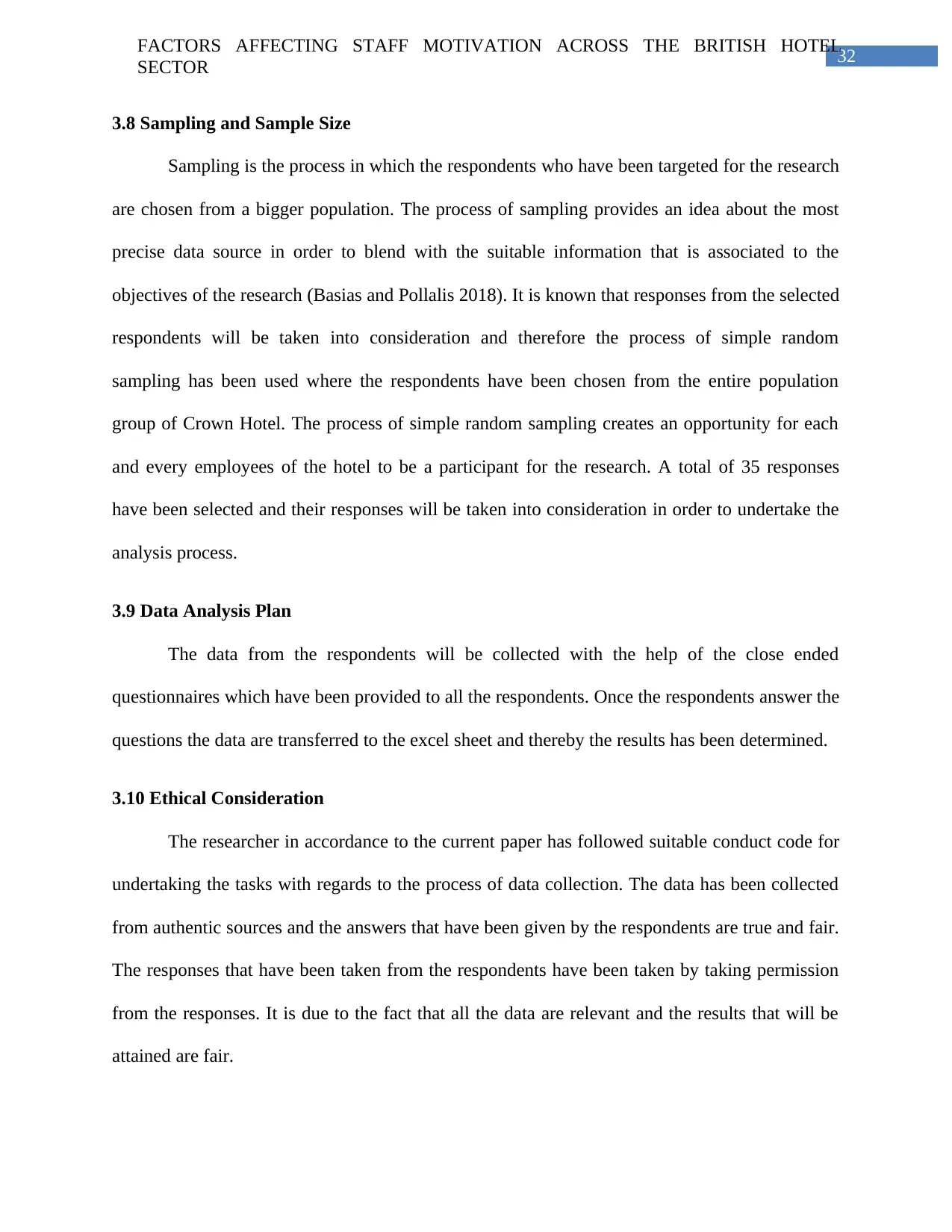
32
FACTORS AFFECTING STAFF MOTIVATION ACROSS THE BRITISH HOTEL
SECTOR
3.8 Sampling and Sample Size
Sampling is the process in which the respondents who have been targeted for the research
are chosen from a bigger population. The process of sampling provides an idea about the most
precise data source in order to blend with the suitable information that is associated to the
objectives of the research (Basias and Pollalis 2018). It is known that responses from the selected
respondents will be taken into consideration and therefore the process of simple random
sampling has been used where the respondents have been chosen from the entire population
group of Crown Hotel. The process of simple random sampling creates an opportunity for each
and every employees of the hotel to be a participant for the research. A total of 35 responses
have been selected and their responses will be taken into consideration in order to undertake the
analysis process.
3.9 Data Analysis Plan
The data from the respondents will be collected with the help of the close ended
questionnaires which have been provided to all the respondents. Once the respondents answer the
questions the data are transferred to the excel sheet and thereby the results has been determined.
3.10 Ethical Consideration
The researcher in accordance to the current paper has followed suitable conduct code for
undertaking the tasks with regards to the process of data collection. The data has been collected
from authentic sources and the answers that have been given by the respondents are true and fair.
The responses that have been taken from the respondents have been taken by taking permission
from the responses. It is due to the fact that all the data are relevant and the results that will be
attained are fair.
FACTORS AFFECTING STAFF MOTIVATION ACROSS THE BRITISH HOTEL
SECTOR
3.8 Sampling and Sample Size
Sampling is the process in which the respondents who have been targeted for the research
are chosen from a bigger population. The process of sampling provides an idea about the most
precise data source in order to blend with the suitable information that is associated to the
objectives of the research (Basias and Pollalis 2018). It is known that responses from the selected
respondents will be taken into consideration and therefore the process of simple random
sampling has been used where the respondents have been chosen from the entire population
group of Crown Hotel. The process of simple random sampling creates an opportunity for each
and every employees of the hotel to be a participant for the research. A total of 35 responses
have been selected and their responses will be taken into consideration in order to undertake the
analysis process.
3.9 Data Analysis Plan
The data from the respondents will be collected with the help of the close ended
questionnaires which have been provided to all the respondents. Once the respondents answer the
questions the data are transferred to the excel sheet and thereby the results has been determined.
3.10 Ethical Consideration
The researcher in accordance to the current paper has followed suitable conduct code for
undertaking the tasks with regards to the process of data collection. The data has been collected
from authentic sources and the answers that have been given by the respondents are true and fair.
The responses that have been taken from the respondents have been taken by taking permission
from the responses. It is due to the fact that all the data are relevant and the results that will be
attained are fair.
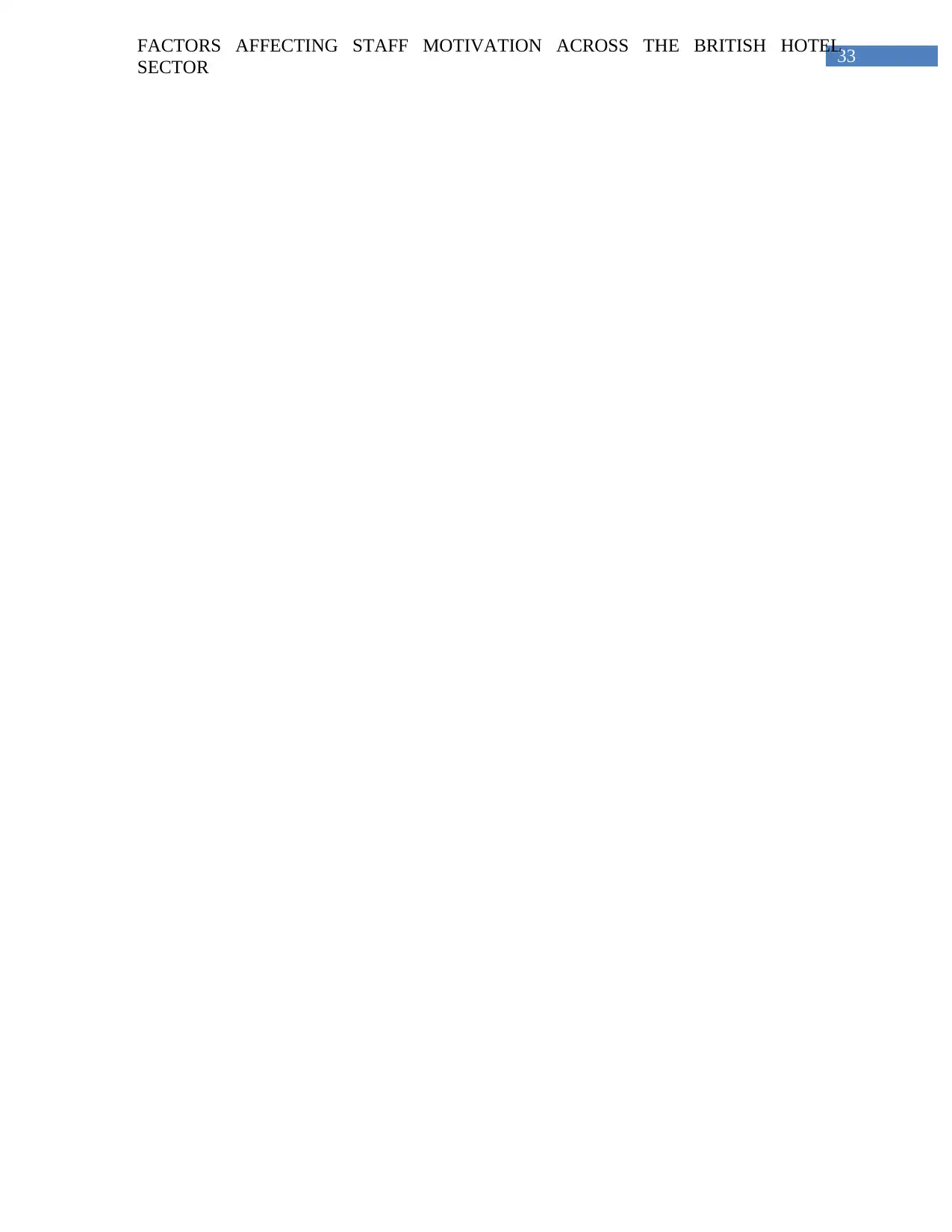
33
FACTORS AFFECTING STAFF MOTIVATION ACROSS THE BRITISH HOTEL
SECTOR
FACTORS AFFECTING STAFF MOTIVATION ACROSS THE BRITISH HOTEL
SECTOR
Secure Best Marks with AI Grader
Need help grading? Try our AI Grader for instant feedback on your assignments.
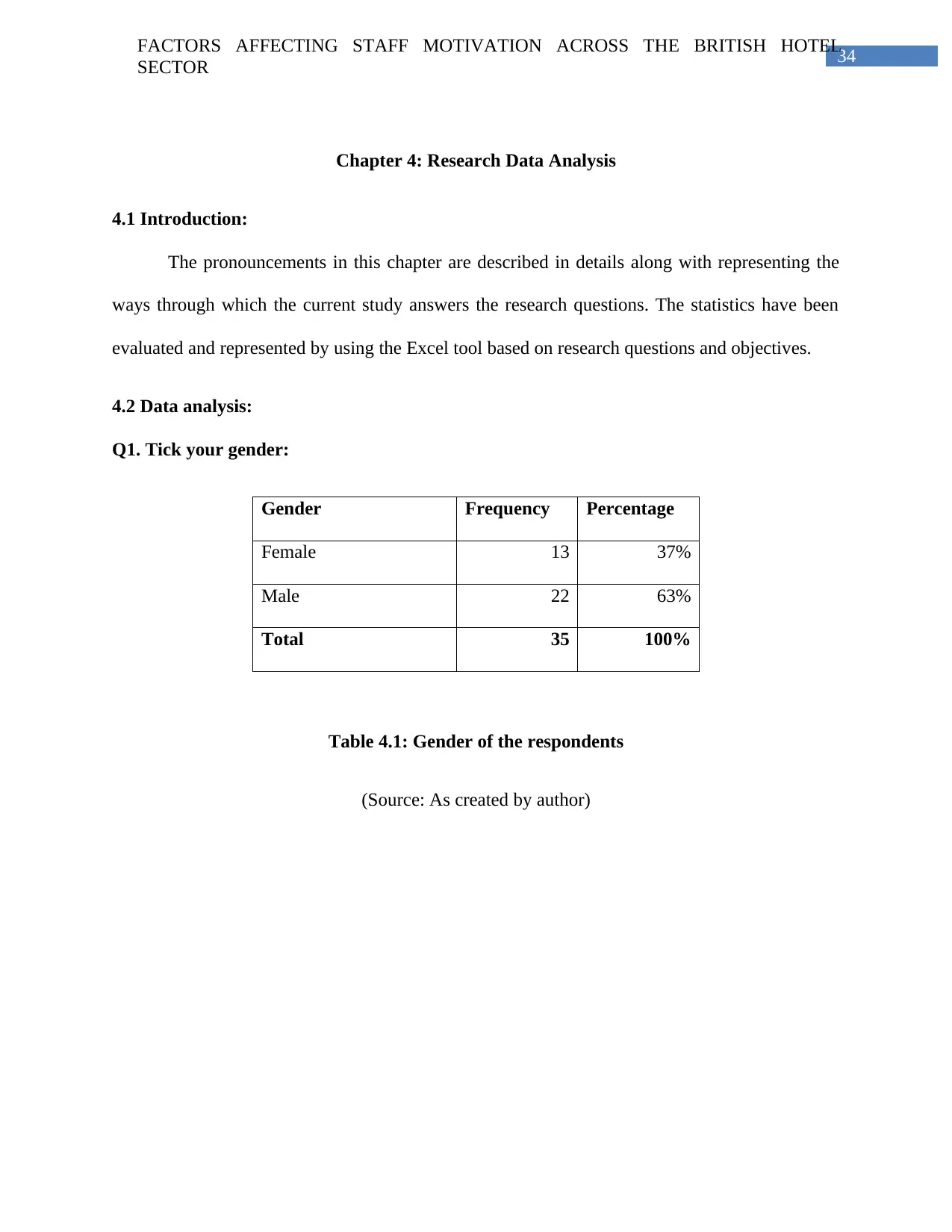
34
FACTORS AFFECTING STAFF MOTIVATION ACROSS THE BRITISH HOTEL
SECTOR
Chapter 4: Research Data Analysis
4.1 Introduction:
The pronouncements in this chapter are described in details along with representing the
ways through which the current study answers the research questions. The statistics have been
evaluated and represented by using the Excel tool based on research questions and objectives.
4.2 Data analysis:
Q1. Tick your gender:
Gender Frequency Percentage
Female 13 37%
Male 22 63%
Total 35 100%
Table 4.1: Gender of the respondents
(Source: As created by author)
FACTORS AFFECTING STAFF MOTIVATION ACROSS THE BRITISH HOTEL
SECTOR
Chapter 4: Research Data Analysis
4.1 Introduction:
The pronouncements in this chapter are described in details along with representing the
ways through which the current study answers the research questions. The statistics have been
evaluated and represented by using the Excel tool based on research questions and objectives.
4.2 Data analysis:
Q1. Tick your gender:
Gender Frequency Percentage
Female 13 37%
Male 22 63%
Total 35 100%
Table 4.1: Gender of the respondents
(Source: As created by author)
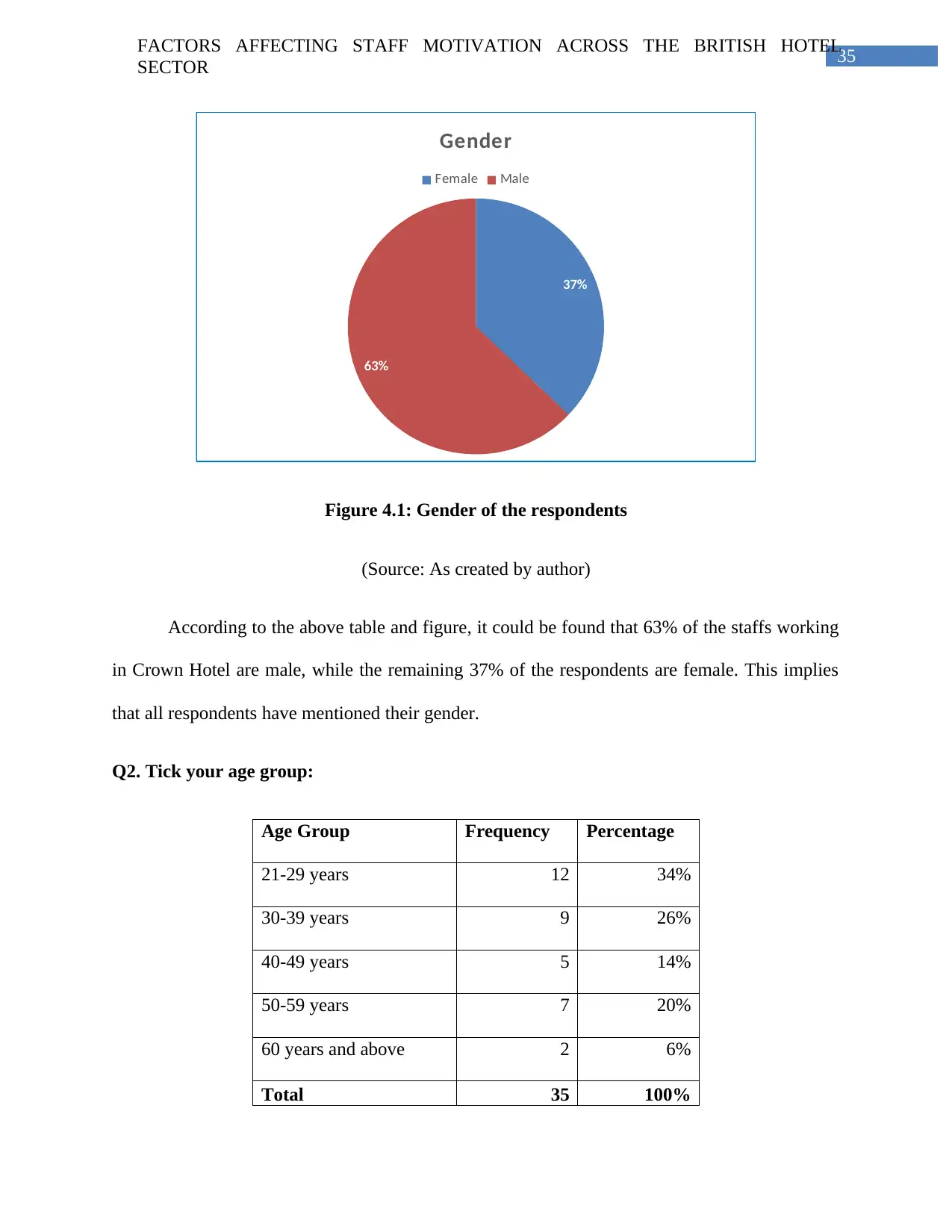
35
FACTORS AFFECTING STAFF MOTIVATION ACROSS THE BRITISH HOTEL
SECTOR
37%
63%
Gender
Female Male
Figure 4.1: Gender of the respondents
(Source: As created by author)
According to the above table and figure, it could be found that 63% of the staffs working
in Crown Hotel are male, while the remaining 37% of the respondents are female. This implies
that all respondents have mentioned their gender.
Q2. Tick your age group:
Age Group Frequency Percentage
21-29 years 12 34%
30-39 years 9 26%
40-49 years 5 14%
50-59 years 7 20%
60 years and above 2 6%
Total 35 100%
FACTORS AFFECTING STAFF MOTIVATION ACROSS THE BRITISH HOTEL
SECTOR
37%
63%
Gender
Female Male
Figure 4.1: Gender of the respondents
(Source: As created by author)
According to the above table and figure, it could be found that 63% of the staffs working
in Crown Hotel are male, while the remaining 37% of the respondents are female. This implies
that all respondents have mentioned their gender.
Q2. Tick your age group:
Age Group Frequency Percentage
21-29 years 12 34%
30-39 years 9 26%
40-49 years 5 14%
50-59 years 7 20%
60 years and above 2 6%
Total 35 100%
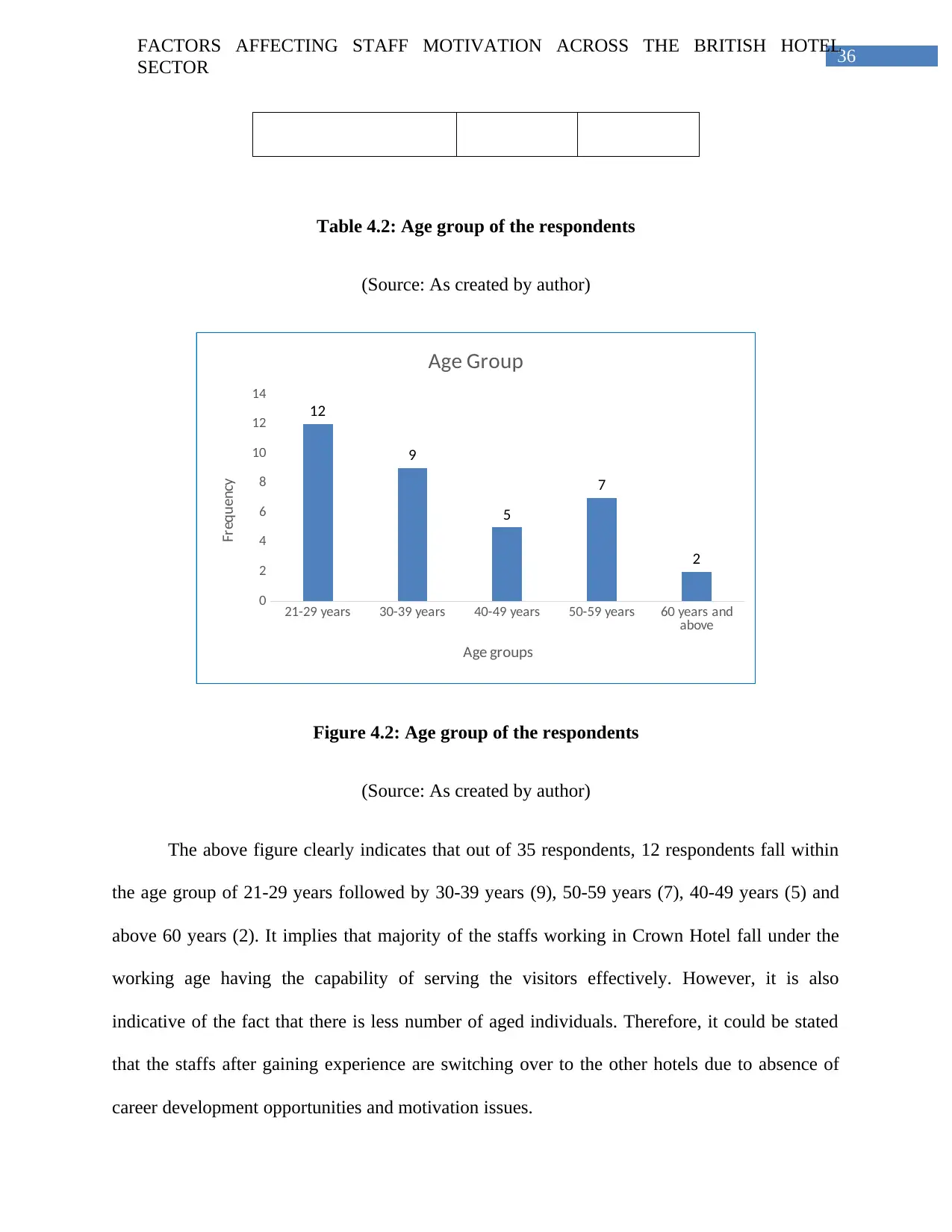
36
FACTORS AFFECTING STAFF MOTIVATION ACROSS THE BRITISH HOTEL
SECTOR
Table 4.2: Age group of the respondents
(Source: As created by author)
21-29 years 30-39 years 40-49 years 50-59 years 60 years and
above
0
2
4
6
8
10
12
14
12
9
5
7
2
Age Group
Age groups
Frequency
Figure 4.2: Age group of the respondents
(Source: As created by author)
The above figure clearly indicates that out of 35 respondents, 12 respondents fall within
the age group of 21-29 years followed by 30-39 years (9), 50-59 years (7), 40-49 years (5) and
above 60 years (2). It implies that majority of the staffs working in Crown Hotel fall under the
working age having the capability of serving the visitors effectively. However, it is also
indicative of the fact that there is less number of aged individuals. Therefore, it could be stated
that the staffs after gaining experience are switching over to the other hotels due to absence of
career development opportunities and motivation issues.
FACTORS AFFECTING STAFF MOTIVATION ACROSS THE BRITISH HOTEL
SECTOR
Table 4.2: Age group of the respondents
(Source: As created by author)
21-29 years 30-39 years 40-49 years 50-59 years 60 years and
above
0
2
4
6
8
10
12
14
12
9
5
7
2
Age Group
Age groups
Frequency
Figure 4.2: Age group of the respondents
(Source: As created by author)
The above figure clearly indicates that out of 35 respondents, 12 respondents fall within
the age group of 21-29 years followed by 30-39 years (9), 50-59 years (7), 40-49 years (5) and
above 60 years (2). It implies that majority of the staffs working in Crown Hotel fall under the
working age having the capability of serving the visitors effectively. However, it is also
indicative of the fact that there is less number of aged individuals. Therefore, it could be stated
that the staffs after gaining experience are switching over to the other hotels due to absence of
career development opportunities and motivation issues.
Paraphrase This Document
Need a fresh take? Get an instant paraphrase of this document with our AI Paraphraser
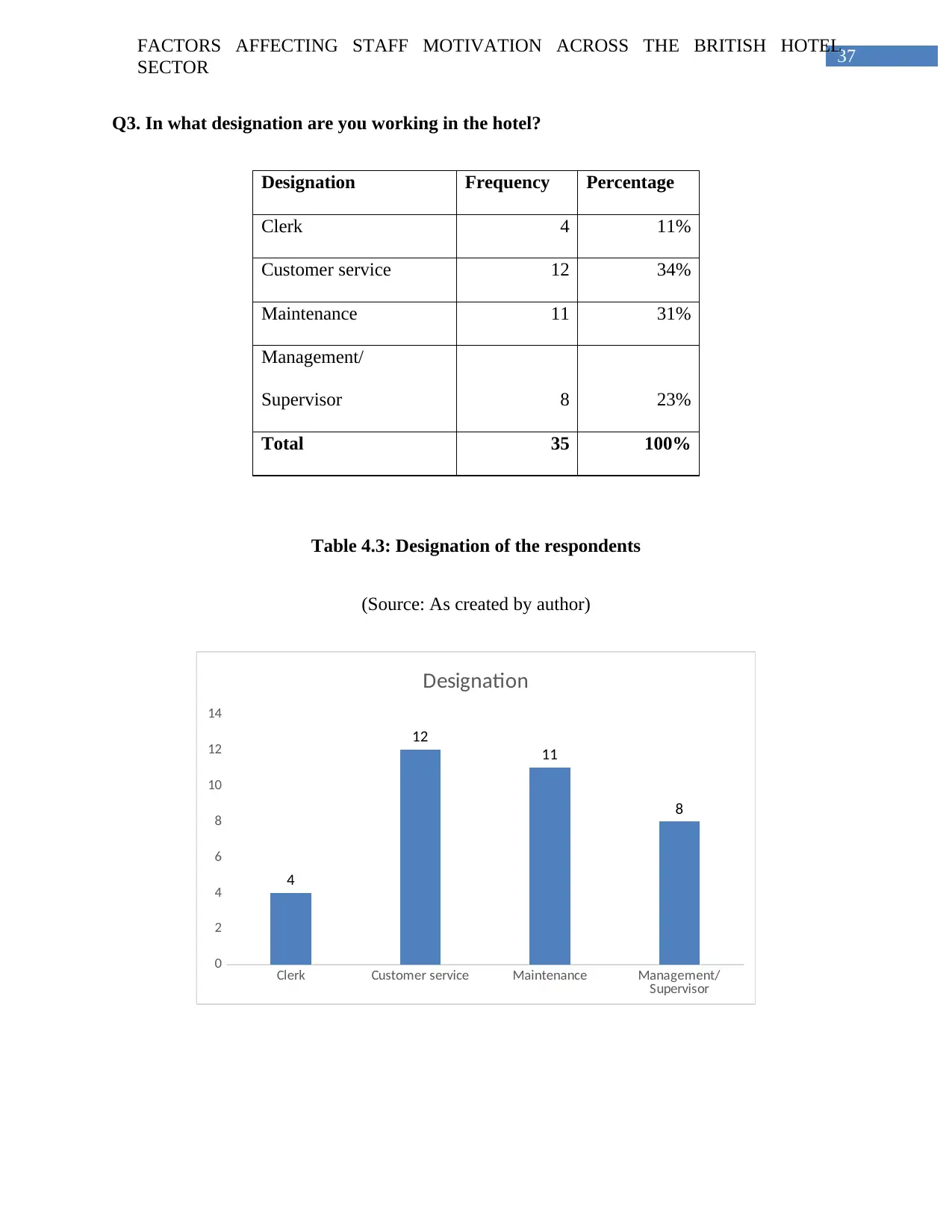
37
FACTORS AFFECTING STAFF MOTIVATION ACROSS THE BRITISH HOTEL
SECTOR
Q3. In what designation are you working in the hotel?
Designation Frequency Percentage
Clerk 4 11%
Customer service 12 34%
Maintenance 11 31%
Management/
Supervisor 8 23%
Total 35 100%
Table 4.3: Designation of the respondents
(Source: As created by author)
Clerk Customer service Maintenance Management/
Supervisor
0
2
4
6
8
10
12
14
4
12
11
8
Designation
FACTORS AFFECTING STAFF MOTIVATION ACROSS THE BRITISH HOTEL
SECTOR
Q3. In what designation are you working in the hotel?
Designation Frequency Percentage
Clerk 4 11%
Customer service 12 34%
Maintenance 11 31%
Management/
Supervisor 8 23%
Total 35 100%
Table 4.3: Designation of the respondents
(Source: As created by author)
Clerk Customer service Maintenance Management/
Supervisor
0
2
4
6
8
10
12
14
4
12
11
8
Designation
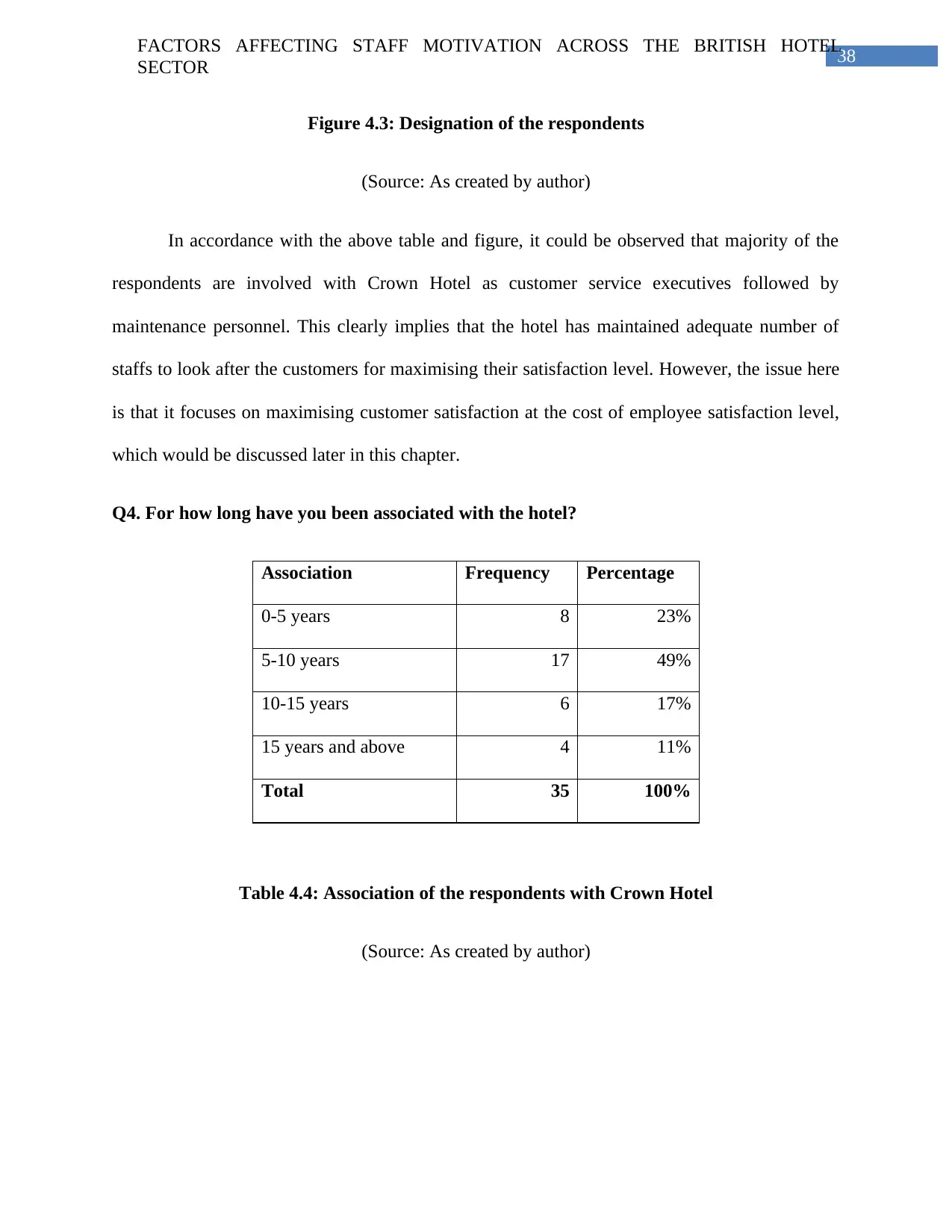
38
FACTORS AFFECTING STAFF MOTIVATION ACROSS THE BRITISH HOTEL
SECTOR
Figure 4.3: Designation of the respondents
(Source: As created by author)
In accordance with the above table and figure, it could be observed that majority of the
respondents are involved with Crown Hotel as customer service executives followed by
maintenance personnel. This clearly implies that the hotel has maintained adequate number of
staffs to look after the customers for maximising their satisfaction level. However, the issue here
is that it focuses on maximising customer satisfaction at the cost of employee satisfaction level,
which would be discussed later in this chapter.
Q4. For how long have you been associated with the hotel?
Association Frequency Percentage
0-5 years 8 23%
5-10 years 17 49%
10-15 years 6 17%
15 years and above 4 11%
Total 35 100%
Table 4.4: Association of the respondents with Crown Hotel
(Source: As created by author)
FACTORS AFFECTING STAFF MOTIVATION ACROSS THE BRITISH HOTEL
SECTOR
Figure 4.3: Designation of the respondents
(Source: As created by author)
In accordance with the above table and figure, it could be observed that majority of the
respondents are involved with Crown Hotel as customer service executives followed by
maintenance personnel. This clearly implies that the hotel has maintained adequate number of
staffs to look after the customers for maximising their satisfaction level. However, the issue here
is that it focuses on maximising customer satisfaction at the cost of employee satisfaction level,
which would be discussed later in this chapter.
Q4. For how long have you been associated with the hotel?
Association Frequency Percentage
0-5 years 8 23%
5-10 years 17 49%
10-15 years 6 17%
15 years and above 4 11%
Total 35 100%
Table 4.4: Association of the respondents with Crown Hotel
(Source: As created by author)
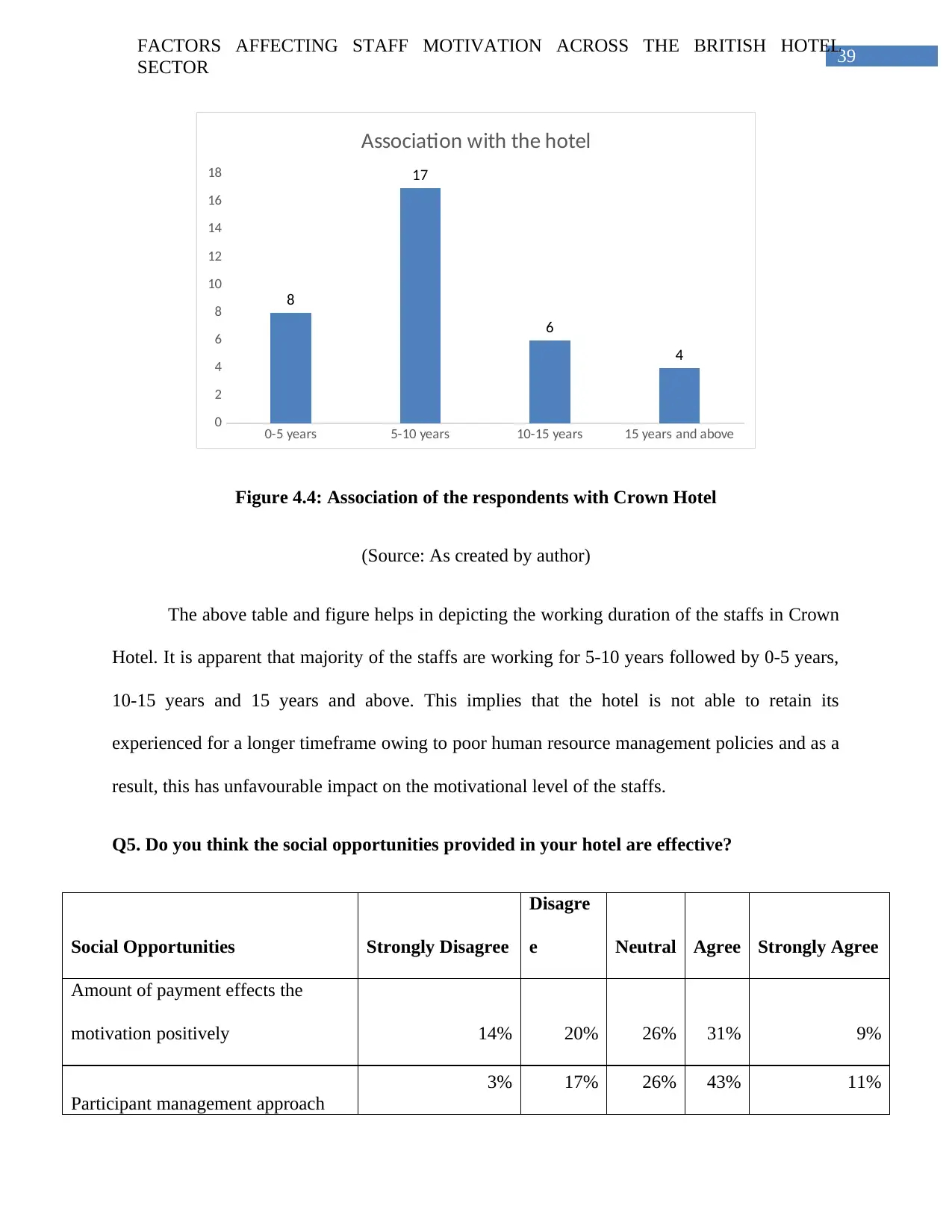
39
FACTORS AFFECTING STAFF MOTIVATION ACROSS THE BRITISH HOTEL
SECTOR
0-5 years 5-10 years 10-15 years 15 years and above
0
2
4
6
8
10
12
14
16
18
8
17
6
4
Association with the hotel
Figure 4.4: Association of the respondents with Crown Hotel
(Source: As created by author)
The above table and figure helps in depicting the working duration of the staffs in Crown
Hotel. It is apparent that majority of the staffs are working for 5-10 years followed by 0-5 years,
10-15 years and 15 years and above. This implies that the hotel is not able to retain its
experienced for a longer timeframe owing to poor human resource management policies and as a
result, this has unfavourable impact on the motivational level of the staffs.
Q5. Do you think the social opportunities provided in your hotel are effective?
Social Opportunities Strongly Disagree
Disagre
e Neutral Agree Strongly Agree
Amount of payment effects the
motivation positively 14% 20% 26% 31% 9%
Participant management approach
3% 17% 26% 43% 11%
FACTORS AFFECTING STAFF MOTIVATION ACROSS THE BRITISH HOTEL
SECTOR
0-5 years 5-10 years 10-15 years 15 years and above
0
2
4
6
8
10
12
14
16
18
8
17
6
4
Association with the hotel
Figure 4.4: Association of the respondents with Crown Hotel
(Source: As created by author)
The above table and figure helps in depicting the working duration of the staffs in Crown
Hotel. It is apparent that majority of the staffs are working for 5-10 years followed by 0-5 years,
10-15 years and 15 years and above. This implies that the hotel is not able to retain its
experienced for a longer timeframe owing to poor human resource management policies and as a
result, this has unfavourable impact on the motivational level of the staffs.
Q5. Do you think the social opportunities provided in your hotel are effective?
Social Opportunities Strongly Disagree
Disagre
e Neutral Agree Strongly Agree
Amount of payment effects the
motivation positively 14% 20% 26% 31% 9%
Participant management approach
3% 17% 26% 43% 11%
Secure Best Marks with AI Grader
Need help grading? Try our AI Grader for instant feedback on your assignments.
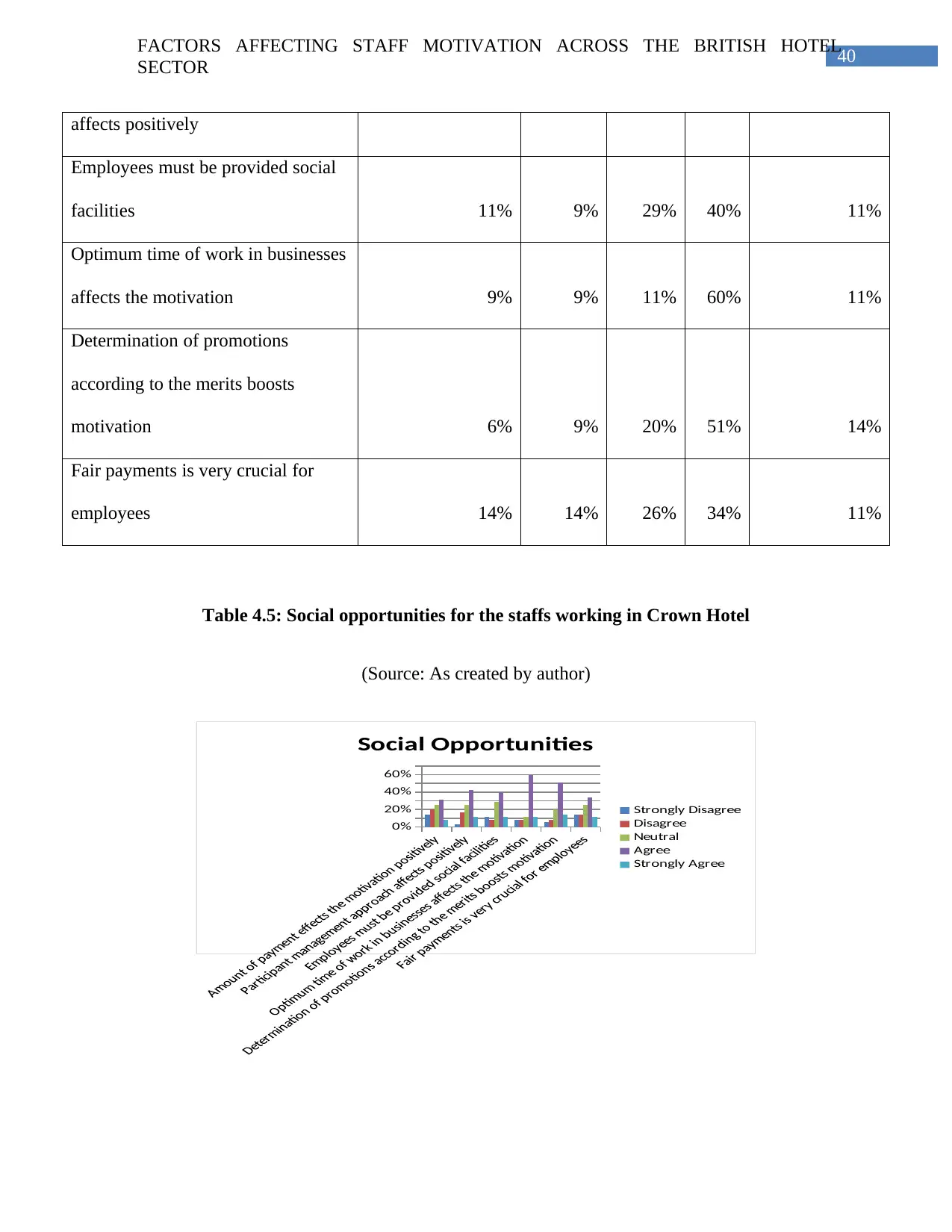
40
FACTORS AFFECTING STAFF MOTIVATION ACROSS THE BRITISH HOTEL
SECTOR
affects positively
Employees must be provided social
facilities 11% 9% 29% 40% 11%
Optimum time of work in businesses
affects the motivation 9% 9% 11% 60% 11%
Determination of promotions
according to the merits boosts
motivation 6% 9% 20% 51% 14%
Fair payments is very crucial for
employees 14% 14% 26% 34% 11%
Table 4.5: Social opportunities for the staffs working in Crown Hotel
(Source: As created by author)
0%
20%
40%
60%
Social Opportunities
Strongly Disagree
Disagree
Neutral
Agree
Strongly Agree
FACTORS AFFECTING STAFF MOTIVATION ACROSS THE BRITISH HOTEL
SECTOR
affects positively
Employees must be provided social
facilities 11% 9% 29% 40% 11%
Optimum time of work in businesses
affects the motivation 9% 9% 11% 60% 11%
Determination of promotions
according to the merits boosts
motivation 6% 9% 20% 51% 14%
Fair payments is very crucial for
employees 14% 14% 26% 34% 11%
Table 4.5: Social opportunities for the staffs working in Crown Hotel
(Source: As created by author)
0%
20%
40%
60%
Social Opportunities
Strongly Disagree
Disagree
Neutral
Agree
Strongly Agree
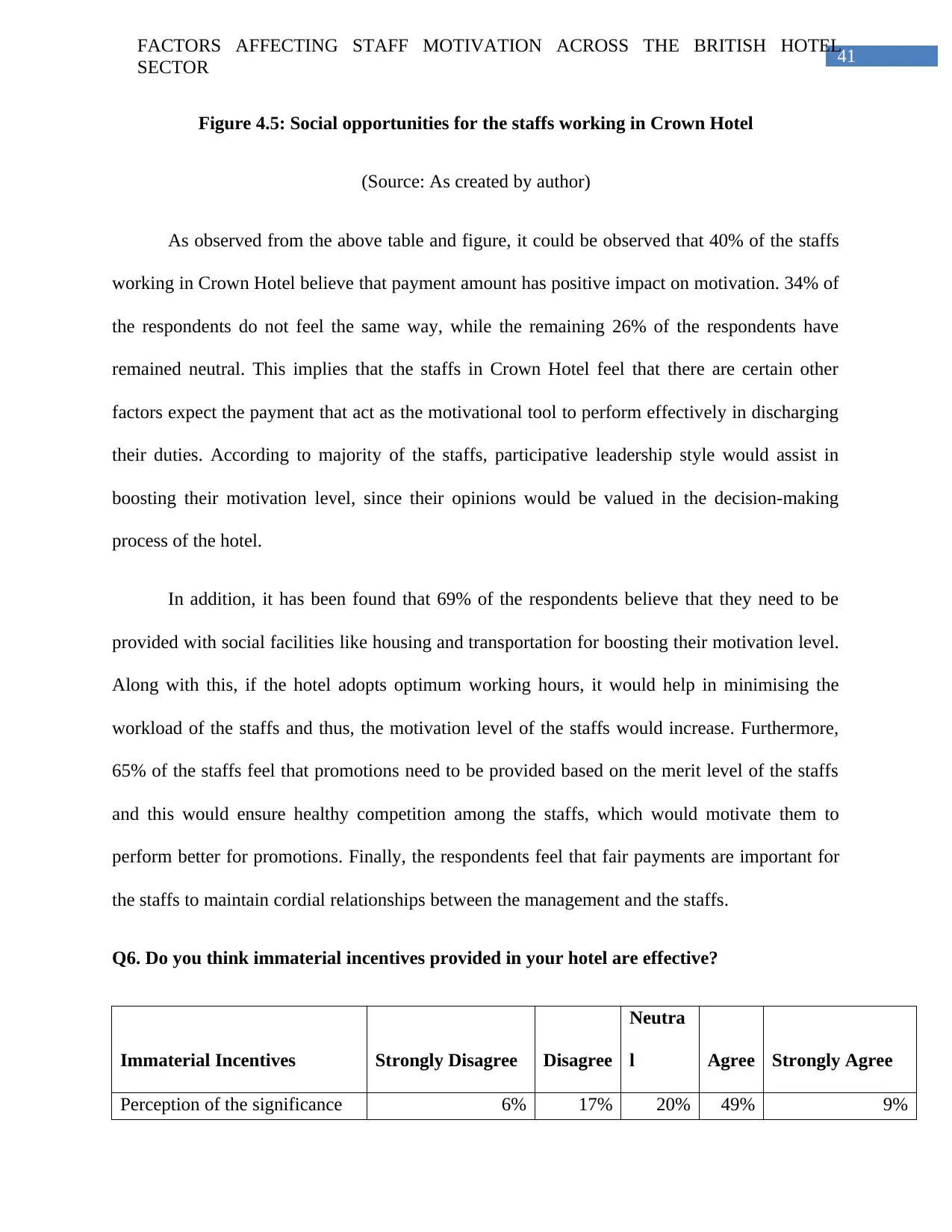
41
FACTORS AFFECTING STAFF MOTIVATION ACROSS THE BRITISH HOTEL
SECTOR
Figure 4.5: Social opportunities for the staffs working in Crown Hotel
(Source: As created by author)
As observed from the above table and figure, it could be observed that 40% of the staffs
working in Crown Hotel believe that payment amount has positive impact on motivation. 34% of
the respondents do not feel the same way, while the remaining 26% of the respondents have
remained neutral. This implies that the staffs in Crown Hotel feel that there are certain other
factors expect the payment that act as the motivational tool to perform effectively in discharging
their duties. According to majority of the staffs, participative leadership style would assist in
boosting their motivation level, since their opinions would be valued in the decision-making
process of the hotel.
In addition, it has been found that 69% of the respondents believe that they need to be
provided with social facilities like housing and transportation for boosting their motivation level.
Along with this, if the hotel adopts optimum working hours, it would help in minimising the
workload of the staffs and thus, the motivation level of the staffs would increase. Furthermore,
65% of the staffs feel that promotions need to be provided based on the merit level of the staffs
and this would ensure healthy competition among the staffs, which would motivate them to
perform better for promotions. Finally, the respondents feel that fair payments are important for
the staffs to maintain cordial relationships between the management and the staffs.
Q6. Do you think immaterial incentives provided in your hotel are effective?
Immaterial Incentives Strongly Disagree Disagree
Neutra
l Agree Strongly Agree
Perception of the significance 6% 17% 20% 49% 9%
FACTORS AFFECTING STAFF MOTIVATION ACROSS THE BRITISH HOTEL
SECTOR
Figure 4.5: Social opportunities for the staffs working in Crown Hotel
(Source: As created by author)
As observed from the above table and figure, it could be observed that 40% of the staffs
working in Crown Hotel believe that payment amount has positive impact on motivation. 34% of
the respondents do not feel the same way, while the remaining 26% of the respondents have
remained neutral. This implies that the staffs in Crown Hotel feel that there are certain other
factors expect the payment that act as the motivational tool to perform effectively in discharging
their duties. According to majority of the staffs, participative leadership style would assist in
boosting their motivation level, since their opinions would be valued in the decision-making
process of the hotel.
In addition, it has been found that 69% of the respondents believe that they need to be
provided with social facilities like housing and transportation for boosting their motivation level.
Along with this, if the hotel adopts optimum working hours, it would help in minimising the
workload of the staffs and thus, the motivation level of the staffs would increase. Furthermore,
65% of the staffs feel that promotions need to be provided based on the merit level of the staffs
and this would ensure healthy competition among the staffs, which would motivate them to
perform better for promotions. Finally, the respondents feel that fair payments are important for
the staffs to maintain cordial relationships between the management and the staffs.
Q6. Do you think immaterial incentives provided in your hotel are effective?
Immaterial Incentives Strongly Disagree Disagree
Neutra
l Agree Strongly Agree
Perception of the significance 6% 17% 20% 49% 9%
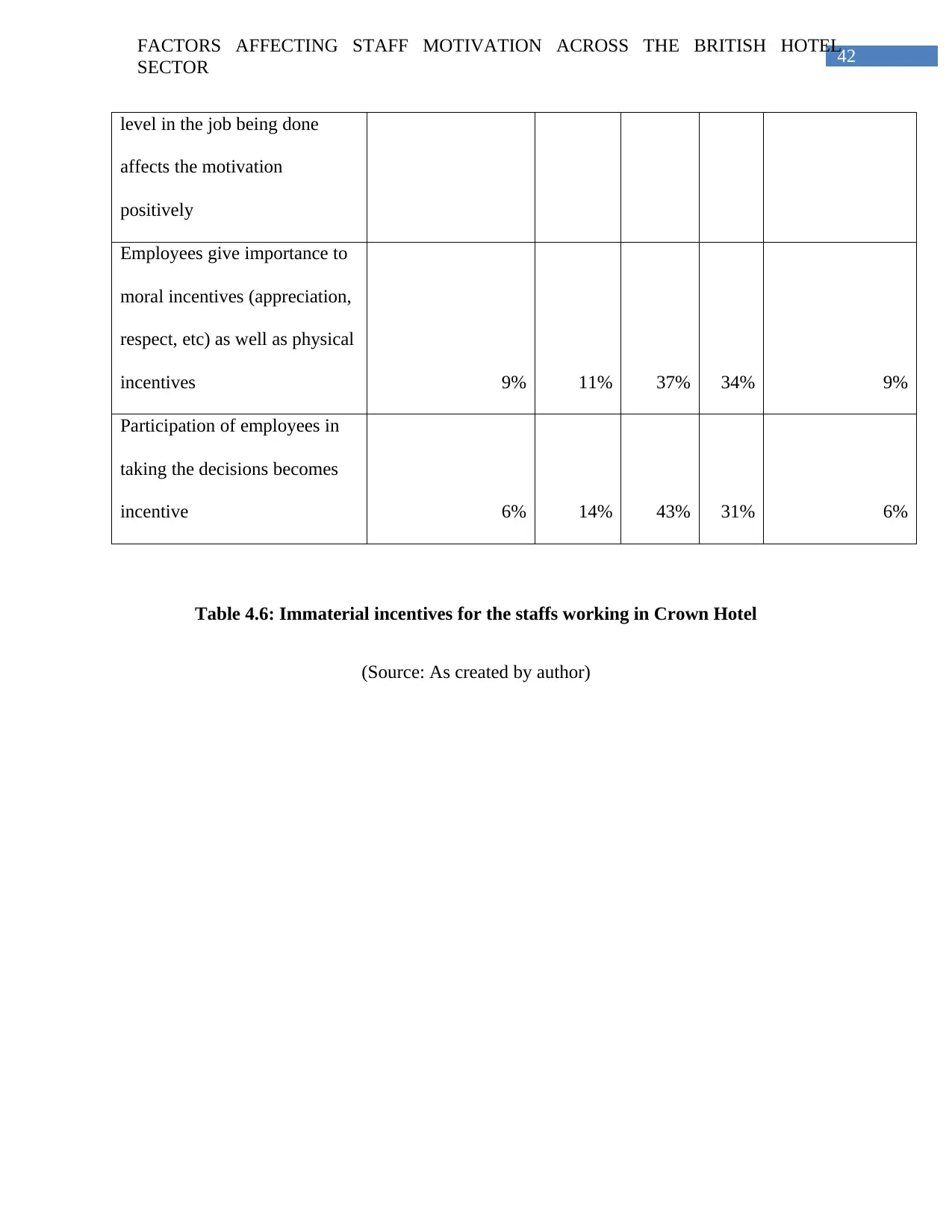
42
FACTORS AFFECTING STAFF MOTIVATION ACROSS THE BRITISH HOTEL
SECTOR
level in the job being done
affects the motivation
positively
Employees give importance to
moral incentives (appreciation,
respect, etc) as well as physical
incentives 9% 11% 37% 34% 9%
Participation of employees in
taking the decisions becomes
incentive 6% 14% 43% 31% 6%
Table 4.6: Immaterial incentives for the staffs working in Crown Hotel
(Source: As created by author)
FACTORS AFFECTING STAFF MOTIVATION ACROSS THE BRITISH HOTEL
SECTOR
level in the job being done
affects the motivation
positively
Employees give importance to
moral incentives (appreciation,
respect, etc) as well as physical
incentives 9% 11% 37% 34% 9%
Participation of employees in
taking the decisions becomes
incentive 6% 14% 43% 31% 6%
Table 4.6: Immaterial incentives for the staffs working in Crown Hotel
(Source: As created by author)
Paraphrase This Document
Need a fresh take? Get an instant paraphrase of this document with our AI Paraphraser
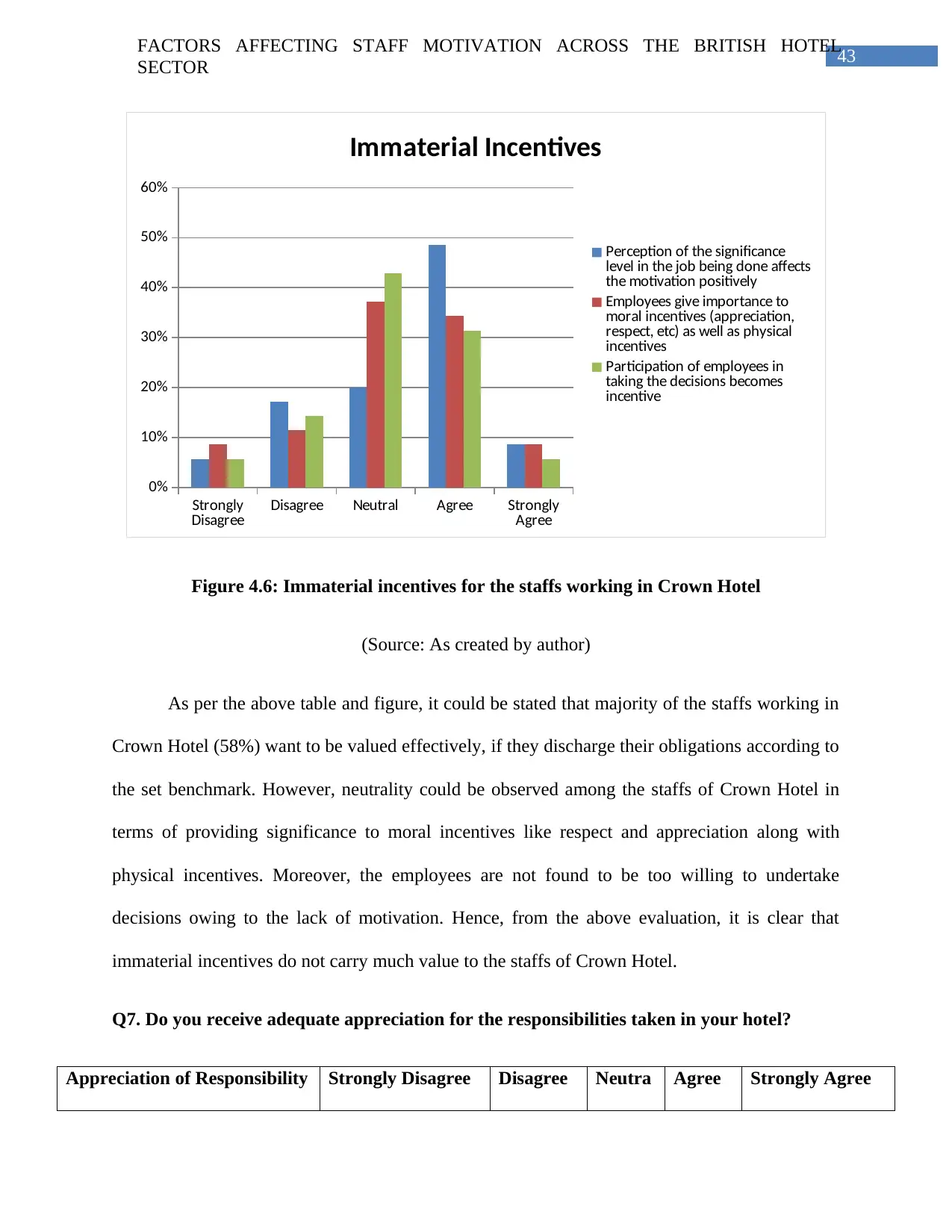
43
FACTORS AFFECTING STAFF MOTIVATION ACROSS THE BRITISH HOTEL
SECTOR
Strongly
Disagree Disagree Neutral Agree Strongly
Agree
0%
10%
20%
30%
40%
50%
60%
Immaterial Incentives
Perception of the significance
level in the job being done affects
the motivation positively
Employees give importance to
moral incentives (appreciation,
respect, etc) as well as physical
incentives
Participation of employees in
taking the decisions becomes
incentive
Figure 4.6: Immaterial incentives for the staffs working in Crown Hotel
(Source: As created by author)
As per the above table and figure, it could be stated that majority of the staffs working in
Crown Hotel (58%) want to be valued effectively, if they discharge their obligations according to
the set benchmark. However, neutrality could be observed among the staffs of Crown Hotel in
terms of providing significance to moral incentives like respect and appreciation along with
physical incentives. Moreover, the employees are not found to be too willing to undertake
decisions owing to the lack of motivation. Hence, from the above evaluation, it is clear that
immaterial incentives do not carry much value to the staffs of Crown Hotel.
Q7. Do you receive adequate appreciation for the responsibilities taken in your hotel?
Appreciation of Responsibility Strongly Disagree Disagree Neutra Agree Strongly Agree
FACTORS AFFECTING STAFF MOTIVATION ACROSS THE BRITISH HOTEL
SECTOR
Strongly
Disagree Disagree Neutral Agree Strongly
Agree
0%
10%
20%
30%
40%
50%
60%
Immaterial Incentives
Perception of the significance
level in the job being done affects
the motivation positively
Employees give importance to
moral incentives (appreciation,
respect, etc) as well as physical
incentives
Participation of employees in
taking the decisions becomes
incentive
Figure 4.6: Immaterial incentives for the staffs working in Crown Hotel
(Source: As created by author)
As per the above table and figure, it could be stated that majority of the staffs working in
Crown Hotel (58%) want to be valued effectively, if they discharge their obligations according to
the set benchmark. However, neutrality could be observed among the staffs of Crown Hotel in
terms of providing significance to moral incentives like respect and appreciation along with
physical incentives. Moreover, the employees are not found to be too willing to undertake
decisions owing to the lack of motivation. Hence, from the above evaluation, it is clear that
immaterial incentives do not carry much value to the staffs of Crown Hotel.
Q7. Do you receive adequate appreciation for the responsibilities taken in your hotel?
Appreciation of Responsibility Strongly Disagree Disagree Neutra Agree Strongly Agree
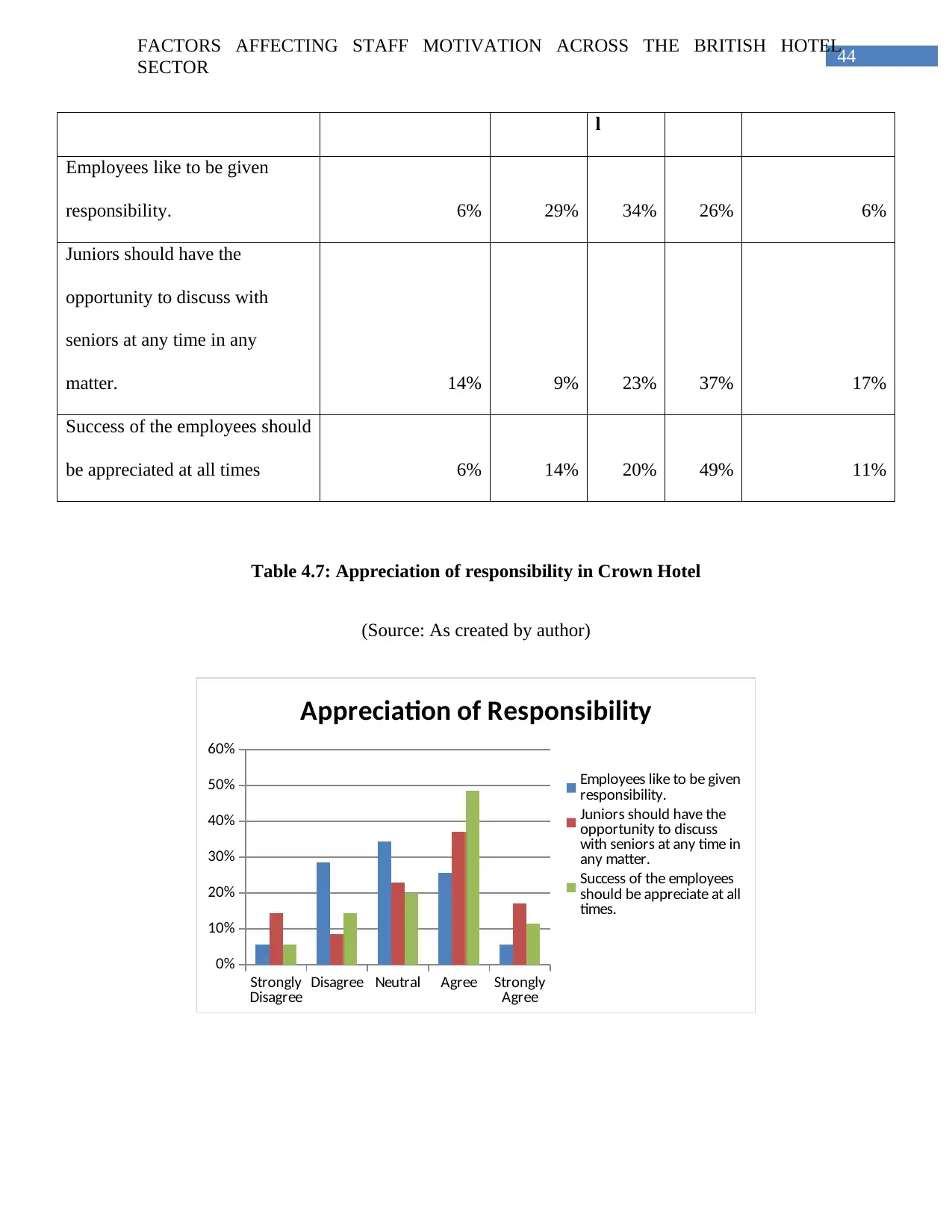
44
FACTORS AFFECTING STAFF MOTIVATION ACROSS THE BRITISH HOTEL
SECTOR
l
Employees like to be given
responsibility. 6% 29% 34% 26% 6%
Juniors should have the
opportunity to discuss with
seniors at any time in any
matter. 14% 9% 23% 37% 17%
Success of the employees should
be appreciated at all times 6% 14% 20% 49% 11%
Table 4.7: Appreciation of responsibility in Crown Hotel
(Source: As created by author)
Strongly
Disagree Disagree Neutral Agree Strongly
Agree
0%
10%
20%
30%
40%
50%
60%
Appreciation of Responsibility
Employees like to be given
responsibility.
Juniors should have the
opportunity to discuss
with seniors at any time in
any matter.
Success of the employees
should be appreciate at all
times.
FACTORS AFFECTING STAFF MOTIVATION ACROSS THE BRITISH HOTEL
SECTOR
l
Employees like to be given
responsibility. 6% 29% 34% 26% 6%
Juniors should have the
opportunity to discuss with
seniors at any time in any
matter. 14% 9% 23% 37% 17%
Success of the employees should
be appreciated at all times 6% 14% 20% 49% 11%
Table 4.7: Appreciation of responsibility in Crown Hotel
(Source: As created by author)
Strongly
Disagree Disagree Neutral Agree Strongly
Agree
0%
10%
20%
30%
40%
50%
60%
Appreciation of Responsibility
Employees like to be given
responsibility.
Juniors should have the
opportunity to discuss
with seniors at any time in
any matter.
Success of the employees
should be appreciate at all
times.
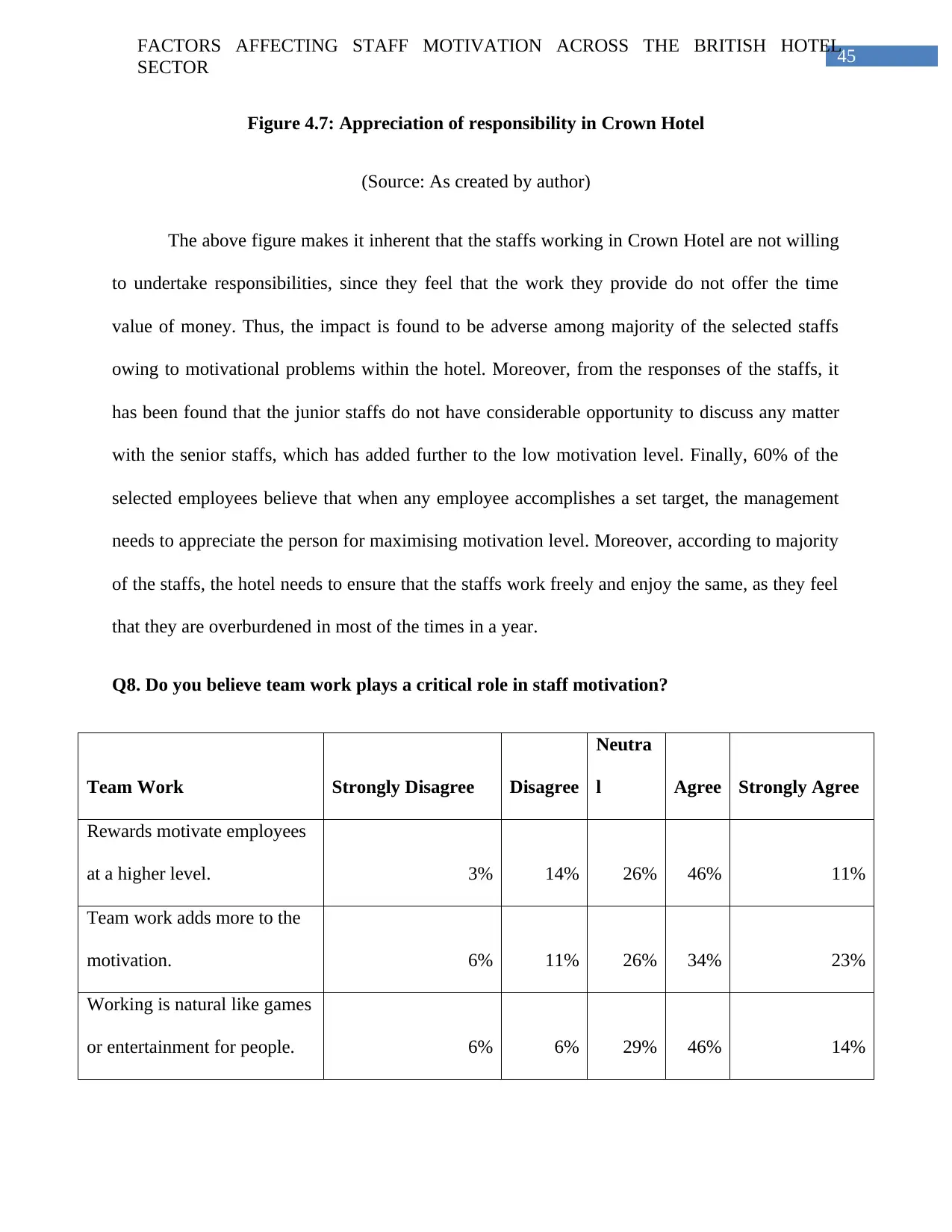
45
FACTORS AFFECTING STAFF MOTIVATION ACROSS THE BRITISH HOTEL
SECTOR
Figure 4.7: Appreciation of responsibility in Crown Hotel
(Source: As created by author)
The above figure makes it inherent that the staffs working in Crown Hotel are not willing
to undertake responsibilities, since they feel that the work they provide do not offer the time
value of money. Thus, the impact is found to be adverse among majority of the selected staffs
owing to motivational problems within the hotel. Moreover, from the responses of the staffs, it
has been found that the junior staffs do not have considerable opportunity to discuss any matter
with the senior staffs, which has added further to the low motivation level. Finally, 60% of the
selected employees believe that when any employee accomplishes a set target, the management
needs to appreciate the person for maximising motivation level. Moreover, according to majority
of the staffs, the hotel needs to ensure that the staffs work freely and enjoy the same, as they feel
that they are overburdened in most of the times in a year.
Q8. Do you believe team work plays a critical role in staff motivation?
Team Work Strongly Disagree Disagree
Neutra
l Agree Strongly Agree
Rewards motivate employees
at a higher level. 3% 14% 26% 46% 11%
Team work adds more to the
motivation. 6% 11% 26% 34% 23%
Working is natural like games
or entertainment for people. 6% 6% 29% 46% 14%
FACTORS AFFECTING STAFF MOTIVATION ACROSS THE BRITISH HOTEL
SECTOR
Figure 4.7: Appreciation of responsibility in Crown Hotel
(Source: As created by author)
The above figure makes it inherent that the staffs working in Crown Hotel are not willing
to undertake responsibilities, since they feel that the work they provide do not offer the time
value of money. Thus, the impact is found to be adverse among majority of the selected staffs
owing to motivational problems within the hotel. Moreover, from the responses of the staffs, it
has been found that the junior staffs do not have considerable opportunity to discuss any matter
with the senior staffs, which has added further to the low motivation level. Finally, 60% of the
selected employees believe that when any employee accomplishes a set target, the management
needs to appreciate the person for maximising motivation level. Moreover, according to majority
of the staffs, the hotel needs to ensure that the staffs work freely and enjoy the same, as they feel
that they are overburdened in most of the times in a year.
Q8. Do you believe team work plays a critical role in staff motivation?
Team Work Strongly Disagree Disagree
Neutra
l Agree Strongly Agree
Rewards motivate employees
at a higher level. 3% 14% 26% 46% 11%
Team work adds more to the
motivation. 6% 11% 26% 34% 23%
Working is natural like games
or entertainment for people. 6% 6% 29% 46% 14%
Secure Best Marks with AI Grader
Need help grading? Try our AI Grader for instant feedback on your assignments.
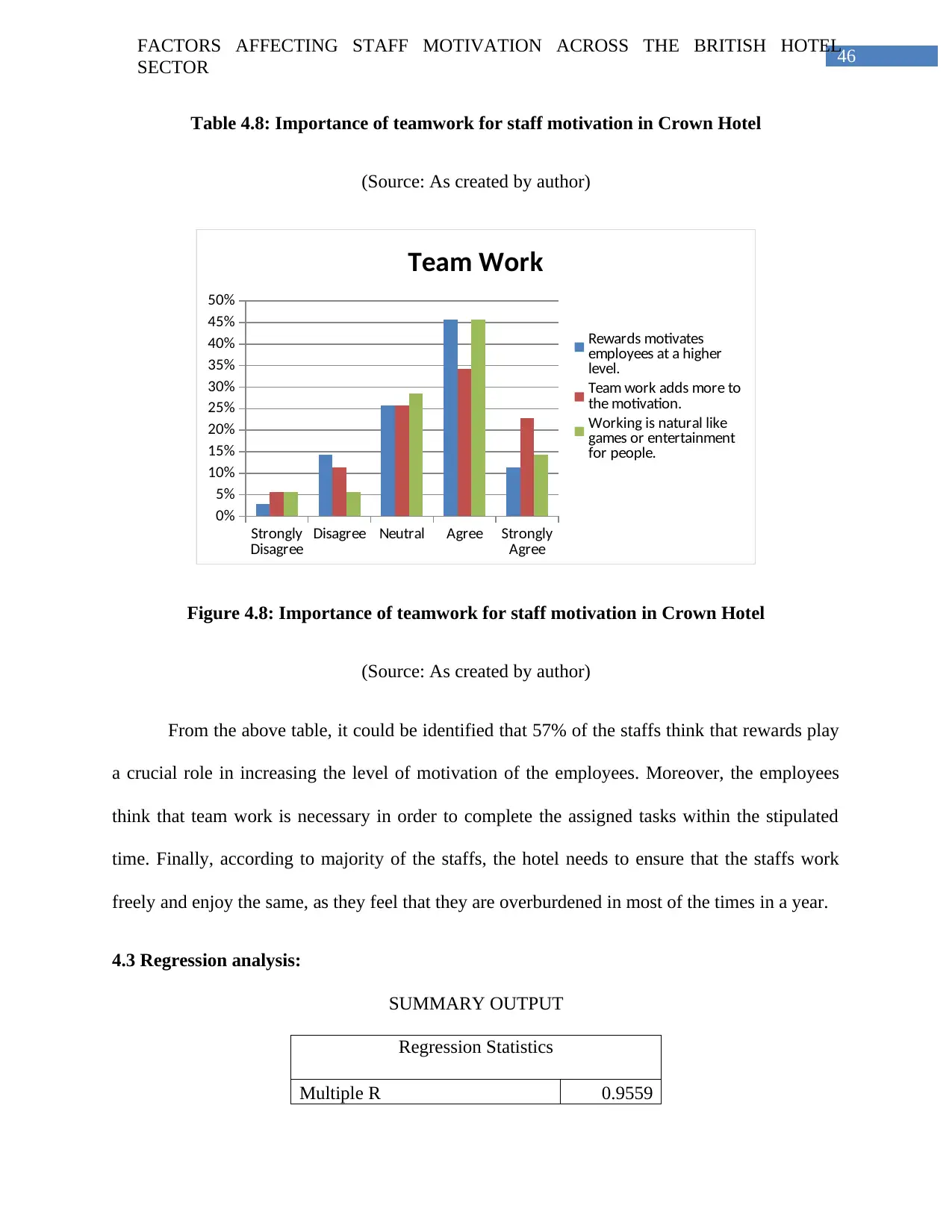
46
FACTORS AFFECTING STAFF MOTIVATION ACROSS THE BRITISH HOTEL
SECTOR
Table 4.8: Importance of teamwork for staff motivation in Crown Hotel
(Source: As created by author)
Strongly
Disagree Disagree Neutral Agree Strongly
Agree
0%
5%
10%
15%
20%
25%
30%
35%
40%
45%
50%
Team Work
Rewards motivates
employees at a higher
level.
Team work adds more to
the motivation.
Working is natural like
games or entertainment
for people.
Figure 4.8: Importance of teamwork for staff motivation in Crown Hotel
(Source: As created by author)
From the above table, it could be identified that 57% of the staffs think that rewards play
a crucial role in increasing the level of motivation of the employees. Moreover, the employees
think that team work is necessary in order to complete the assigned tasks within the stipulated
time. Finally, according to majority of the staffs, the hotel needs to ensure that the staffs work
freely and enjoy the same, as they feel that they are overburdened in most of the times in a year.
4.3 Regression analysis:
SUMMARY OUTPUT
Regression Statistics
Multiple R 0.9559
FACTORS AFFECTING STAFF MOTIVATION ACROSS THE BRITISH HOTEL
SECTOR
Table 4.8: Importance of teamwork for staff motivation in Crown Hotel
(Source: As created by author)
Strongly
Disagree Disagree Neutral Agree Strongly
Agree
0%
5%
10%
15%
20%
25%
30%
35%
40%
45%
50%
Team Work
Rewards motivates
employees at a higher
level.
Team work adds more to
the motivation.
Working is natural like
games or entertainment
for people.
Figure 4.8: Importance of teamwork for staff motivation in Crown Hotel
(Source: As created by author)
From the above table, it could be identified that 57% of the staffs think that rewards play
a crucial role in increasing the level of motivation of the employees. Moreover, the employees
think that team work is necessary in order to complete the assigned tasks within the stipulated
time. Finally, according to majority of the staffs, the hotel needs to ensure that the staffs work
freely and enjoy the same, as they feel that they are overburdened in most of the times in a year.
4.3 Regression analysis:
SUMMARY OUTPUT
Regression Statistics
Multiple R 0.9559
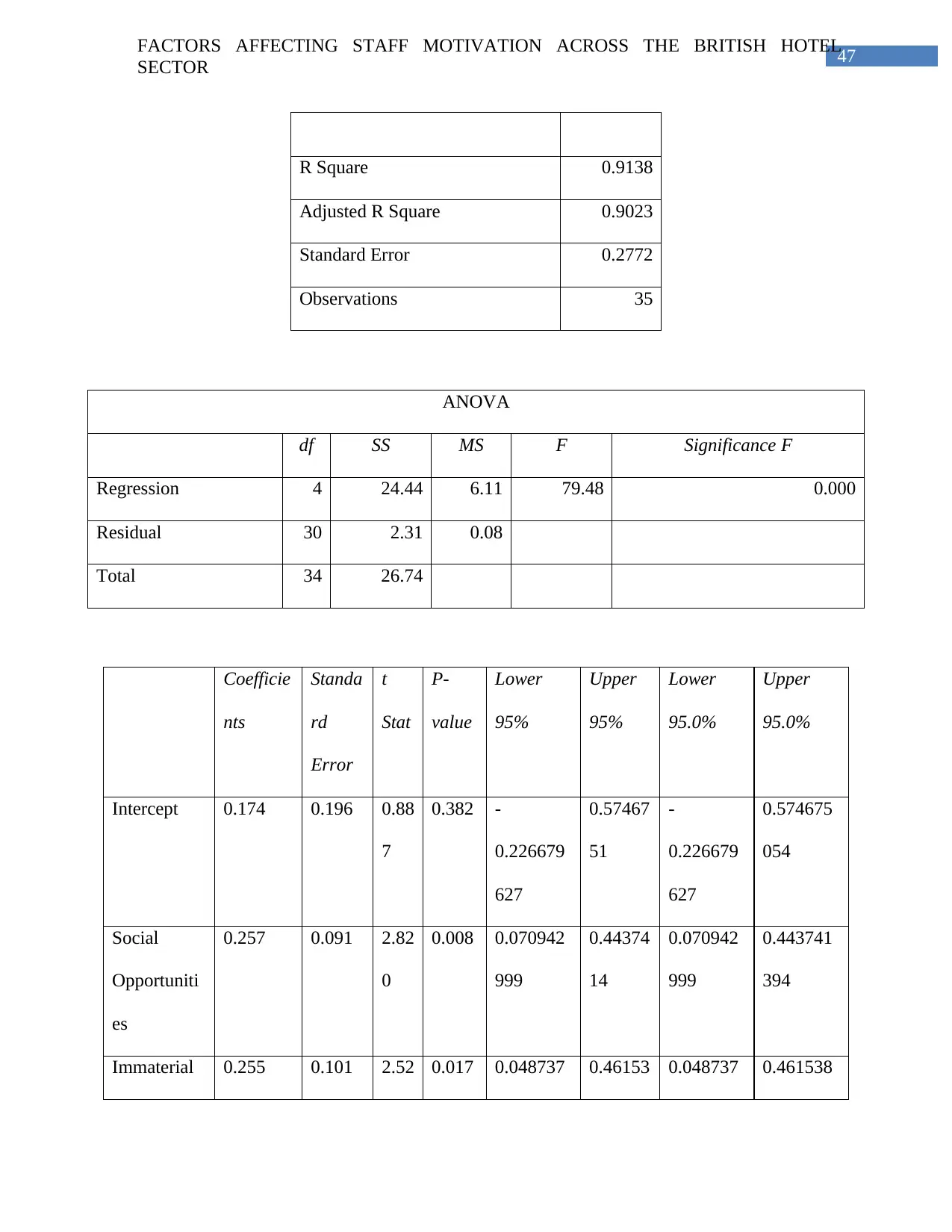
47
FACTORS AFFECTING STAFF MOTIVATION ACROSS THE BRITISH HOTEL
SECTOR
R Square 0.9138
Adjusted R Square 0.9023
Standard Error 0.2772
Observations 35
ANOVA
df SS MS F Significance F
Regression 4 24.44 6.11 79.48 0.000
Residual 30 2.31 0.08
Total 34 26.74
Coefficie
nts
Standa
rd
Error
t
Stat
P-
value
Lower
95%
Upper
95%
Lower
95.0%
Upper
95.0%
Intercept 0.174 0.196 0.88
7
0.382 -
0.226679
627
0.57467
51
-
0.226679
627
0.574675
054
Social
Opportuniti
es
0.257 0.091 2.82
0
0.008 0.070942
999
0.44374
14
0.070942
999
0.443741
394
Immaterial 0.255 0.101 2.52 0.017 0.048737 0.46153 0.048737 0.461538
FACTORS AFFECTING STAFF MOTIVATION ACROSS THE BRITISH HOTEL
SECTOR
R Square 0.9138
Adjusted R Square 0.9023
Standard Error 0.2772
Observations 35
ANOVA
df SS MS F Significance F
Regression 4 24.44 6.11 79.48 0.000
Residual 30 2.31 0.08
Total 34 26.74
Coefficie
nts
Standa
rd
Error
t
Stat
P-
value
Lower
95%
Upper
95%
Lower
95.0%
Upper
95.0%
Intercept 0.174 0.196 0.88
7
0.382 -
0.226679
627
0.57467
51
-
0.226679
627
0.574675
054
Social
Opportuniti
es
0.257 0.091 2.82
0
0.008 0.070942
999
0.44374
14
0.070942
999
0.443741
394
Immaterial 0.255 0.101 2.52 0.017 0.048737 0.46153 0.048737 0.461538
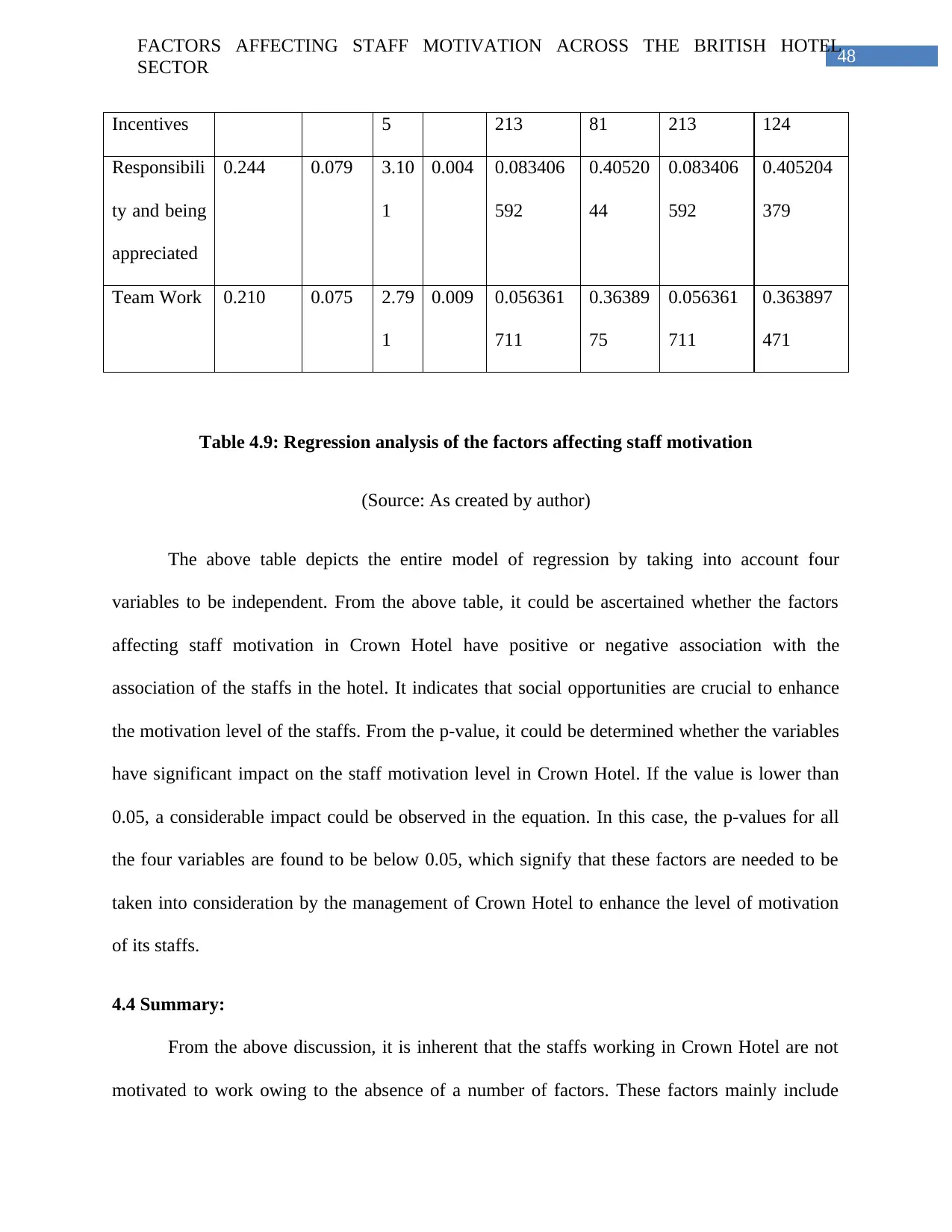
48
FACTORS AFFECTING STAFF MOTIVATION ACROSS THE BRITISH HOTEL
SECTOR
Incentives 5 213 81 213 124
Responsibili
ty and being
appreciated
0.244 0.079 3.10
1
0.004 0.083406
592
0.40520
44
0.083406
592
0.405204
379
Team Work 0.210 0.075 2.79
1
0.009 0.056361
711
0.36389
75
0.056361
711
0.363897
471
Table 4.9: Regression analysis of the factors affecting staff motivation
(Source: As created by author)
The above table depicts the entire model of regression by taking into account four
variables to be independent. From the above table, it could be ascertained whether the factors
affecting staff motivation in Crown Hotel have positive or negative association with the
association of the staffs in the hotel. It indicates that social opportunities are crucial to enhance
the motivation level of the staffs. From the p-value, it could be determined whether the variables
have significant impact on the staff motivation level in Crown Hotel. If the value is lower than
0.05, a considerable impact could be observed in the equation. In this case, the p-values for all
the four variables are found to be below 0.05, which signify that these factors are needed to be
taken into consideration by the management of Crown Hotel to enhance the level of motivation
of its staffs.
4.4 Summary:
From the above discussion, it is inherent that the staffs working in Crown Hotel are not
motivated to work owing to the absence of a number of factors. These factors mainly include
FACTORS AFFECTING STAFF MOTIVATION ACROSS THE BRITISH HOTEL
SECTOR
Incentives 5 213 81 213 124
Responsibili
ty and being
appreciated
0.244 0.079 3.10
1
0.004 0.083406
592
0.40520
44
0.083406
592
0.405204
379
Team Work 0.210 0.075 2.79
1
0.009 0.056361
711
0.36389
75
0.056361
711
0.363897
471
Table 4.9: Regression analysis of the factors affecting staff motivation
(Source: As created by author)
The above table depicts the entire model of regression by taking into account four
variables to be independent. From the above table, it could be ascertained whether the factors
affecting staff motivation in Crown Hotel have positive or negative association with the
association of the staffs in the hotel. It indicates that social opportunities are crucial to enhance
the motivation level of the staffs. From the p-value, it could be determined whether the variables
have significant impact on the staff motivation level in Crown Hotel. If the value is lower than
0.05, a considerable impact could be observed in the equation. In this case, the p-values for all
the four variables are found to be below 0.05, which signify that these factors are needed to be
taken into consideration by the management of Crown Hotel to enhance the level of motivation
of its staffs.
4.4 Summary:
From the above discussion, it is inherent that the staffs working in Crown Hotel are not
motivated to work owing to the absence of a number of factors. These factors mainly include
Paraphrase This Document
Need a fresh take? Get an instant paraphrase of this document with our AI Paraphraser
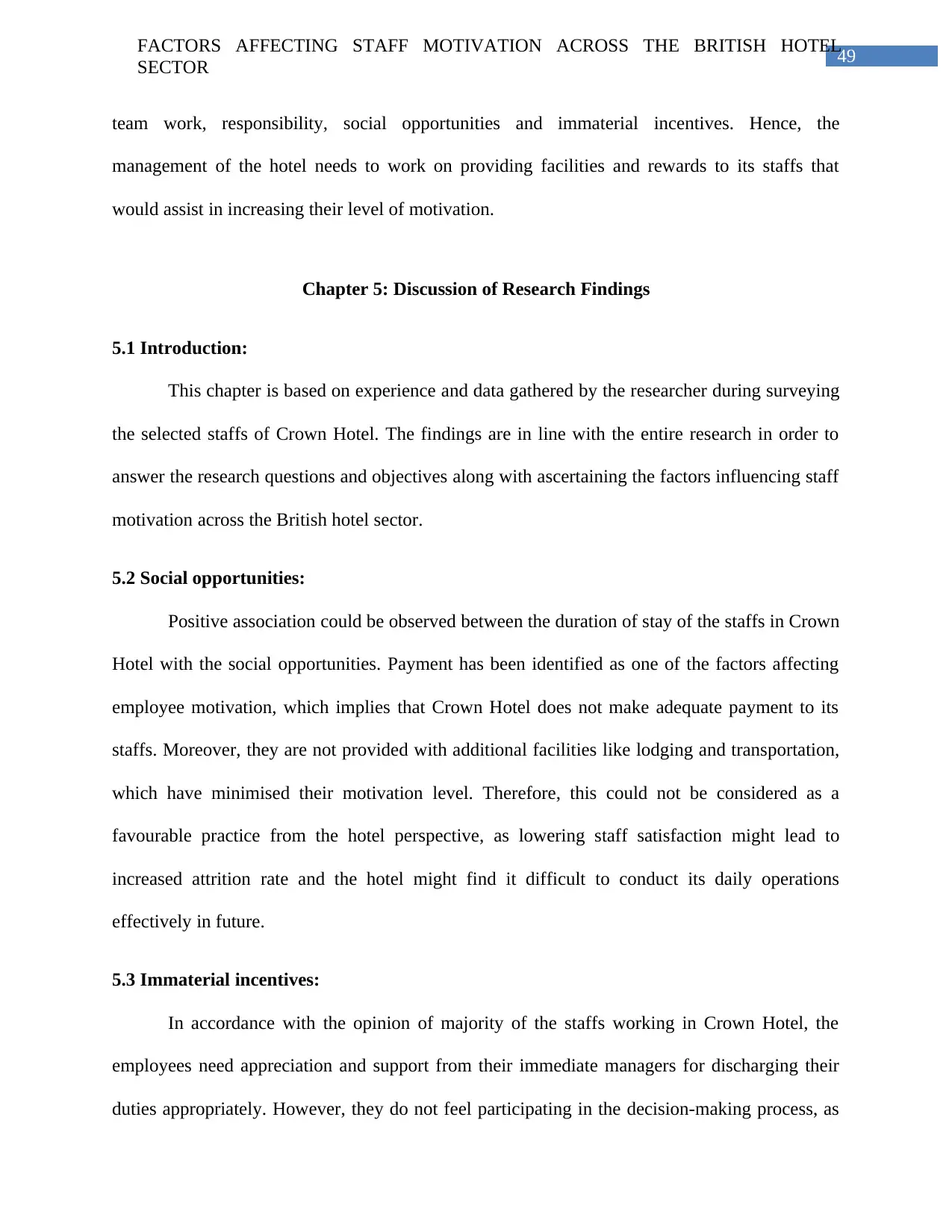
49
FACTORS AFFECTING STAFF MOTIVATION ACROSS THE BRITISH HOTEL
SECTOR
team work, responsibility, social opportunities and immaterial incentives. Hence, the
management of the hotel needs to work on providing facilities and rewards to its staffs that
would assist in increasing their level of motivation.
Chapter 5: Discussion of Research Findings
5.1 Introduction:
This chapter is based on experience and data gathered by the researcher during surveying
the selected staffs of Crown Hotel. The findings are in line with the entire research in order to
answer the research questions and objectives along with ascertaining the factors influencing staff
motivation across the British hotel sector.
5.2 Social opportunities:
Positive association could be observed between the duration of stay of the staffs in Crown
Hotel with the social opportunities. Payment has been identified as one of the factors affecting
employee motivation, which implies that Crown Hotel does not make adequate payment to its
staffs. Moreover, they are not provided with additional facilities like lodging and transportation,
which have minimised their motivation level. Therefore, this could not be considered as a
favourable practice from the hotel perspective, as lowering staff satisfaction might lead to
increased attrition rate and the hotel might find it difficult to conduct its daily operations
effectively in future.
5.3 Immaterial incentives:
In accordance with the opinion of majority of the staffs working in Crown Hotel, the
employees need appreciation and support from their immediate managers for discharging their
duties appropriately. However, they do not feel participating in the decision-making process, as
FACTORS AFFECTING STAFF MOTIVATION ACROSS THE BRITISH HOTEL
SECTOR
team work, responsibility, social opportunities and immaterial incentives. Hence, the
management of the hotel needs to work on providing facilities and rewards to its staffs that
would assist in increasing their level of motivation.
Chapter 5: Discussion of Research Findings
5.1 Introduction:
This chapter is based on experience and data gathered by the researcher during surveying
the selected staffs of Crown Hotel. The findings are in line with the entire research in order to
answer the research questions and objectives along with ascertaining the factors influencing staff
motivation across the British hotel sector.
5.2 Social opportunities:
Positive association could be observed between the duration of stay of the staffs in Crown
Hotel with the social opportunities. Payment has been identified as one of the factors affecting
employee motivation, which implies that Crown Hotel does not make adequate payment to its
staffs. Moreover, they are not provided with additional facilities like lodging and transportation,
which have minimised their motivation level. Therefore, this could not be considered as a
favourable practice from the hotel perspective, as lowering staff satisfaction might lead to
increased attrition rate and the hotel might find it difficult to conduct its daily operations
effectively in future.
5.3 Immaterial incentives:
In accordance with the opinion of majority of the staffs working in Crown Hotel, the
employees need appreciation and support from their immediate managers for discharging their
duties appropriately. However, they do not feel participating in the decision-making process, as
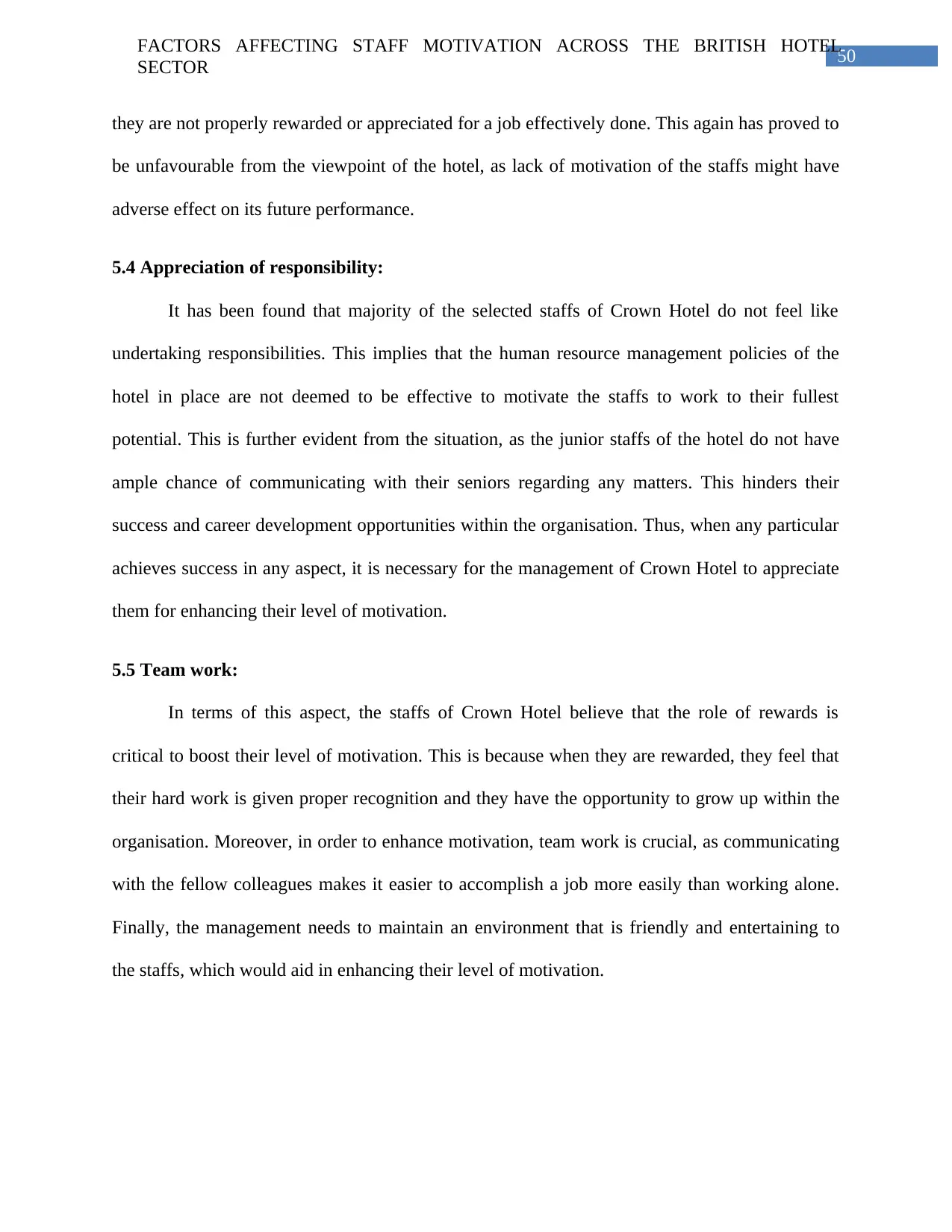
50
FACTORS AFFECTING STAFF MOTIVATION ACROSS THE BRITISH HOTEL
SECTOR
they are not properly rewarded or appreciated for a job effectively done. This again has proved to
be unfavourable from the viewpoint of the hotel, as lack of motivation of the staffs might have
adverse effect on its future performance.
5.4 Appreciation of responsibility:
It has been found that majority of the selected staffs of Crown Hotel do not feel like
undertaking responsibilities. This implies that the human resource management policies of the
hotel in place are not deemed to be effective to motivate the staffs to work to their fullest
potential. This is further evident from the situation, as the junior staffs of the hotel do not have
ample chance of communicating with their seniors regarding any matters. This hinders their
success and career development opportunities within the organisation. Thus, when any particular
achieves success in any aspect, it is necessary for the management of Crown Hotel to appreciate
them for enhancing their level of motivation.
5.5 Team work:
In terms of this aspect, the staffs of Crown Hotel believe that the role of rewards is
critical to boost their level of motivation. This is because when they are rewarded, they feel that
their hard work is given proper recognition and they have the opportunity to grow up within the
organisation. Moreover, in order to enhance motivation, team work is crucial, as communicating
with the fellow colleagues makes it easier to accomplish a job more easily than working alone.
Finally, the management needs to maintain an environment that is friendly and entertaining to
the staffs, which would aid in enhancing their level of motivation.
FACTORS AFFECTING STAFF MOTIVATION ACROSS THE BRITISH HOTEL
SECTOR
they are not properly rewarded or appreciated for a job effectively done. This again has proved to
be unfavourable from the viewpoint of the hotel, as lack of motivation of the staffs might have
adverse effect on its future performance.
5.4 Appreciation of responsibility:
It has been found that majority of the selected staffs of Crown Hotel do not feel like
undertaking responsibilities. This implies that the human resource management policies of the
hotel in place are not deemed to be effective to motivate the staffs to work to their fullest
potential. This is further evident from the situation, as the junior staffs of the hotel do not have
ample chance of communicating with their seniors regarding any matters. This hinders their
success and career development opportunities within the organisation. Thus, when any particular
achieves success in any aspect, it is necessary for the management of Crown Hotel to appreciate
them for enhancing their level of motivation.
5.5 Team work:
In terms of this aspect, the staffs of Crown Hotel believe that the role of rewards is
critical to boost their level of motivation. This is because when they are rewarded, they feel that
their hard work is given proper recognition and they have the opportunity to grow up within the
organisation. Moreover, in order to enhance motivation, team work is crucial, as communicating
with the fellow colleagues makes it easier to accomplish a job more easily than working alone.
Finally, the management needs to maintain an environment that is friendly and entertaining to
the staffs, which would aid in enhancing their level of motivation.
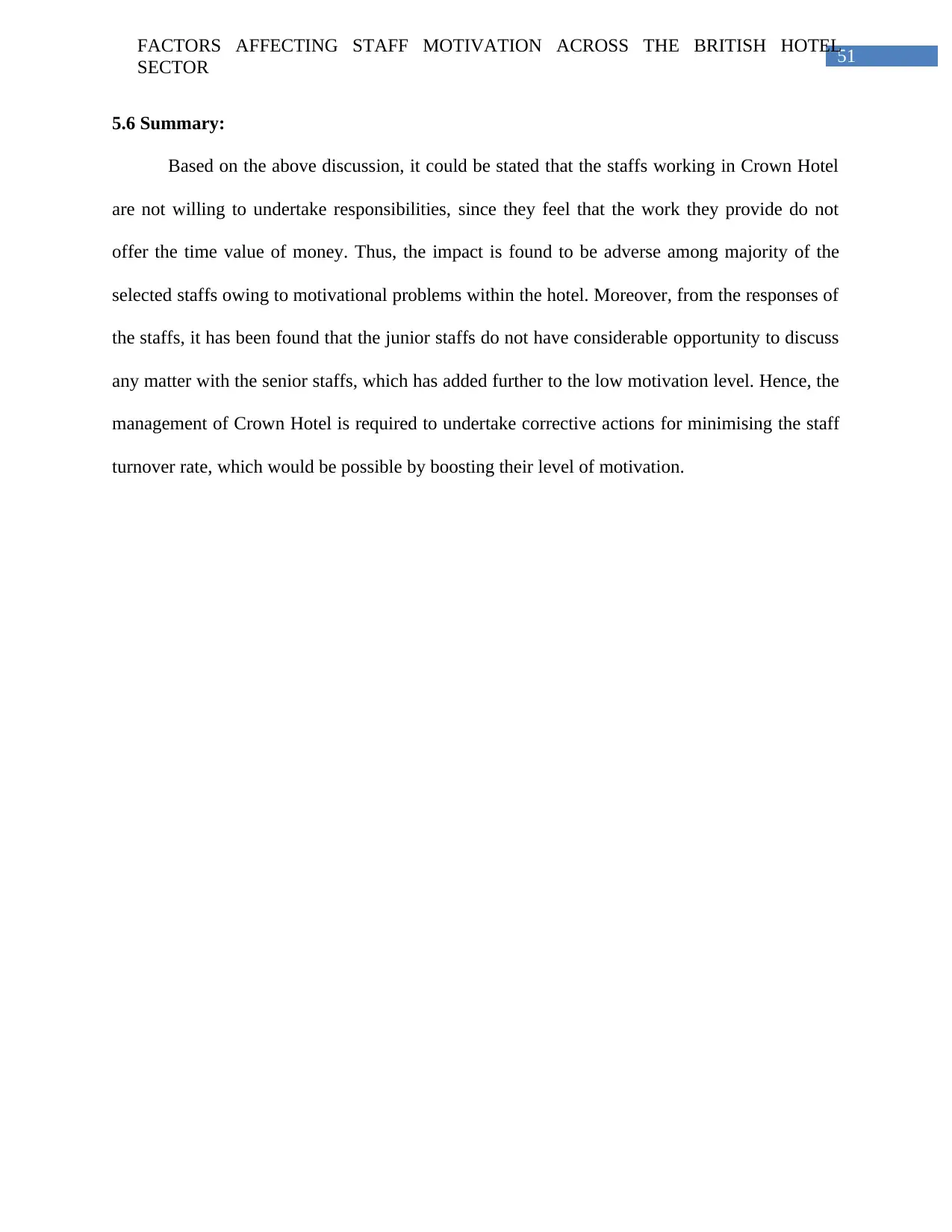
51
FACTORS AFFECTING STAFF MOTIVATION ACROSS THE BRITISH HOTEL
SECTOR
5.6 Summary:
Based on the above discussion, it could be stated that the staffs working in Crown Hotel
are not willing to undertake responsibilities, since they feel that the work they provide do not
offer the time value of money. Thus, the impact is found to be adverse among majority of the
selected staffs owing to motivational problems within the hotel. Moreover, from the responses of
the staffs, it has been found that the junior staffs do not have considerable opportunity to discuss
any matter with the senior staffs, which has added further to the low motivation level. Hence, the
management of Crown Hotel is required to undertake corrective actions for minimising the staff
turnover rate, which would be possible by boosting their level of motivation.
FACTORS AFFECTING STAFF MOTIVATION ACROSS THE BRITISH HOTEL
SECTOR
5.6 Summary:
Based on the above discussion, it could be stated that the staffs working in Crown Hotel
are not willing to undertake responsibilities, since they feel that the work they provide do not
offer the time value of money. Thus, the impact is found to be adverse among majority of the
selected staffs owing to motivational problems within the hotel. Moreover, from the responses of
the staffs, it has been found that the junior staffs do not have considerable opportunity to discuss
any matter with the senior staffs, which has added further to the low motivation level. Hence, the
management of Crown Hotel is required to undertake corrective actions for minimising the staff
turnover rate, which would be possible by boosting their level of motivation.
Secure Best Marks with AI Grader
Need help grading? Try our AI Grader for instant feedback on your assignments.
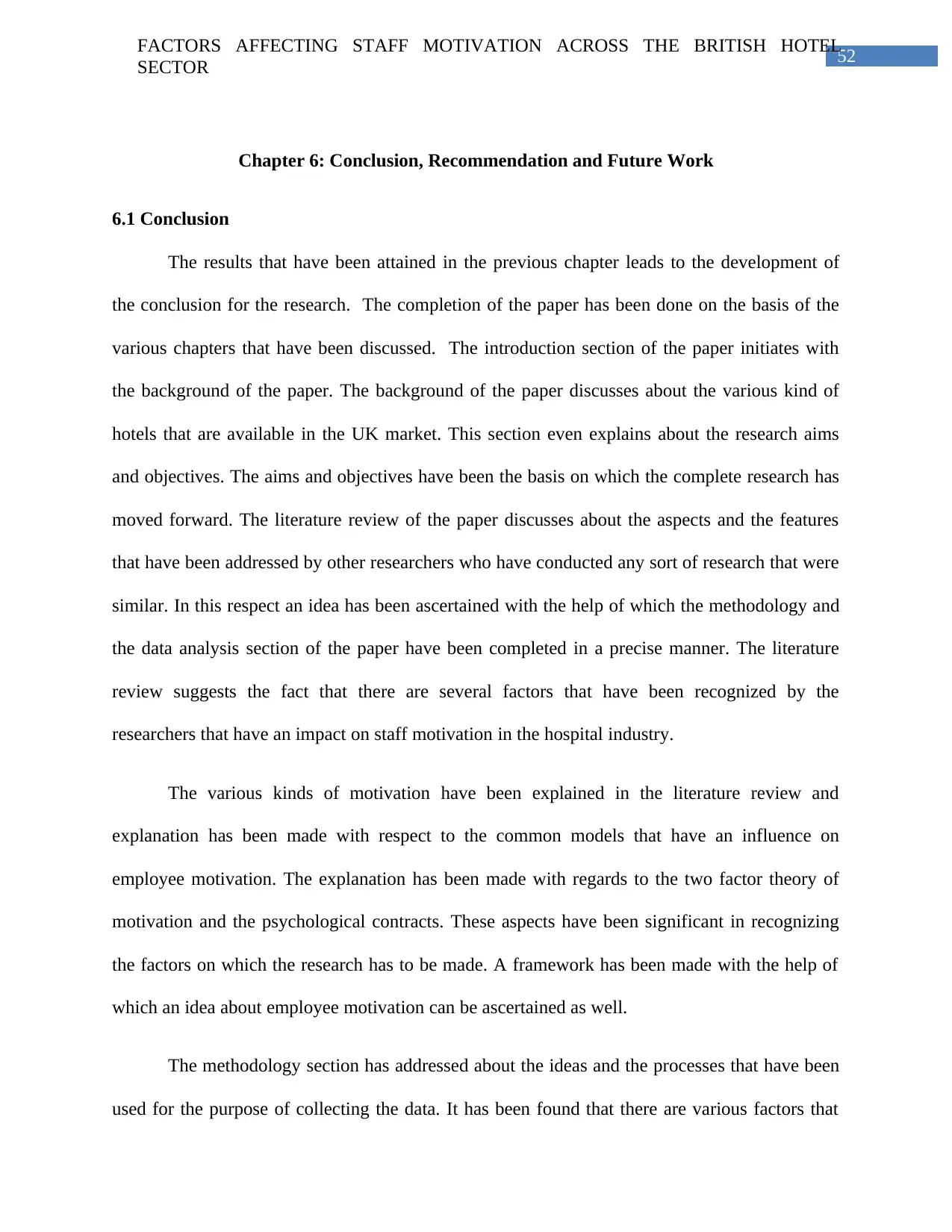
52
FACTORS AFFECTING STAFF MOTIVATION ACROSS THE BRITISH HOTEL
SECTOR
Chapter 6: Conclusion, Recommendation and Future Work
6.1 Conclusion
The results that have been attained in the previous chapter leads to the development of
the conclusion for the research. The completion of the paper has been done on the basis of the
various chapters that have been discussed. The introduction section of the paper initiates with
the background of the paper. The background of the paper discusses about the various kind of
hotels that are available in the UK market. This section even explains about the research aims
and objectives. The aims and objectives have been the basis on which the complete research has
moved forward. The literature review of the paper discusses about the aspects and the features
that have been addressed by other researchers who have conducted any sort of research that were
similar. In this respect an idea has been ascertained with the help of which the methodology and
the data analysis section of the paper have been completed in a precise manner. The literature
review suggests the fact that there are several factors that have been recognized by the
researchers that have an impact on staff motivation in the hospital industry.
The various kinds of motivation have been explained in the literature review and
explanation has been made with respect to the common models that have an influence on
employee motivation. The explanation has been made with regards to the two factor theory of
motivation and the psychological contracts. These aspects have been significant in recognizing
the factors on which the research has to be made. A framework has been made with the help of
which an idea about employee motivation can be ascertained as well.
The methodology section has addressed about the ideas and the processes that have been
used for the purpose of collecting the data. It has been found that there are various factors that
FACTORS AFFECTING STAFF MOTIVATION ACROSS THE BRITISH HOTEL
SECTOR
Chapter 6: Conclusion, Recommendation and Future Work
6.1 Conclusion
The results that have been attained in the previous chapter leads to the development of
the conclusion for the research. The completion of the paper has been done on the basis of the
various chapters that have been discussed. The introduction section of the paper initiates with
the background of the paper. The background of the paper discusses about the various kind of
hotels that are available in the UK market. This section even explains about the research aims
and objectives. The aims and objectives have been the basis on which the complete research has
moved forward. The literature review of the paper discusses about the aspects and the features
that have been addressed by other researchers who have conducted any sort of research that were
similar. In this respect an idea has been ascertained with the help of which the methodology and
the data analysis section of the paper have been completed in a precise manner. The literature
review suggests the fact that there are several factors that have been recognized by the
researchers that have an impact on staff motivation in the hospital industry.
The various kinds of motivation have been explained in the literature review and
explanation has been made with respect to the common models that have an influence on
employee motivation. The explanation has been made with regards to the two factor theory of
motivation and the psychological contracts. These aspects have been significant in recognizing
the factors on which the research has to be made. A framework has been made with the help of
which an idea about employee motivation can be ascertained as well.
The methodology section has addressed about the ideas and the processes that have been
used for the purpose of collecting the data. It has been found that there are various factors that
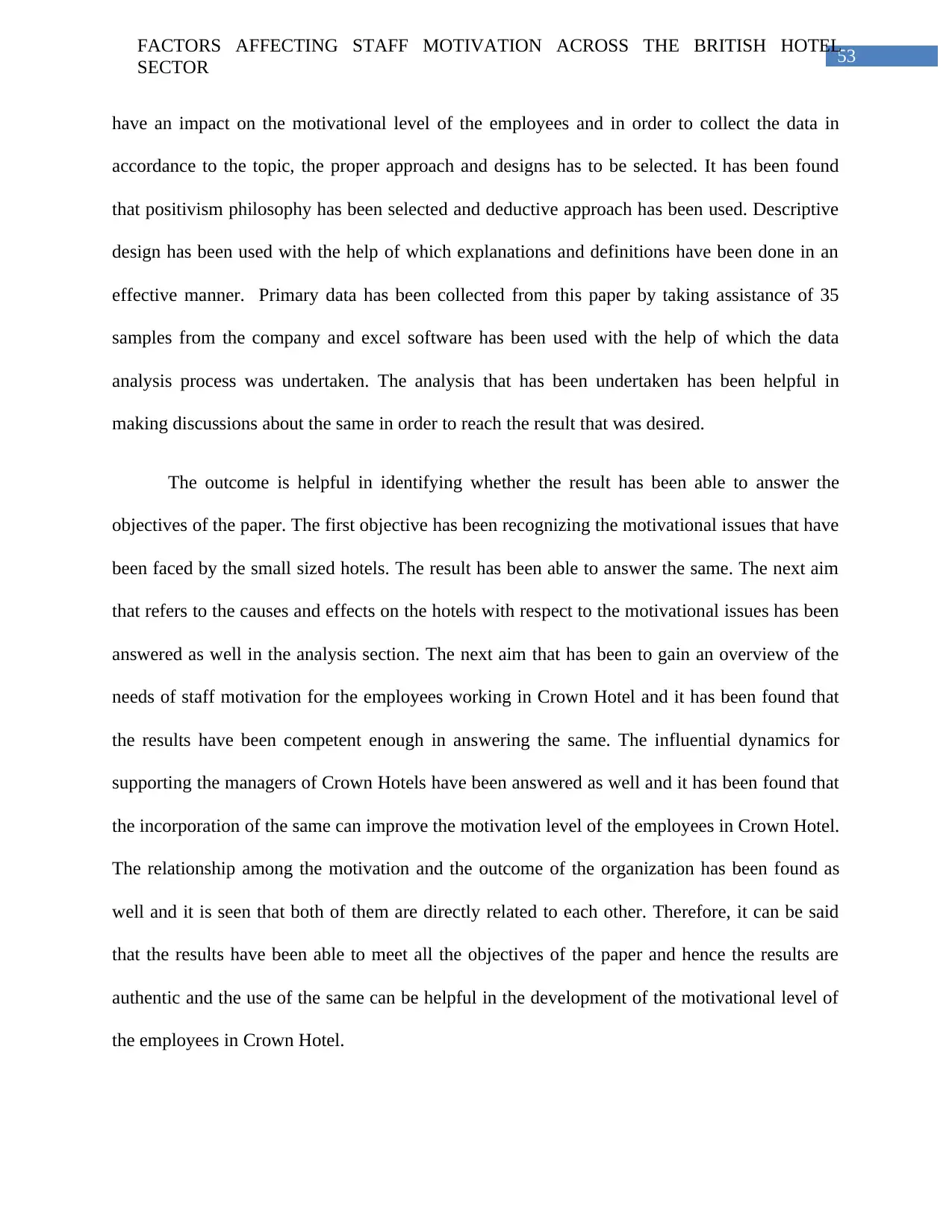
53
FACTORS AFFECTING STAFF MOTIVATION ACROSS THE BRITISH HOTEL
SECTOR
have an impact on the motivational level of the employees and in order to collect the data in
accordance to the topic, the proper approach and designs has to be selected. It has been found
that positivism philosophy has been selected and deductive approach has been used. Descriptive
design has been used with the help of which explanations and definitions have been done in an
effective manner. Primary data has been collected from this paper by taking assistance of 35
samples from the company and excel software has been used with the help of which the data
analysis process was undertaken. The analysis that has been undertaken has been helpful in
making discussions about the same in order to reach the result that was desired.
The outcome is helpful in identifying whether the result has been able to answer the
objectives of the paper. The first objective has been recognizing the motivational issues that have
been faced by the small sized hotels. The result has been able to answer the same. The next aim
that refers to the causes and effects on the hotels with respect to the motivational issues has been
answered as well in the analysis section. The next aim that has been to gain an overview of the
needs of staff motivation for the employees working in Crown Hotel and it has been found that
the results have been competent enough in answering the same. The influential dynamics for
supporting the managers of Crown Hotels have been answered as well and it has been found that
the incorporation of the same can improve the motivation level of the employees in Crown Hotel.
The relationship among the motivation and the outcome of the organization has been found as
well and it is seen that both of them are directly related to each other. Therefore, it can be said
that the results have been able to meet all the objectives of the paper and hence the results are
authentic and the use of the same can be helpful in the development of the motivational level of
the employees in Crown Hotel.
FACTORS AFFECTING STAFF MOTIVATION ACROSS THE BRITISH HOTEL
SECTOR
have an impact on the motivational level of the employees and in order to collect the data in
accordance to the topic, the proper approach and designs has to be selected. It has been found
that positivism philosophy has been selected and deductive approach has been used. Descriptive
design has been used with the help of which explanations and definitions have been done in an
effective manner. Primary data has been collected from this paper by taking assistance of 35
samples from the company and excel software has been used with the help of which the data
analysis process was undertaken. The analysis that has been undertaken has been helpful in
making discussions about the same in order to reach the result that was desired.
The outcome is helpful in identifying whether the result has been able to answer the
objectives of the paper. The first objective has been recognizing the motivational issues that have
been faced by the small sized hotels. The result has been able to answer the same. The next aim
that refers to the causes and effects on the hotels with respect to the motivational issues has been
answered as well in the analysis section. The next aim that has been to gain an overview of the
needs of staff motivation for the employees working in Crown Hotel and it has been found that
the results have been competent enough in answering the same. The influential dynamics for
supporting the managers of Crown Hotels have been answered as well and it has been found that
the incorporation of the same can improve the motivation level of the employees in Crown Hotel.
The relationship among the motivation and the outcome of the organization has been found as
well and it is seen that both of them are directly related to each other. Therefore, it can be said
that the results have been able to meet all the objectives of the paper and hence the results are
authentic and the use of the same can be helpful in the development of the motivational level of
the employees in Crown Hotel.
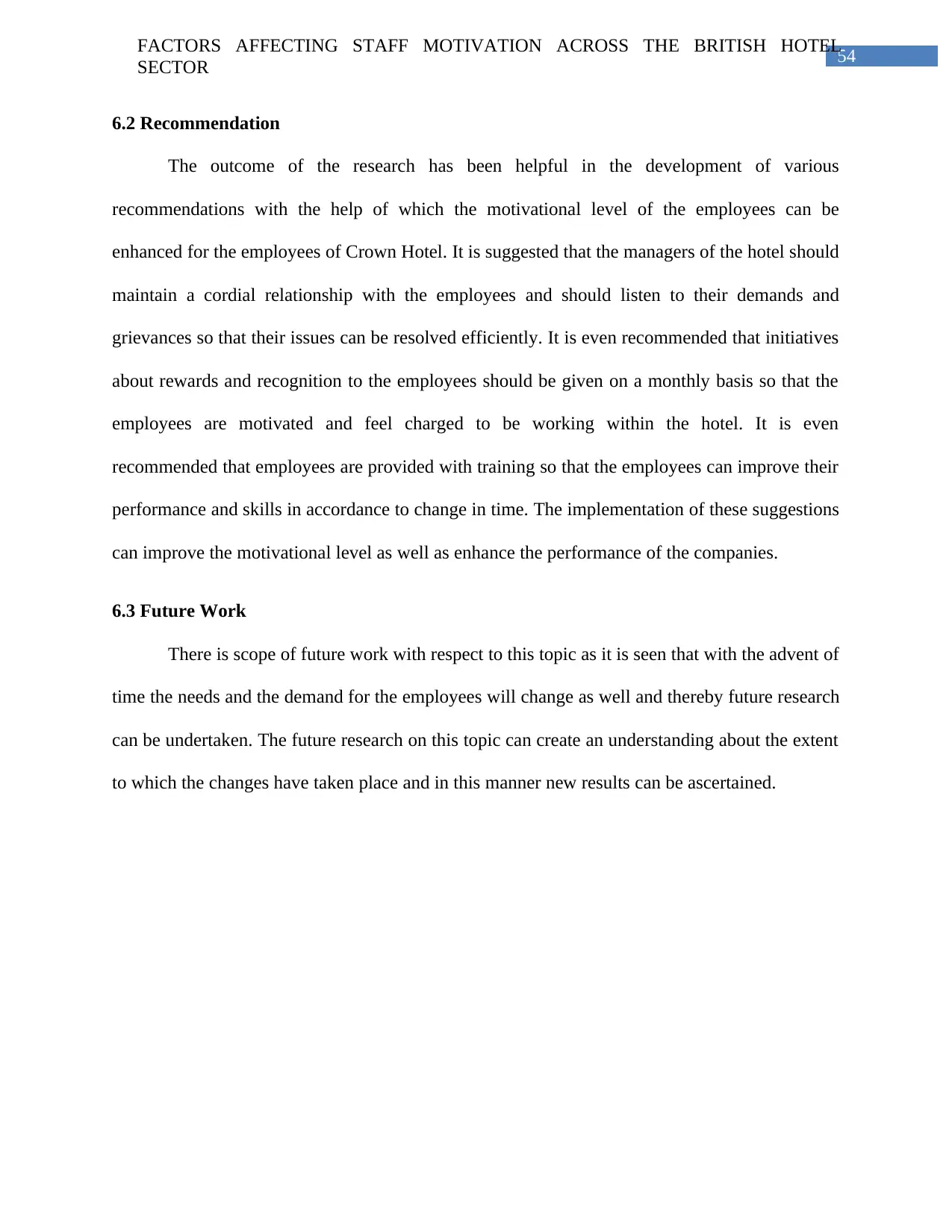
54
FACTORS AFFECTING STAFF MOTIVATION ACROSS THE BRITISH HOTEL
SECTOR
6.2 Recommendation
The outcome of the research has been helpful in the development of various
recommendations with the help of which the motivational level of the employees can be
enhanced for the employees of Crown Hotel. It is suggested that the managers of the hotel should
maintain a cordial relationship with the employees and should listen to their demands and
grievances so that their issues can be resolved efficiently. It is even recommended that initiatives
about rewards and recognition to the employees should be given on a monthly basis so that the
employees are motivated and feel charged to be working within the hotel. It is even
recommended that employees are provided with training so that the employees can improve their
performance and skills in accordance to change in time. The implementation of these suggestions
can improve the motivational level as well as enhance the performance of the companies.
6.3 Future Work
There is scope of future work with respect to this topic as it is seen that with the advent of
time the needs and the demand for the employees will change as well and thereby future research
can be undertaken. The future research on this topic can create an understanding about the extent
to which the changes have taken place and in this manner new results can be ascertained.
FACTORS AFFECTING STAFF MOTIVATION ACROSS THE BRITISH HOTEL
SECTOR
6.2 Recommendation
The outcome of the research has been helpful in the development of various
recommendations with the help of which the motivational level of the employees can be
enhanced for the employees of Crown Hotel. It is suggested that the managers of the hotel should
maintain a cordial relationship with the employees and should listen to their demands and
grievances so that their issues can be resolved efficiently. It is even recommended that initiatives
about rewards and recognition to the employees should be given on a monthly basis so that the
employees are motivated and feel charged to be working within the hotel. It is even
recommended that employees are provided with training so that the employees can improve their
performance and skills in accordance to change in time. The implementation of these suggestions
can improve the motivational level as well as enhance the performance of the companies.
6.3 Future Work
There is scope of future work with respect to this topic as it is seen that with the advent of
time the needs and the demand for the employees will change as well and thereby future research
can be undertaken. The future research on this topic can create an understanding about the extent
to which the changes have taken place and in this manner new results can be ascertained.
Paraphrase This Document
Need a fresh take? Get an instant paraphrase of this document with our AI Paraphraser
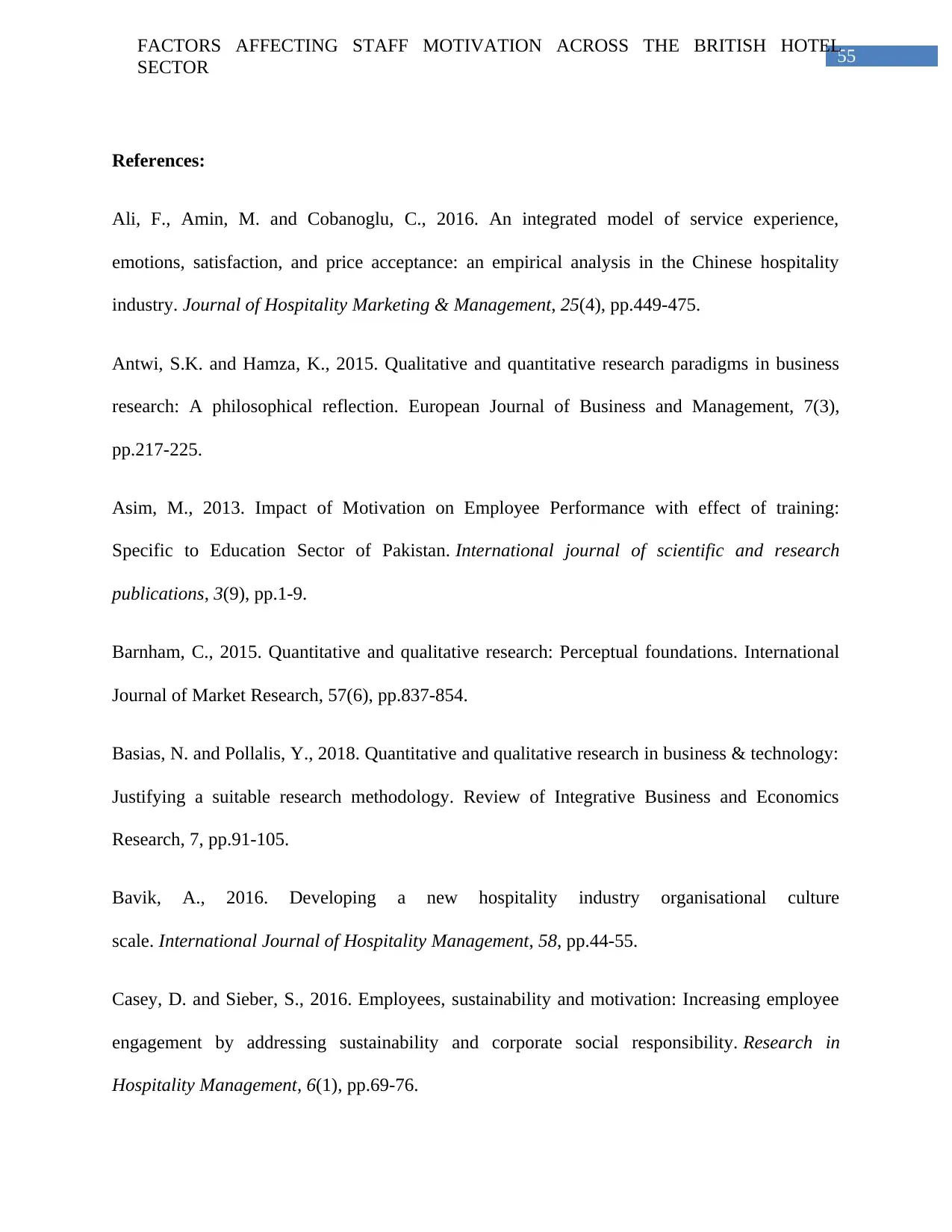
55
FACTORS AFFECTING STAFF MOTIVATION ACROSS THE BRITISH HOTEL
SECTOR
References:
Ali, F., Amin, M. and Cobanoglu, C., 2016. An integrated model of service experience,
emotions, satisfaction, and price acceptance: an empirical analysis in the Chinese hospitality
industry. Journal of Hospitality Marketing & Management, 25(4), pp.449-475.
Antwi, S.K. and Hamza, K., 2015. Qualitative and quantitative research paradigms in business
research: A philosophical reflection. European Journal of Business and Management, 7(3),
pp.217-225.
Asim, M., 2013. Impact of Motivation on Employee Performance with effect of training:
Specific to Education Sector of Pakistan. International journal of scientific and research
publications, 3(9), pp.1-9.
Barnham, C., 2015. Quantitative and qualitative research: Perceptual foundations. International
Journal of Market Research, 57(6), pp.837-854.
Basias, N. and Pollalis, Y., 2018. Quantitative and qualitative research in business & technology:
Justifying a suitable research methodology. Review of Integrative Business and Economics
Research, 7, pp.91-105.
Bavik, A., 2016. Developing a new hospitality industry organisational culture
scale. International Journal of Hospitality Management, 58, pp.44-55.
Casey, D. and Sieber, S., 2016. Employees, sustainability and motivation: Increasing employee
engagement by addressing sustainability and corporate social responsibility. Research in
Hospitality Management, 6(1), pp.69-76.
FACTORS AFFECTING STAFF MOTIVATION ACROSS THE BRITISH HOTEL
SECTOR
References:
Ali, F., Amin, M. and Cobanoglu, C., 2016. An integrated model of service experience,
emotions, satisfaction, and price acceptance: an empirical analysis in the Chinese hospitality
industry. Journal of Hospitality Marketing & Management, 25(4), pp.449-475.
Antwi, S.K. and Hamza, K., 2015. Qualitative and quantitative research paradigms in business
research: A philosophical reflection. European Journal of Business and Management, 7(3),
pp.217-225.
Asim, M., 2013. Impact of Motivation on Employee Performance with effect of training:
Specific to Education Sector of Pakistan. International journal of scientific and research
publications, 3(9), pp.1-9.
Barnham, C., 2015. Quantitative and qualitative research: Perceptual foundations. International
Journal of Market Research, 57(6), pp.837-854.
Basias, N. and Pollalis, Y., 2018. Quantitative and qualitative research in business & technology:
Justifying a suitable research methodology. Review of Integrative Business and Economics
Research, 7, pp.91-105.
Bavik, A., 2016. Developing a new hospitality industry organisational culture
scale. International Journal of Hospitality Management, 58, pp.44-55.
Casey, D. and Sieber, S., 2016. Employees, sustainability and motivation: Increasing employee
engagement by addressing sustainability and corporate social responsibility. Research in
Hospitality Management, 6(1), pp.69-76.
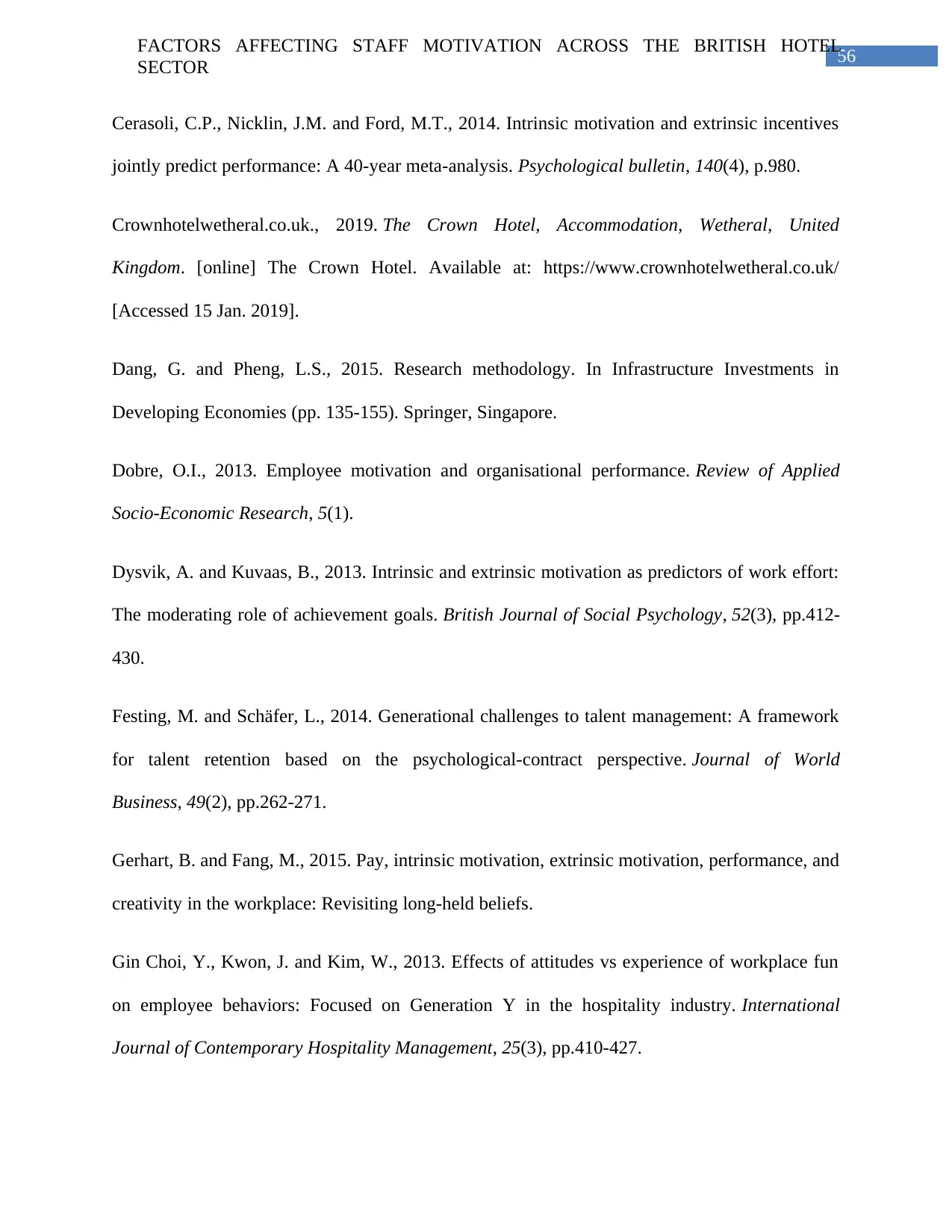
56
FACTORS AFFECTING STAFF MOTIVATION ACROSS THE BRITISH HOTEL
SECTOR
Cerasoli, C.P., Nicklin, J.M. and Ford, M.T., 2014. Intrinsic motivation and extrinsic incentives
jointly predict performance: A 40-year meta-analysis. Psychological bulletin, 140(4), p.980.
Crownhotelwetheral.co.uk., 2019. The Crown Hotel, Accommodation, Wetheral, United
Kingdom. [online] The Crown Hotel. Available at: https://www.crownhotelwetheral.co.uk/
[Accessed 15 Jan. 2019].
Dang, G. and Pheng, L.S., 2015. Research methodology. In Infrastructure Investments in
Developing Economies (pp. 135-155). Springer, Singapore.
Dobre, O.I., 2013. Employee motivation and organisational performance. Review of Applied
Socio-Economic Research, 5(1).
Dysvik, A. and Kuvaas, B., 2013. Intrinsic and extrinsic motivation as predictors of work effort:
The moderating role of achievement goals. British Journal of Social Psychology, 52(3), pp.412-
430.
Festing, M. and Schäfer, L., 2014. Generational challenges to talent management: A framework
for talent retention based on the psychological-contract perspective. Journal of World
Business, 49(2), pp.262-271.
Gerhart, B. and Fang, M., 2015. Pay, intrinsic motivation, extrinsic motivation, performance, and
creativity in the workplace: Revisiting long-held beliefs.
Gin Choi, Y., Kwon, J. and Kim, W., 2013. Effects of attitudes vs experience of workplace fun
on employee behaviors: Focused on Generation Y in the hospitality industry. International
Journal of Contemporary Hospitality Management, 25(3), pp.410-427.
FACTORS AFFECTING STAFF MOTIVATION ACROSS THE BRITISH HOTEL
SECTOR
Cerasoli, C.P., Nicklin, J.M. and Ford, M.T., 2014. Intrinsic motivation and extrinsic incentives
jointly predict performance: A 40-year meta-analysis. Psychological bulletin, 140(4), p.980.
Crownhotelwetheral.co.uk., 2019. The Crown Hotel, Accommodation, Wetheral, United
Kingdom. [online] The Crown Hotel. Available at: https://www.crownhotelwetheral.co.uk/
[Accessed 15 Jan. 2019].
Dang, G. and Pheng, L.S., 2015. Research methodology. In Infrastructure Investments in
Developing Economies (pp. 135-155). Springer, Singapore.
Dobre, O.I., 2013. Employee motivation and organisational performance. Review of Applied
Socio-Economic Research, 5(1).
Dysvik, A. and Kuvaas, B., 2013. Intrinsic and extrinsic motivation as predictors of work effort:
The moderating role of achievement goals. British Journal of Social Psychology, 52(3), pp.412-
430.
Festing, M. and Schäfer, L., 2014. Generational challenges to talent management: A framework
for talent retention based on the psychological-contract perspective. Journal of World
Business, 49(2), pp.262-271.
Gerhart, B. and Fang, M., 2015. Pay, intrinsic motivation, extrinsic motivation, performance, and
creativity in the workplace: Revisiting long-held beliefs.
Gin Choi, Y., Kwon, J. and Kim, W., 2013. Effects of attitudes vs experience of workplace fun
on employee behaviors: Focused on Generation Y in the hospitality industry. International
Journal of Contemporary Hospitality Management, 25(3), pp.410-427.
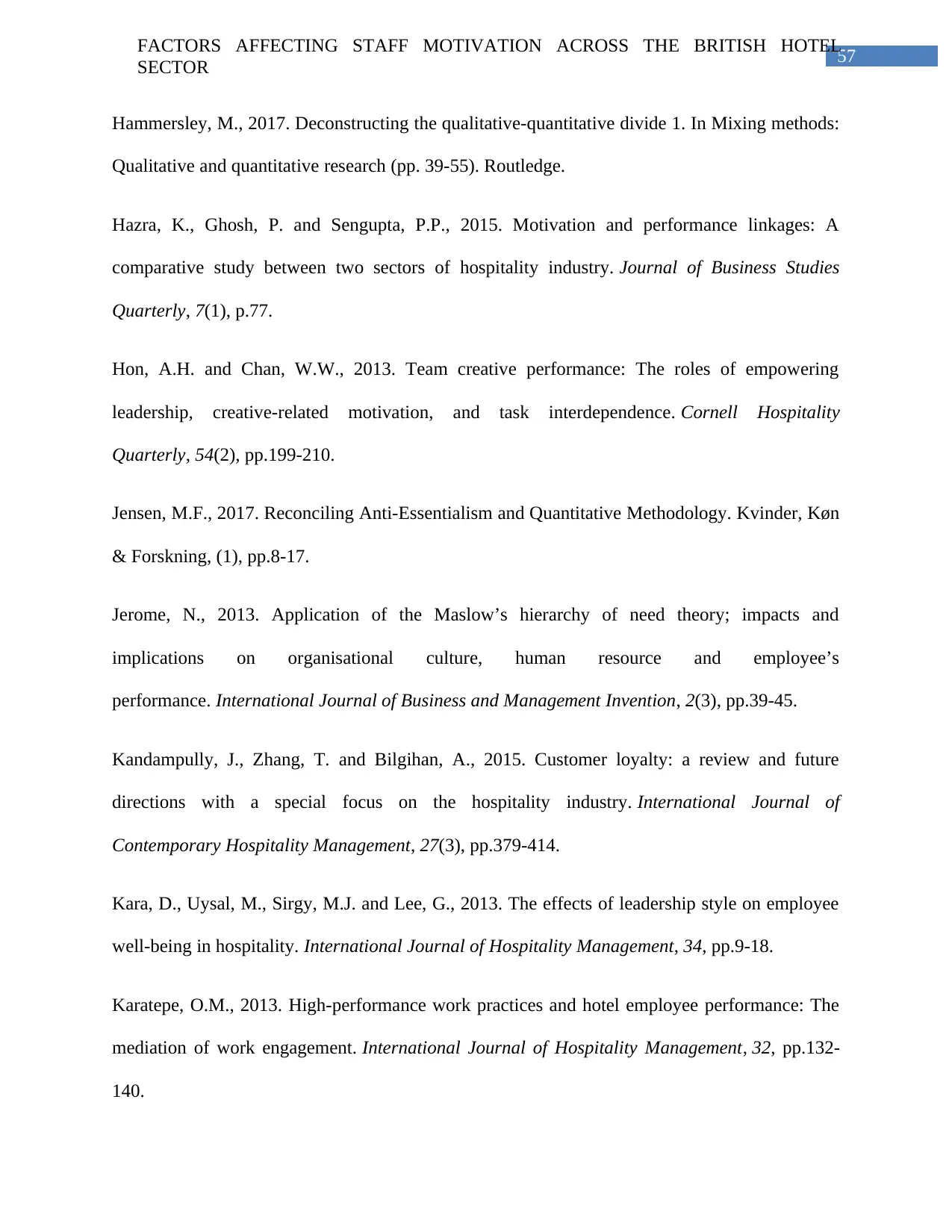
57
FACTORS AFFECTING STAFF MOTIVATION ACROSS THE BRITISH HOTEL
SECTOR
Hammersley, M., 2017. Deconstructing the qualitative-quantitative divide 1. In Mixing methods:
Qualitative and quantitative research (pp. 39-55). Routledge.
Hazra, K., Ghosh, P. and Sengupta, P.P., 2015. Motivation and performance linkages: A
comparative study between two sectors of hospitality industry. Journal of Business Studies
Quarterly, 7(1), p.77.
Hon, A.H. and Chan, W.W., 2013. Team creative performance: The roles of empowering
leadership, creative-related motivation, and task interdependence. Cornell Hospitality
Quarterly, 54(2), pp.199-210.
Jensen, M.F., 2017. Reconciling Anti-Essentialism and Quantitative Methodology. Kvinder, Køn
& Forskning, (1), pp.8-17.
Jerome, N., 2013. Application of the Maslow’s hierarchy of need theory; impacts and
implications on organisational culture, human resource and employee’s
performance. International Journal of Business and Management Invention, 2(3), pp.39-45.
Kandampully, J., Zhang, T. and Bilgihan, A., 2015. Customer loyalty: a review and future
directions with a special focus on the hospitality industry. International Journal of
Contemporary Hospitality Management, 27(3), pp.379-414.
Kara, D., Uysal, M., Sirgy, M.J. and Lee, G., 2013. The effects of leadership style on employee
well-being in hospitality. International Journal of Hospitality Management, 34, pp.9-18.
Karatepe, O.M., 2013. High-performance work practices and hotel employee performance: The
mediation of work engagement. International Journal of Hospitality Management, 32, pp.132-
140.
FACTORS AFFECTING STAFF MOTIVATION ACROSS THE BRITISH HOTEL
SECTOR
Hammersley, M., 2017. Deconstructing the qualitative-quantitative divide 1. In Mixing methods:
Qualitative and quantitative research (pp. 39-55). Routledge.
Hazra, K., Ghosh, P. and Sengupta, P.P., 2015. Motivation and performance linkages: A
comparative study between two sectors of hospitality industry. Journal of Business Studies
Quarterly, 7(1), p.77.
Hon, A.H. and Chan, W.W., 2013. Team creative performance: The roles of empowering
leadership, creative-related motivation, and task interdependence. Cornell Hospitality
Quarterly, 54(2), pp.199-210.
Jensen, M.F., 2017. Reconciling Anti-Essentialism and Quantitative Methodology. Kvinder, Køn
& Forskning, (1), pp.8-17.
Jerome, N., 2013. Application of the Maslow’s hierarchy of need theory; impacts and
implications on organisational culture, human resource and employee’s
performance. International Journal of Business and Management Invention, 2(3), pp.39-45.
Kandampully, J., Zhang, T. and Bilgihan, A., 2015. Customer loyalty: a review and future
directions with a special focus on the hospitality industry. International Journal of
Contemporary Hospitality Management, 27(3), pp.379-414.
Kara, D., Uysal, M., Sirgy, M.J. and Lee, G., 2013. The effects of leadership style on employee
well-being in hospitality. International Journal of Hospitality Management, 34, pp.9-18.
Karatepe, O.M., 2013. High-performance work practices and hotel employee performance: The
mediation of work engagement. International Journal of Hospitality Management, 32, pp.132-
140.
Secure Best Marks with AI Grader
Need help grading? Try our AI Grader for instant feedback on your assignments.
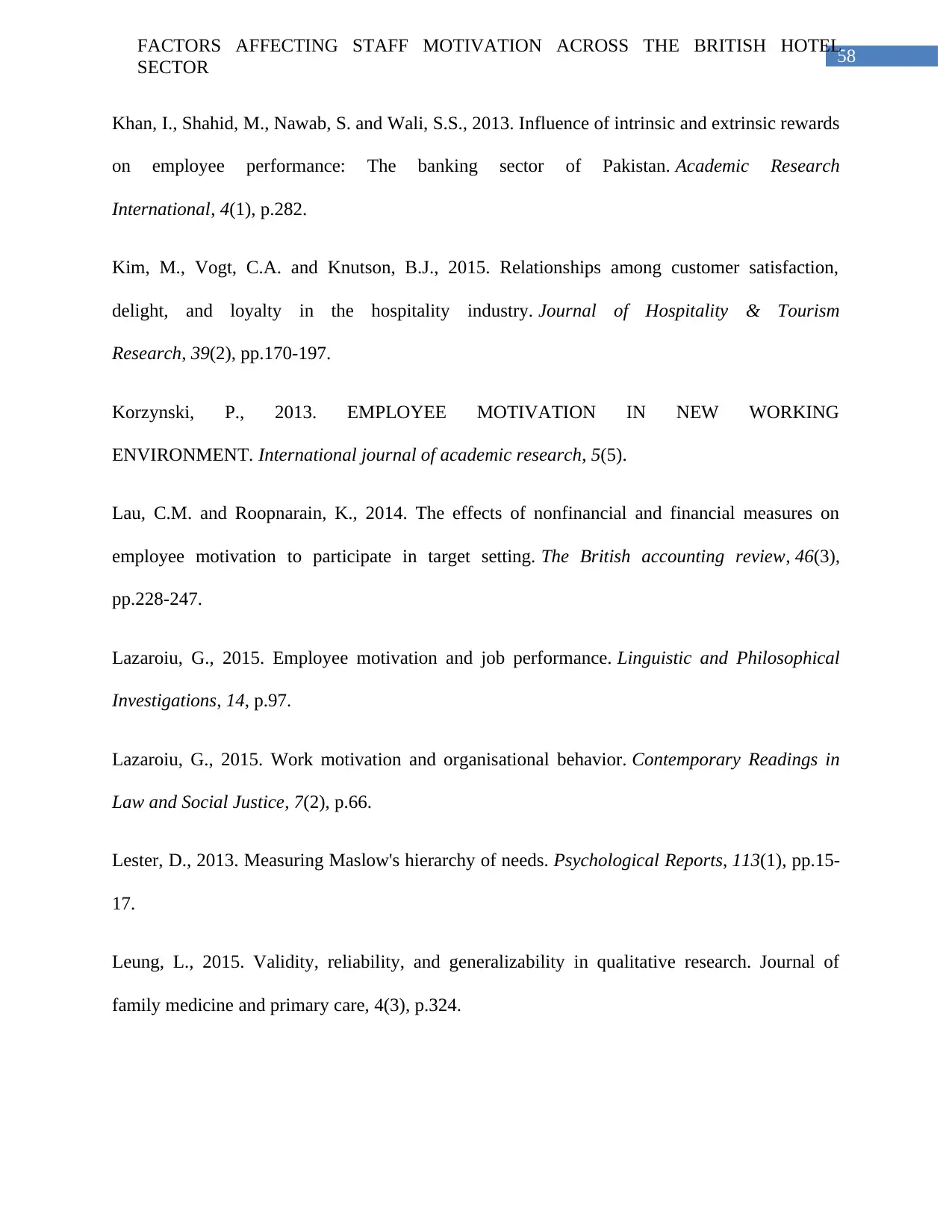
58
FACTORS AFFECTING STAFF MOTIVATION ACROSS THE BRITISH HOTEL
SECTOR
Khan, I., Shahid, M., Nawab, S. and Wali, S.S., 2013. Influence of intrinsic and extrinsic rewards
on employee performance: The banking sector of Pakistan. Academic Research
International, 4(1), p.282.
Kim, M., Vogt, C.A. and Knutson, B.J., 2015. Relationships among customer satisfaction,
delight, and loyalty in the hospitality industry. Journal of Hospitality & Tourism
Research, 39(2), pp.170-197.
Korzynski, P., 2013. EMPLOYEE MOTIVATION IN NEW WORKING
ENVIRONMENT. International journal of academic research, 5(5).
Lau, C.M. and Roopnarain, K., 2014. The effects of nonfinancial and financial measures on
employee motivation to participate in target setting. The British accounting review, 46(3),
pp.228-247.
Lazaroiu, G., 2015. Employee motivation and job performance. Linguistic and Philosophical
Investigations, 14, p.97.
Lazaroiu, G., 2015. Work motivation and organisational behavior. Contemporary Readings in
Law and Social Justice, 7(2), p.66.
Lester, D., 2013. Measuring Maslow's hierarchy of needs. Psychological Reports, 113(1), pp.15-
17.
Leung, L., 2015. Validity, reliability, and generalizability in qualitative research. Journal of
family medicine and primary care, 4(3), p.324.
FACTORS AFFECTING STAFF MOTIVATION ACROSS THE BRITISH HOTEL
SECTOR
Khan, I., Shahid, M., Nawab, S. and Wali, S.S., 2013. Influence of intrinsic and extrinsic rewards
on employee performance: The banking sector of Pakistan. Academic Research
International, 4(1), p.282.
Kim, M., Vogt, C.A. and Knutson, B.J., 2015. Relationships among customer satisfaction,
delight, and loyalty in the hospitality industry. Journal of Hospitality & Tourism
Research, 39(2), pp.170-197.
Korzynski, P., 2013. EMPLOYEE MOTIVATION IN NEW WORKING
ENVIRONMENT. International journal of academic research, 5(5).
Lau, C.M. and Roopnarain, K., 2014. The effects of nonfinancial and financial measures on
employee motivation to participate in target setting. The British accounting review, 46(3),
pp.228-247.
Lazaroiu, G., 2015. Employee motivation and job performance. Linguistic and Philosophical
Investigations, 14, p.97.
Lazaroiu, G., 2015. Work motivation and organisational behavior. Contemporary Readings in
Law and Social Justice, 7(2), p.66.
Lester, D., 2013. Measuring Maslow's hierarchy of needs. Psychological Reports, 113(1), pp.15-
17.
Leung, L., 2015. Validity, reliability, and generalizability in qualitative research. Journal of
family medicine and primary care, 4(3), p.324.
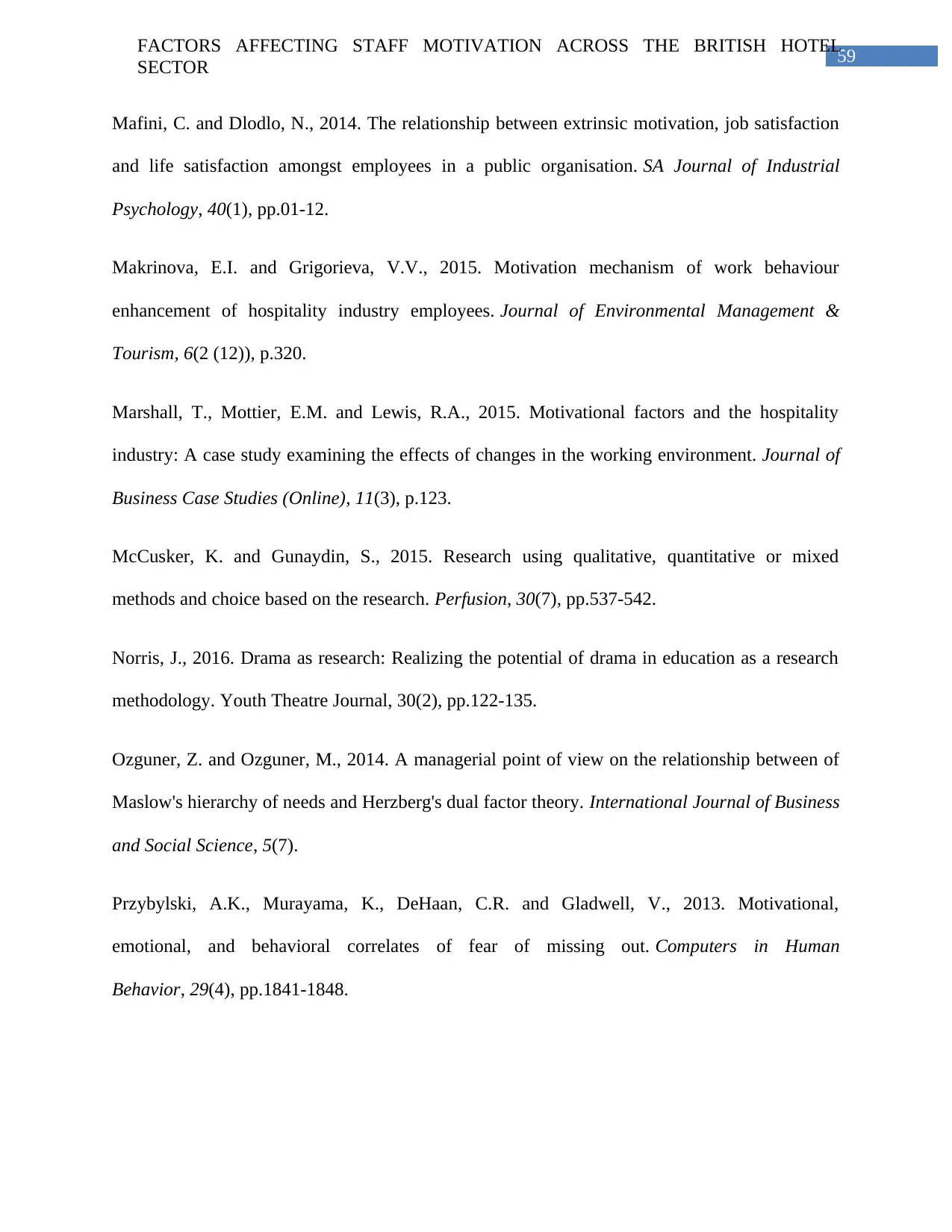
59
FACTORS AFFECTING STAFF MOTIVATION ACROSS THE BRITISH HOTEL
SECTOR
Mafini, C. and Dlodlo, N., 2014. The relationship between extrinsic motivation, job satisfaction
and life satisfaction amongst employees in a public organisation. SA Journal of Industrial
Psychology, 40(1), pp.01-12.
Makrinova, E.I. and Grigorieva, V.V., 2015. Motivation mechanism of work behaviour
enhancement of hospitality industry employees. Journal of Environmental Management &
Tourism, 6(2 (12)), p.320.
Marshall, T., Mottier, E.M. and Lewis, R.A., 2015. Motivational factors and the hospitality
industry: A case study examining the effects of changes in the working environment. Journal of
Business Case Studies (Online), 11(3), p.123.
McCusker, K. and Gunaydin, S., 2015. Research using qualitative, quantitative or mixed
methods and choice based on the research. Perfusion, 30(7), pp.537-542.
Norris, J., 2016. Drama as research: Realizing the potential of drama in education as a research
methodology. Youth Theatre Journal, 30(2), pp.122-135.
Ozguner, Z. and Ozguner, M., 2014. A managerial point of view on the relationship between of
Maslow's hierarchy of needs and Herzberg's dual factor theory. International Journal of Business
and Social Science, 5(7).
Przybylski, A.K., Murayama, K., DeHaan, C.R. and Gladwell, V., 2013. Motivational,
emotional, and behavioral correlates of fear of missing out. Computers in Human
Behavior, 29(4), pp.1841-1848.
FACTORS AFFECTING STAFF MOTIVATION ACROSS THE BRITISH HOTEL
SECTOR
Mafini, C. and Dlodlo, N., 2014. The relationship between extrinsic motivation, job satisfaction
and life satisfaction amongst employees in a public organisation. SA Journal of Industrial
Psychology, 40(1), pp.01-12.
Makrinova, E.I. and Grigorieva, V.V., 2015. Motivation mechanism of work behaviour
enhancement of hospitality industry employees. Journal of Environmental Management &
Tourism, 6(2 (12)), p.320.
Marshall, T., Mottier, E.M. and Lewis, R.A., 2015. Motivational factors and the hospitality
industry: A case study examining the effects of changes in the working environment. Journal of
Business Case Studies (Online), 11(3), p.123.
McCusker, K. and Gunaydin, S., 2015. Research using qualitative, quantitative or mixed
methods and choice based on the research. Perfusion, 30(7), pp.537-542.
Norris, J., 2016. Drama as research: Realizing the potential of drama in education as a research
methodology. Youth Theatre Journal, 30(2), pp.122-135.
Ozguner, Z. and Ozguner, M., 2014. A managerial point of view on the relationship between of
Maslow's hierarchy of needs and Herzberg's dual factor theory. International Journal of Business
and Social Science, 5(7).
Przybylski, A.K., Murayama, K., DeHaan, C.R. and Gladwell, V., 2013. Motivational,
emotional, and behavioral correlates of fear of missing out. Computers in Human
Behavior, 29(4), pp.1841-1848.
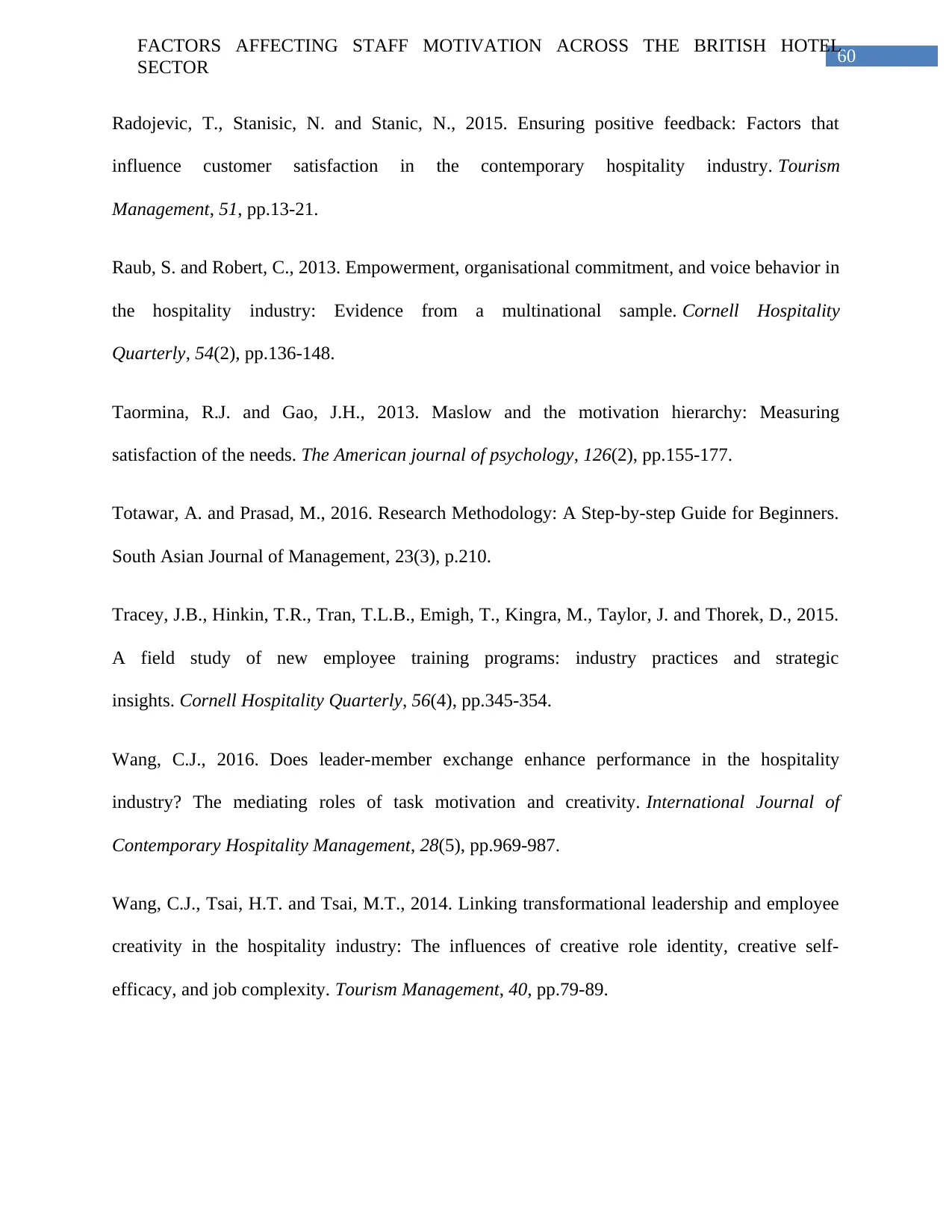
60
FACTORS AFFECTING STAFF MOTIVATION ACROSS THE BRITISH HOTEL
SECTOR
Radojevic, T., Stanisic, N. and Stanic, N., 2015. Ensuring positive feedback: Factors that
influence customer satisfaction in the contemporary hospitality industry. Tourism
Management, 51, pp.13-21.
Raub, S. and Robert, C., 2013. Empowerment, organisational commitment, and voice behavior in
the hospitality industry: Evidence from a multinational sample. Cornell Hospitality
Quarterly, 54(2), pp.136-148.
Taormina, R.J. and Gao, J.H., 2013. Maslow and the motivation hierarchy: Measuring
satisfaction of the needs. The American journal of psychology, 126(2), pp.155-177.
Totawar, A. and Prasad, M., 2016. Research Methodology: A Step-by-step Guide for Beginners.
South Asian Journal of Management, 23(3), p.210.
Tracey, J.B., Hinkin, T.R., Tran, T.L.B., Emigh, T., Kingra, M., Taylor, J. and Thorek, D., 2015.
A field study of new employee training programs: industry practices and strategic
insights. Cornell Hospitality Quarterly, 56(4), pp.345-354.
Wang, C.J., 2016. Does leader-member exchange enhance performance in the hospitality
industry? The mediating roles of task motivation and creativity. International Journal of
Contemporary Hospitality Management, 28(5), pp.969-987.
Wang, C.J., Tsai, H.T. and Tsai, M.T., 2014. Linking transformational leadership and employee
creativity in the hospitality industry: The influences of creative role identity, creative self-
efficacy, and job complexity. Tourism Management, 40, pp.79-89.
FACTORS AFFECTING STAFF MOTIVATION ACROSS THE BRITISH HOTEL
SECTOR
Radojevic, T., Stanisic, N. and Stanic, N., 2015. Ensuring positive feedback: Factors that
influence customer satisfaction in the contemporary hospitality industry. Tourism
Management, 51, pp.13-21.
Raub, S. and Robert, C., 2013. Empowerment, organisational commitment, and voice behavior in
the hospitality industry: Evidence from a multinational sample. Cornell Hospitality
Quarterly, 54(2), pp.136-148.
Taormina, R.J. and Gao, J.H., 2013. Maslow and the motivation hierarchy: Measuring
satisfaction of the needs. The American journal of psychology, 126(2), pp.155-177.
Totawar, A. and Prasad, M., 2016. Research Methodology: A Step-by-step Guide for Beginners.
South Asian Journal of Management, 23(3), p.210.
Tracey, J.B., Hinkin, T.R., Tran, T.L.B., Emigh, T., Kingra, M., Taylor, J. and Thorek, D., 2015.
A field study of new employee training programs: industry practices and strategic
insights. Cornell Hospitality Quarterly, 56(4), pp.345-354.
Wang, C.J., 2016. Does leader-member exchange enhance performance in the hospitality
industry? The mediating roles of task motivation and creativity. International Journal of
Contemporary Hospitality Management, 28(5), pp.969-987.
Wang, C.J., Tsai, H.T. and Tsai, M.T., 2014. Linking transformational leadership and employee
creativity in the hospitality industry: The influences of creative role identity, creative self-
efficacy, and job complexity. Tourism Management, 40, pp.79-89.
Paraphrase This Document
Need a fresh take? Get an instant paraphrase of this document with our AI Paraphraser
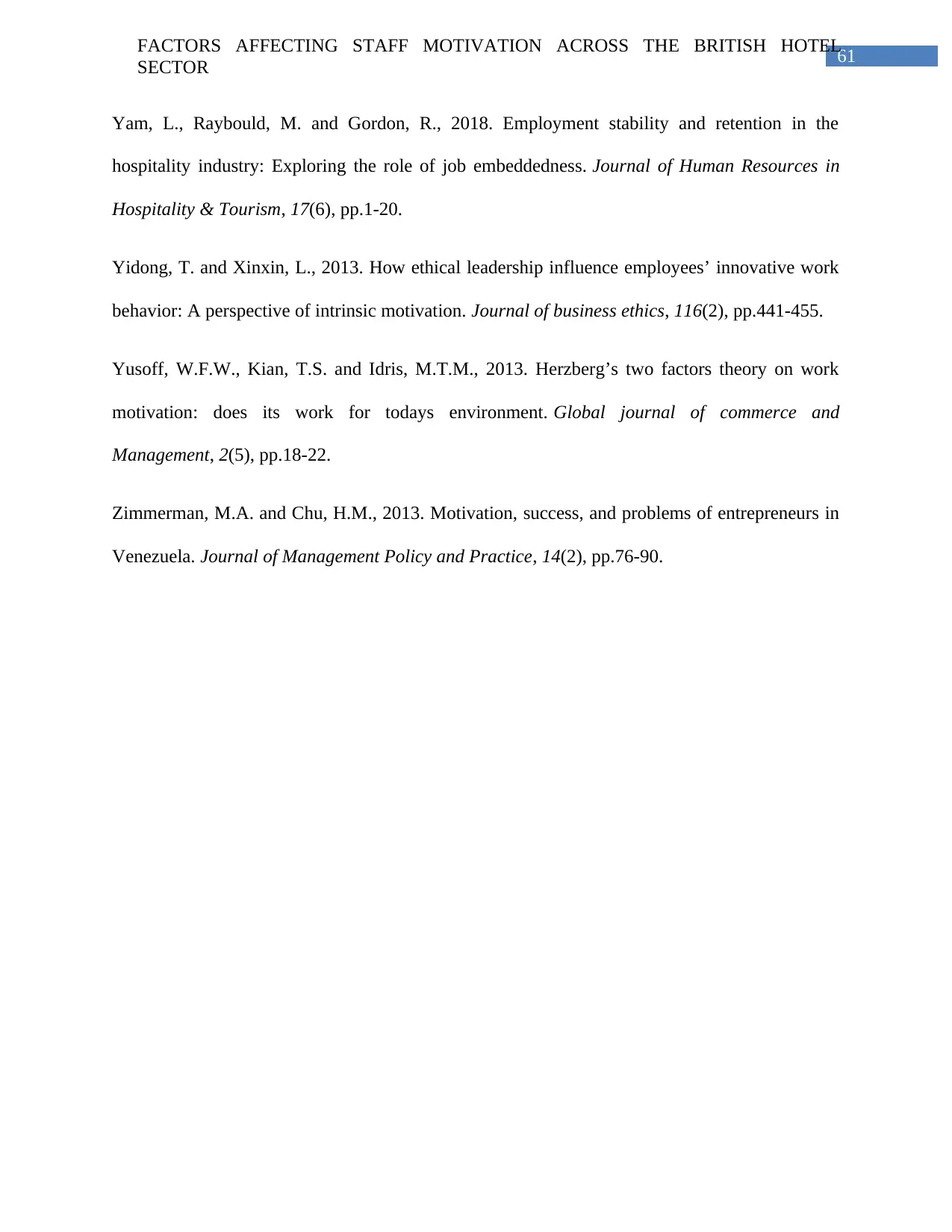
61
FACTORS AFFECTING STAFF MOTIVATION ACROSS THE BRITISH HOTEL
SECTOR
Yam, L., Raybould, M. and Gordon, R., 2018. Employment stability and retention in the
hospitality industry: Exploring the role of job embeddedness. Journal of Human Resources in
Hospitality & Tourism, 17(6), pp.1-20.
Yidong, T. and Xinxin, L., 2013. How ethical leadership influence employees’ innovative work
behavior: A perspective of intrinsic motivation. Journal of business ethics, 116(2), pp.441-455.
Yusoff, W.F.W., Kian, T.S. and Idris, M.T.M., 2013. Herzberg’s two factors theory on work
motivation: does its work for todays environment. Global journal of commerce and
Management, 2(5), pp.18-22.
Zimmerman, M.A. and Chu, H.M., 2013. Motivation, success, and problems of entrepreneurs in
Venezuela. Journal of Management Policy and Practice, 14(2), pp.76-90.
FACTORS AFFECTING STAFF MOTIVATION ACROSS THE BRITISH HOTEL
SECTOR
Yam, L., Raybould, M. and Gordon, R., 2018. Employment stability and retention in the
hospitality industry: Exploring the role of job embeddedness. Journal of Human Resources in
Hospitality & Tourism, 17(6), pp.1-20.
Yidong, T. and Xinxin, L., 2013. How ethical leadership influence employees’ innovative work
behavior: A perspective of intrinsic motivation. Journal of business ethics, 116(2), pp.441-455.
Yusoff, W.F.W., Kian, T.S. and Idris, M.T.M., 2013. Herzberg’s two factors theory on work
motivation: does its work for todays environment. Global journal of commerce and
Management, 2(5), pp.18-22.
Zimmerman, M.A. and Chu, H.M., 2013. Motivation, success, and problems of entrepreneurs in
Venezuela. Journal of Management Policy and Practice, 14(2), pp.76-90.
1 out of 62
Related Documents
Your All-in-One AI-Powered Toolkit for Academic Success.
+13062052269
info@desklib.com
Available 24*7 on WhatsApp / Email
![[object Object]](/_next/static/media/star-bottom.7253800d.svg)
Unlock your academic potential
© 2024 | Zucol Services PVT LTD | All rights reserved.





